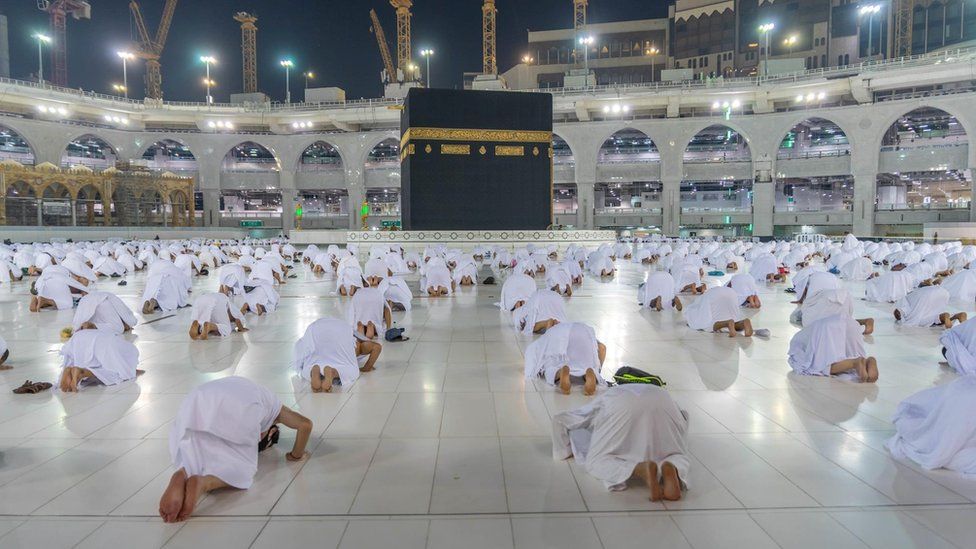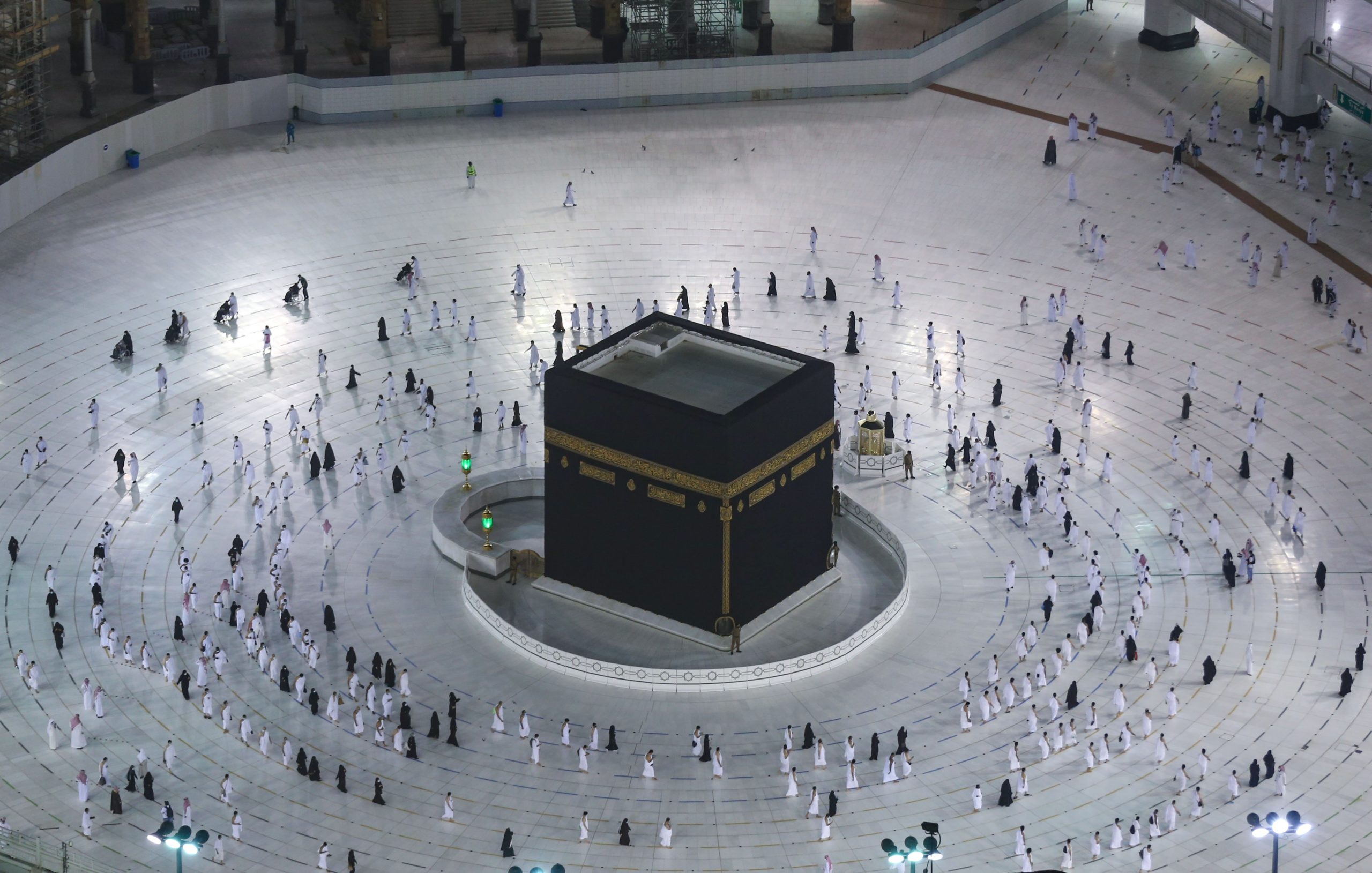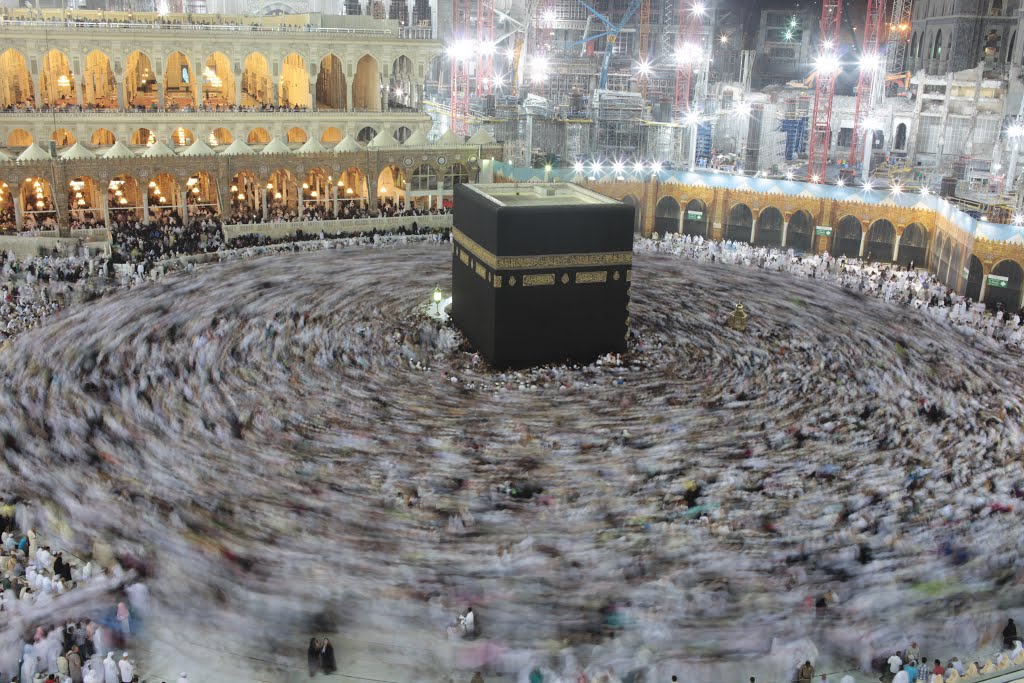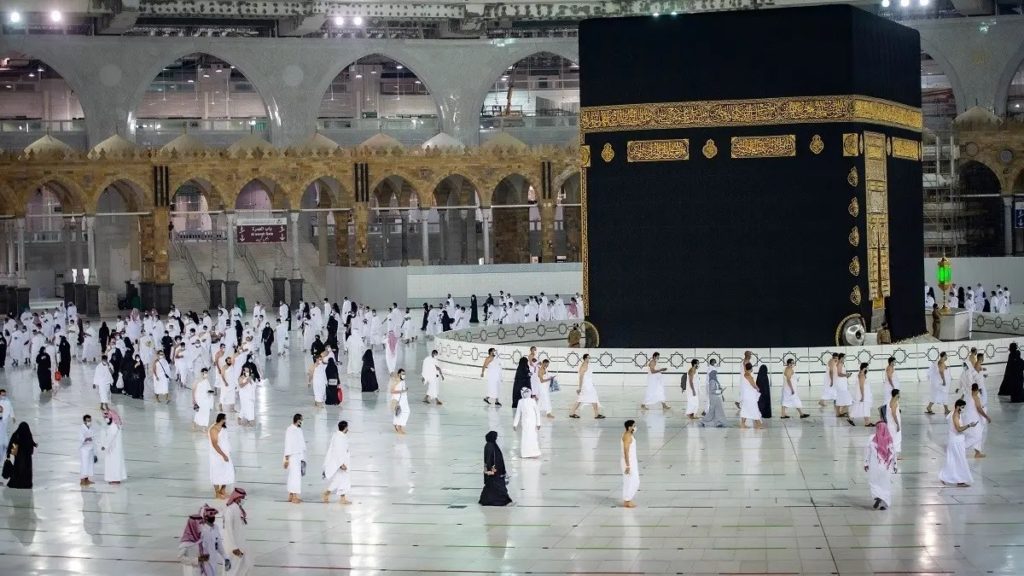بسم الله الرحمن الرحيم
Assalamu Alaikum.
(Here are Parts 1, 2, 3, 4, 5 and 6.)
So, today is the first day of Hajj 2022. This year, people who reside outside Saudi Arabia will be able to perform Hajj for the first time since 2019. Due to Covid, the last two years were a “local” Hajj.
As everybody on this planet knows, Covid has upended our lives and changed so many things. Masjid Al Haram went from being jam packed to completely empty, with a protective barrier placed around the Kabah.
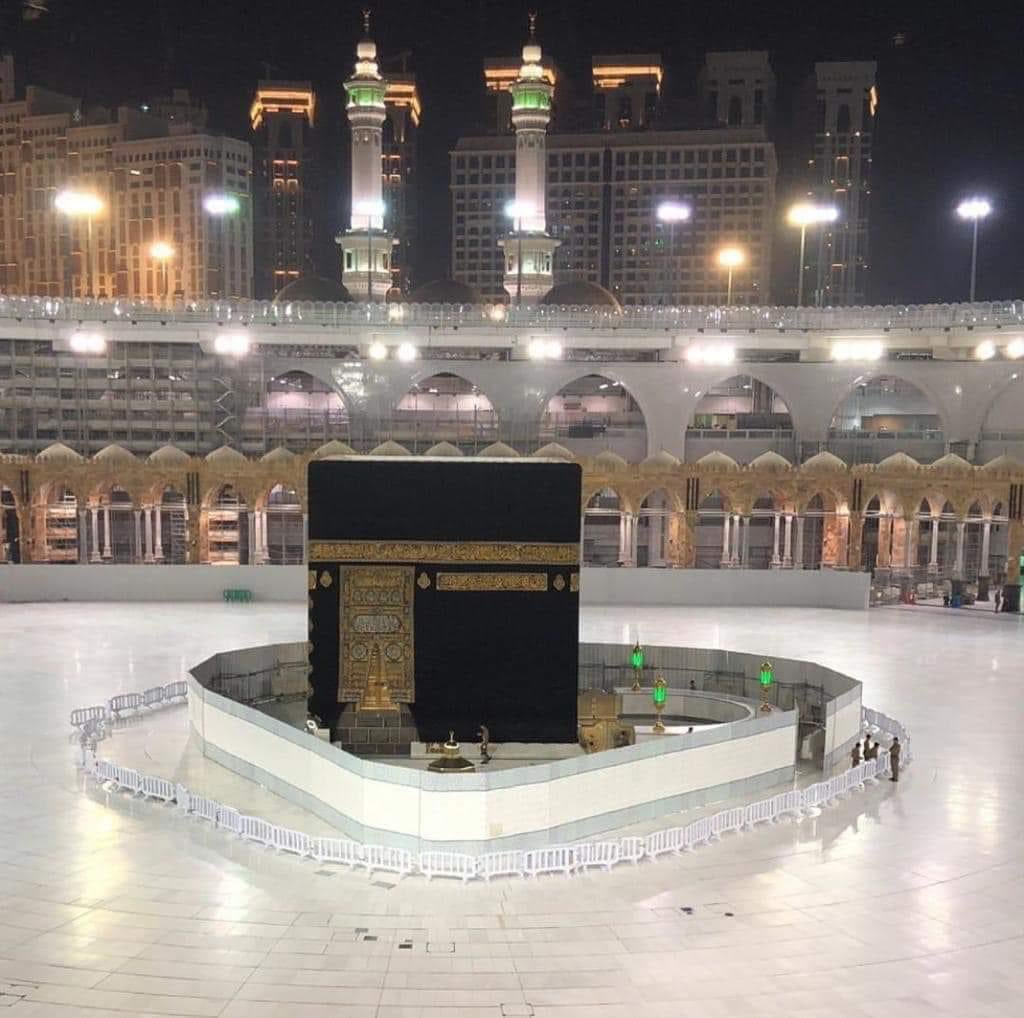
Nobody imagined that such a day would ever come, yet it did. The Haram was actually empty for a time. Alhamdulillah, things are much better but Covid isn’t gone completely.
For those who are dying to see the Haram again, this part focuses solely on tawaf and other related matters like the Black Stone, the Yemeni Corner, Maqam Ibrahim and Zam Zam.
Tawaf refers to going around (circumambulating) the Kabah 7 times (anti-clockwise), with each round starting and ending at the Black stone.
In the Hadeeth of Jaabir (discussed in Part 4), it states:
قَالَ جَابِرٌ رضيَ اللّهُ عَنْهُ: لَسْنَا نَنْوِي إِلاَّ الْحَجَّ. لَسْنَا نَعْرِفُ الْعُمْرَةَ. حَتَّى إِذَا أَتَيْنَا الْبَيْتَ مَعَهُ، اسْتَلَمَ الرُّكْنَ فَرَمَلَ ثَلاَثاً وَمَشَى أَرْبَعاً. ثُمَّ نَفَذَ إِلَى مَقَامِ إِبْرَاهِيمَ عَلَيْهِ السَّلاَمُ. فَقَرَأَ {وَاتَّخِذُوا مِنْ مَقَامِ إِبْرَاهِيمَ مُصَلًّى} (2البقرة الآية:125) فَجَعَلَ الْمَقَامَ بَيْنَهُ وَبَيْنَ الْبَيْتِ. فَكَانَ أَبِي يَقُولُ (وَلاَ أَعْلَمُهُ ذَكَرَهُ إِلاَّ عَنِ النَّبِيِّ ): كَانَ يَقْرَأُ فِي الرَّكْعَتَيْنِ:{قُلْ هُوَ اللّهُ أَحَدٌ} وَ{قُلْ يا أَيُّهَا الْكَافِرُونَ}، ثُمَّ رَجَعَ إِلَى الرُّكْنِ فَاسْتَلَمَهُ.
Jabir (radiallahu anhu) said: We did not have any other intention but that of Hajj only, being unaware of the Umrah (at that season), but when we came with him to the House, he touched the pillar and (made seven circuits) running three of them and walking four. And then going to the Station of Ibrahim, he recited:
وَاتَّخِذُوا مِن مَّقَامِ إِبْرَاهِيمَ مُصَلًّى
“And adopt the Station of Ibrahim as a place of prayer.” [Surah Al-Baqarah (2) : 125]
And this Station was between him and the House. (Jafar ibn Muhammad said) My father used to say – and I don’t think that he was narrating it from anyone but the Prophet (sallallahu alaihi wasallam) that he used to recite in these two rakahs: قُلْ هُوَ اللَّـهُ أَحَدٌ (Surah Al-Ikhlaas) and قُلْ يَا أَيُّهَا الْكَافِرُونَ (Surah Al-Kaafiroon). He then returned to the pillar and touched it. [Sahih Muslim, Hadeeth No. 2803]
So, the first act to be performed after assuming ihram is tawaf (remember that the talbiyah is stopped when one starts tawaf).
So, let’s take a closer look at all that tawaf entails.
Hope you enjoy the journey.
IMPORTANCE AND VIRTUES OF TAWAF
Tawaf is a very important, virtuous act. In fact, it is a pillar of both Hajj and Umrah.
-
Allah has commanded the pilgrims to do tawaf of the House
ثُمَّ لْيَقْضُوا تَفَثَهُمْ وَلْيُوفُوا نُذُورَهُمْ وَلْيَطَّوَّفُوا بِالْبَيْتِ الْعَتِيقِ
Then let them complete the prescribed duties (Manasik of Hajj) for them, and perform their vows, and circumambulate the Ancient House (the Kabah at Makkah). [Surah Al-Hajj (22) : 29]
Ibn Kathir stated in his explanation of this verse:
وَلْيَطَّوَّفُوا بِالْبَيْتِ الْعَتِيقِ
“(and circumambulate the Ancient House) Mujahid said: “This means the Tawaf which is obligatory on the day of Sacrifice.””
2. Allah has commanded that the House be purified for those that do tawaf, itikaf and prayer
وَإِذْ جَعَلْنَا الْبَيْتَ مَثَابَةً لِّلنَّاسِ وَأَمْنًا وَاتَّخِذُوا مِن مَّقَامِ إِبْرَاهِيمَ مُصَلًّى ۖ وَعَهِدْنَا إِلَىٰ إِبْرَاهِيمَ وَإِسْمَاعِيلَ أَن طَهِّرَا بَيْتِيَ لِلطَّائِفِينَ وَالْعَاكِفِينَ وَالرُّكَّعِ السُّجُودِ
And (remember) when We made the House (the Kabah at Makkah) a place of resort for mankind and a place of safety. And take you (people) the Maqam (place) of Ibrahim [or the stone on which Ibrahim stood while he was building the Kabah] as a place of prayer (for some of your prayers, e.g. two Rakah after the Tawaf of the Kabah at Makkah), and We commanded Ibrahim and Ismail that they should purify My House (the Kabah at Makkah) for those who are circumambulating it, or staying (Itikaf), or bowing or prostrating themselves (there, in prayer). [Surah Al-Baqarah (2) : 125]
Ibn Kathir stated in his explanation of this verse:
“Al-Hasan Al-Basri said that,
﴿وَعَهِدْنَآ إِلَى إِبْرَهِيمَ وَإِسْمَـعِيلَ﴾
(And We gave Our Ahd (command) to Ibrahim and Ismail) means, “Allah ordered them to purify it from all filth and impurities, of which none should ever touch it.” Also, Ibn Jurayj said, “I said to Ata, `What is Allah’s Ahd’ He said, `His command.”’ Also, Said bin Jubayr said that Ibn Abbas commented on the Ayah,
﴿أَن طَهِّرَا بَيْتِىَ لِلطَّآئِفِينَ وَالْعَـكِفِينَ﴾
(that they should purify My House (the Kabah) for those who are circumambulating it, or staying (Itikaf)) “Purify it from the idols.” Further, Mujahid and Said bin Jubayr said that,
﴿طَهِّرَا بَيْتِىَ لِلطَّآئِفِينَ﴾
(purify My House for those who are circumambulating it) means, “From the idols, sexual activity, false witness and sins of all kinds.””
Another proof is in the following ayah (verse):
وَإِذْ بَوَّأْنَا لِإِبْرَاهِيمَ مَكَانَ الْبَيْتِ أَن لَّا تُشْرِكْ بِي شَيْئًا وَطَهِّرْ بَيْتِيَ لِلطَّائِفِينَ وَالْقَائِمِينَ وَالرُّكَّعِ السُّجُودِ
And (remember) when We showed Ibrahim (Abraham) the site of the (Sacred) House (the Kabah at Makkah) (saying): “Associate not anything (in worship) with Me and sanctify My House for those who circumambulate it, and those who stand up for prayer, and those who bow (submit themselves with humility and obedience to Allah), and make prostration (in prayer, etc.);” [Surah Al-Hajj (22) : 26]
3. Tawaf is similar to prayer
Prayer is a great act of worship. In the following hadeeth, the Prophet (sallallahu alaihi wasallam) pointed out how tawaf is similar to prayer.
عَنِ ابْنِ عَبَّاسٍ، أَنَّ النَّبِيَّ صلى الله عليه وسلم قَالَ : الطَّوَافُ حَوْلَ الْبَيْتِ مِثْلُ الصَّلاَةِ إِلاَّ أَنَّكُمْ تَتَكَلَّمُونَ فِيهِ فَمَنْ تَكَلَّمَ فِيهِ فَلاَ يَتَكَلَّمَنَّ إِلاَّ بِخَيْرٍ
Ibn Abbas (radiallahu anhuma) narrated that the Prophet (sallallahu alaihi wasallam) said: “Tawaf around the House is similar to prayer except that you can talk during it. So whoever talks in it, then let him not say anything but good.” [Jaami At-Tirmidhi, Hadeeth No. 960. Graded “sahih” (authentic) by Al-Albani.]
عَنْ طَاوُسٍ، عَنْ رَجُلٍ، أَدْرَكَ النَّبِيَّ صلى الله عليه وسلم قَالَ : الطَّوَافُ بِالْبَيْتِ صَلاَةٌ فَأَقِلُّوا مِنَ الْكَلاَمِ
قَالَ عَبْدُ اللَّهِ بْنُ عُمَرَ أَقِلُّوا الْكَلاَمَ فِي الطَّوَافِ فَإِنَّمَا أَنْتُمْ فِي الصَّلاَةِ
4. Tawaf of the House is done to establish the remembrance of Allah
عن عائشة قالت: قال رسول الله صلى الله عليه وسلّم: إنما جعل الطواف بالبيت وبين الصفا والمروة ورمى الجمار لإقامة ذكر الله
Aishah (radiallahu anha) narrated that the Prophet (sallallahu alaihi wasallam) said, “The Tawaf of the House and between As-Safa and Al-Marwah and stoning the Jimaar are only done for the establishment of Allah’s remembrance.”[Sahih Ibn Khuzaimah, Hadeeth no. 2882. Graded “sahih” (authentic) by Shaikh Mustafa Al-Azami]
5. Performing tawaf is like freeing a slave
عَنِ ابْنِ عُبَيْدِ بْنِ عُمَيْرٍ، عَنْ أَبِيهِ، أَنَّ ابْنَ عُمَرَ، كَانَ يُزَاحِمُ عَلَى الرُّكْنَيْنِ زِحَامًا مَا رَأَيْتُ أَحَدًا مِنْ أَصْحَابِ النَّبِيِّ صلى الله عليه وسلم يَفْعَلُهُ . فَقُلْتُ يَا أَبَا عَبْدِ الرَّحْمَنِ إِنَّكَ تُزَاحِمُ عَلَى الرُّكْنَيْنِ زِحَامًا مَا رَأَيْتُ أَحَدًا مِنْ أَصْحَابِ النَّبِيِّ صلى الله عليه وسلم يُزَاحِمُ عَلَيْهِ . فَقَالَ إِنْ أَفْعَلْ فَإِنِّي سَمِعْتُ رَسُولَ اللَّهِ صلى الله عليه وسلم يَقُولُ : إِنَّ مَسْحَهُمَا كَفَّارَةٌ لِلْخَطَايَا . وَسَمِعْتُهُ يَقُولُ : مَنْ طَافَ بِهَذَا الْبَيْتِ أُسْبُوعًا فَأَحْصَاهُ كَانَ كَعِتْقِ رَقَبَةٍ . وَسَمِعْتُهُ يَقُولُ : لاَ يَضَعُ قَدَمًا وَلاَ يَرْفَعُ أُخْرَى إِلاَّ حَطَّ اللَّهُ عَنْهُ بِهَا خَطِيئَةً وَكَتَبَ لَهُ بِهَا حَسَنَةً
Ibn Ubaid bin Umair narrated from his father: “Ibn Umar was clinging on the two corners (in a manner that I had not seen any of the Companions of the Prophet doing) so I said: ‘O Abu Abdur-Rahman! You are clinging on the two corners in a manner that I have not seen any of the Companions of the Prophet clinging.’
So he said: ‘I do it because I heard the Messenger of Allah (sallallahu alaihi wasallam) saying: “Touching them atones for sins.”
And I heard him saying: “Whoever performs Tawaf around this House seven times and he keeps track of it, then it is as if he freed a slave.”
And I heard him saying: “One foot is not put down, nor another raised except that Allah removes a sin from him and records a good deed for him.” [Sunan At-Tirmidhi, Hadeeth No. 959. Graded “sahih” (authentic) by Al-Albani. Please note that Shaikh Al-Albani graded each sentence of Ibn Umar (radiallahu anhuma) separately and each was graded sahih.]
عَنْ عَبْدِ اللَّهِ بْنِ عُمَرَ، قَالَ سَمِعْتُ رَسُولَ اللَّهِ ـ صلى الله عليه وسلم ـ يَقُولُ : مَنْ طَافَ بِالْبَيْتِ وَصَلَّى رَكْعَتَيْنِ كَانَ كَعِتْقِ رَقَبَةٍ
It was narrated that Abdullah ibn Umar (radiallahu anhu) said: “I heard the Messenger of Allah (sallallahu alaihi wasallam) say: ‘Whoever performs Tawaf around the House and prays two Rakah, it is as if he freed a slave.’” [Sunan Ibn Majah, Hadeeth No. 2956. Graded “sahih” (authentic) by Al-Albani.]
There are other rewards for doing tawaf as well.
عن عبدِ اللهِ بنِ عُبَيدِ بنِ عُمَيرِ، أنَّه سَمِعَ أباه يقولُ لابنِ عُمَرَ: ما لي لا أراكَ تَستَلِمُ إلَّا هَذَينِ الرُّكنَينِ: الحَجَرَ الأسوَدَ، والرُّكنَ اليَمانِيَّ؟ فقال ابنُ عُمَرَ: إنْ أفعَلْ فقد سَمِعتُ رسولَ اللهِ صلَّى اللهُ عليه وسلَّم يقولُ: إنَّ استِلامَهما يَحُطُّ الخَطايا. قال: وسَمِعتُه يقولُ: مَن طافَ أُسبوعًا يُحصيهِ، وصلَّى رَكعَتَينِ كان له كعَدْلِ رَقَبةٍ. قال: وسَمِعتُه يقولُ: ما رَفَعَ رَجُلٌ قَدمًا، ولا وَضَعَها إلَّا كُتِبَتْ له عَشْرُ حَسَناتٍ، وحُطَّ عنه عَشْرُ سيِّئاتٍ، ورُفِعَ له عَشْرُ دَرَجاتٍ
It was narrated from Abdullah ibn Ubayd ibn Umayr that he heard his father say to Ibn Umar (radiallahu anhuma): Why do I see you not touching any corners [of the Kabah] except these two: the Black Stone and the Yemeni corner?
Ibn Umar said: “If I do that, it is because I heard the Messenger of Allah (sallallahu alaihi wasallam) saying: “Touching them erases sins.”
And I heard him say: “Whoever circumambulates (the Kabah) seven times and prays two rakahs, he will have (a reward) like that of manumitting a slave.”
He said: And I heard him say: “A man does not lift his foot (in tawaf) and place it on the ground but ten hasanaat (good deeds) will be recorded for him and ten sayiaat (evil deeds) will be erased for him, and he will be raised ten degrees in status.” [Musnad Ahmad, Hadeeth No. 4462. Shuaib Al-Arnaut said the hadeeth was “hasan” (good).]
Another proof of this can be found in the long hadeeth mentioned earlier in Part 3.
عن ابن عمر رضي الله عنه قال: كنتُ جالسًا مع النَّبيِّ صلَّى اللهُ عليه وسلَّم في مسجدِ منًى فأتاه رجلٌ من الأنصارِ ورجلٌ من ثَقيفٍ فسلَّما ثمَّ قالا يا رسولَ اللهِ جِئنا نسألُك فقال إن شئتُما أخبرَتُكما بما جِئتما تسألاني عنه فعلتُ وإن شِئتُما أن أمسِكَ وتسألاني فعلتُ فقال أخبرنا يا رسولَ اللهِ فقال الثَّقفيُّ للأنصاريِّ سلْ فقال أخبِرْني يا رسولَ اللهِ فقال جِئتَني تسألُني عن مخرجِك من بيتِك تؤُمُّ البيتَ الحرامَ وما لك فيه وعن ركعتَيْك بعد الطَّوافِ وما لك فيهما وعن طوافِك بين الصَّفا والمروةِ وما لك فيه وعن وقوفِك عشيَّةَ عرفةَ وما لك فيه وعن رميِك الجِمارِ وما لك فيه وعن نحرِك فيه وما لك فيه مع الإفاضةِ فقال والَّذي بعثك بالحقِّ لَعَنْ هذا جئتُ أسألُك قال فإنَّك إذا خرجتَ من بيتِك تؤُمُّ البيتَ الحرامَ لا تضعُ ناقتُك خفًّا ولا ترفعُه إلَّا كتب اللهُ لك به حسنةً ومحا عنك خطيئةً وأمَّا ركعتاك بعد الطَّوافِ كعِتقِ رقبةٍ وأمَّا وقوفُك عشيَّةَ عرفةَ فإنَّ اللهَ يهبِطُ إلى سماءِ الدُّنيا فيباهي بكم الملائكةَ يقولُ عبادي جاءوني شُعثًا من كلِّ فجٍّ عميقٍ يرجُون جنَّتي فلو كانت ذنوبُكم كعددِ الرَّملِ أو كقطْرِ المطرِ أو كزَبَدِ البحرِ لغفرتُها أفيضوا عبادي مغفورًا لكم ولمن شفعتُم له وأمَّا رميُك الجمارَ فلك بكلِّ حصاةٍ رميْتَها تُكفِّرُ كبيرةً من الموبقاتِ وأمَّا نحرُك فمذخورٌ لك عند ربِّك وأمَّا حِلاقُك رأسَك فلك بكلِّ شعرةٍ حلقتَها حسنةٌ ويُمحَى عنك بها خطيئةٌ وأمَّا طوافُك بالبيتِ بعد ذلك فإنَّك تطوفُ ولا ذنبَ لك ويأتي ملَكٌ حتَّى يضعَ يدَيْه بين كتِفَيْك فيقولُ اعملْ فيما تستقبِلُ فقد غُفِر لك ما مضَى
It is narrated on the authority of Ibn Umar – radiAllaahu anhuma – who said: I was sitting with the Prophet – sallAllaahu alayhi wa sallam – in the masjid in Mina when a man from the Ansaar came and a man from the Thaqeef, they gave Salaam and said, “O Messenger of Allaah, we came to ask you questions.”
So the Messenger said: “If you want I can inform you why you came and what you want to ask, and I will do so, and if you want I will hold back and you can ask me and I will answer you.”
They said: “Tell us O Messenger of Allaah!”
The man from Thaqeef said to the Ansaari: “Ask.” So the Ansaari man said: “Inform me O Messenger of Allaah!”
The Messenger of Allaah said: “You came to me, to ask about leaving your house and aiming for the Bait-ul-Haraam and the reward for it; about praying two Rakah after Tawaaf and the reward for it; going between as-Safa and Marwa and the reward for it; your staying the evening in Mina, and the reward for it; stoning the Jamarah and the reward for it; slaughtering an animal and the reward for it; and the Tawaaf of al-Ifaadh.” The man said: “I swear by the One who sent you with the truth! This is what I came to ask you about.”
The Prophet said: “As for you leaving your homes aiming for the Bait-ul-Haraam: then your she-camel does not place its foot nor does it raise it except that Allaah writes for you a reward due to it, and wipes off one of your sins.
As for the two Rakah after the Tawaaf, then it is equivalent to freeing a slave from the Children of Ismaeel. As for your circuiting of as-Safa and al-Marwa, then it is the same as freeing 70 slaves.
As for you staying till the evening in Arafah, then Allaah descends to the sky of the Duniya* and He boasts about you to the Angels, and says: ‘My slaves have come to Me, looking rough, from every deep valley hoping for My mercy, so if your sins were equivalent to the amount of sand or the drops of rain or like the foam on the sea I will forgive them. So go forth My slaves! Having forgiveness and for what or who you have interceded for.’
As for stoning the Jamaar (the pillars), then for every stone that you throw, it removes a big sin from the deadly sins. As for your slaughtering, then it is saved for you with your Lord. As for shaving your head, then there is a reward for every strand of hair that you shaved, and a sin is wiped off by it.
As for you performing Tawaaf of the House after all this, then by this time your are performing Tawaaf with no sin upon you and an Angel comes and places his hand between your shoulders saying: “Perform good deeds in what you face of the future for verily your past sins have been forgiven.” [Sahih At-Targheeb Wat-Tarheeb, Hadeeth No. 1112]
[* Duniya is this world.]
[ Note: This hadeeth was translated by Brother Abbas Abu Yahya on his blog, so I decided to copy as it is and not make any changes to the translation. ]
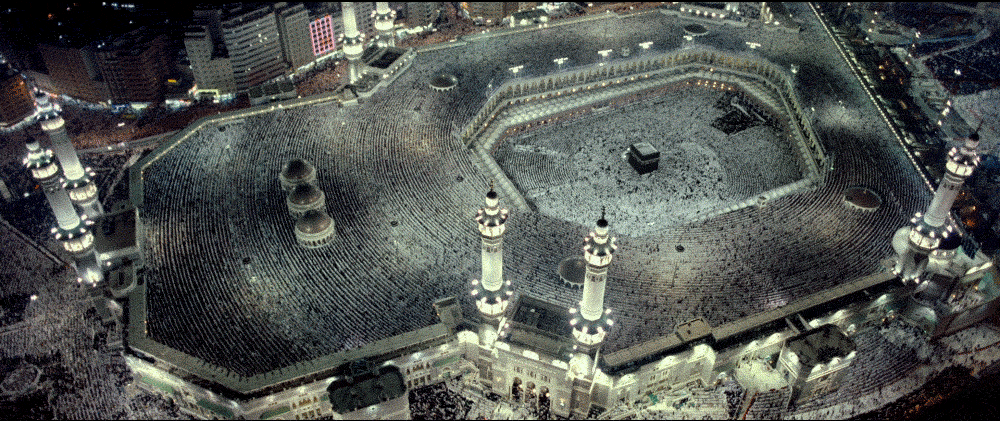
HISTORY OF TAWAF
As mentioned in Part 3, the pagan Arabs used to perform tawaf around the Kabah naked.
عن هِشَامٌ، عَنْ أَبِيهِ، قَالَ كَانَتِ الْعَرَبُ تَطُوفُ بِالْبَيْتِ عُرَاةً إِلاَّ الْحُمْسَ وَالْحُمْسُ قُرَيْشٌ وَمَا وَلَدَتْ كَانُوا يَطُوفُونَ عُرَاةً إِلاَّ أَنْ تُعْطِيَهُمُ الْحُمْسُ ثِيَابًا فَيُعْطِي الرِّجَالُ الرِّجَالَ وَالنِّسَاءُ النِّسَاءَ وَكَانَتِ الْحُمْسُ لاَ يَخْرُجُونَ مِنَ الْمُزْدَلِفَةِ وَكَانَ النَّاسُ كُلُّهُمْ يَبْلُغُونَ عَرَفَاتٍ . قَالَ هِشَامٌ فَحَدَّثَنِي أَبِي عَنْ عَائِشَةَ – رضى الله عنها – قَالَتِ الْحُمْسُ هُمُ الَّذِينَ أَنْزَلَ اللَّهُ عَزَّ وَجَلَّ فِيهِمْ { ثُمَّ أَفِيضُوا مِنْ حَيْثُ أَفَاضَ النَّاسُ} قَالَتْ كَانَ النَّاسُ يُفِيضُونَ مِنْ عَرَفَاتٍ وَكَانَ الْحُمْسُ يُفِيضُونَ مِنَ الْمُزْدَلِفَةِ يَقُولُونَ لاَ نُفِيضُ إِلاَّ مِنَ الْحَرَمِ فَلَمَّا نَزَلَتْ { أَفِيضُوا مِنْ حَيْثُ أَفَاضَ النَّاسُ} رَجَعُوا إِلَى عَرَفَاتٍ .
Hisham narrated on the authority of his father that the Arabs with the exception of Hums who were Quraish, and their descendants, circumambulated the House naked. They kept circumambulating in this state of nudity unless the Hums supplied to them the clothes. The male provided (clothes) to the male and the female provided clothes to the female. And the Hums did not get out of Muzdalifah, whereas the people (other than the Quraish) went to Arafah. Hisham said on the authority of his father who related from Aisha (radiallahu anha) who said:
Hums are those about whom Allah, the Exalted and Glorious, revealed this verse:
ثُمَّ أَفِيضُوا مِنْ حَيْثُ أَفَاضَ النَّاسُ
“Then hasten to where the people hasten.”
She (further) said: The people hastened on from Arafah, whereas Hums hastened from Muzdalifah, and said: We do not hasten but from Haram. But when this (verse) was revealed:
أَفِيضُوا مِنْ حَيْثُ أَفَاضَ النَّاسُ
“Hasten on from that (place) where the people hasten on,”
they (the Quraish) then went to Arafah. [Sahih Muslim, Hadeeth No. 2808]
So, they would do tawaf naked and also whistle and clap their hands – as opposed to remembering Allah!
وَمَا كَانَ صَلَاتُهُمْ عِندَ الْبَيْتِ إِلَّا مُكَاءً وَتَصْدِيَةً ۚ فَذُوقُوا الْعَذَابَ بِمَا كُنتُمْ تَكْفُرُونَ
Their Salah (prayer) at the House (of Allah, i.e. the Kabah at Makkah) was nothing but whistling and clapping of hands. Therefore taste the punishment because you used to disbelieve. [Surah Al-Anfal (8) : 35]
Imam Ibn Kathir (rahimahullah) states the following in his explanation of this ayah (verse):
“Said bin Jubayr said that Ibn Abbas commented on Allah’s statement,
﴿وَمَا كَانَ صَلاَتُهُمْ عِندَ الْبَيْتِ إِلاَّ مُكَآءً وَتَصْدِيَةً﴾
(Their Salat at the House was nothing but Muka’ and Tasdiyah.) “The Quraysh used to perform Tawaf (encircling the Kabah) while naked, whistling and clapping their hands, for Muka’ means `whistling’, while, Tasdiyah means `clapping the hands.”’
Naked people were banned from tawaf in the 9th year after Hijrah (migration from Makkah), and all praise is due to Allah.
عن أَبَي هُرَيْرَة قَالَ بَعَثَنِي أَبُو بَكْرٍ فِي تِلْكَ الْحَجَّةِ فِي مُؤَذِّنِينَ يَوْمَ النَّحْرِ نُؤَذِّنُ بِمِنًى أَنْ لاَ يَحُجَّ بَعْدَ الْعَامِ مُشْرِكٌ، وَلاَ طُوفَ بِالْبَيْتِ عُرْيَانٌ. قَالَ حُمَيْدُ بْنُ عَبْدِ الرَّحْمَنِ ثُمَّ أَرْدَفَ رَسُولُ اللَّهِ صلى الله عليه وسلم عَلِيًّا، فَأَمَرَهُ أَنْ يُؤَذِّنَ بِبَرَاءَةَ قَالَ أَبُو هُرَيْرَةَ فَأَذَّنَ مَعَنَا عَلِيٌّ فِي أَهْلِ مِنًى يَوْمَ النَّحْرِ لاَ يَحُجُّ بَعْدَ الْعَامِ مُشْرِكٌ، وَلاَ يَطُوفُ بِالْبَيْتِ عُرْيَانٌ
Narrated Abu Hurairah (radiallahu anhu): On the Day of Nahr (10th of Dhul-Hijjah, in the year prior to the last Hajj of the Prophet (sallallahu alaihi wasallam) when Abu Bakr was the leader of the pilgrims in that Hajj) Abu Bakr sent me along with other announcers to Mina to make a public announcement: “No pagan is allowed to perform Hajj after this year and no naked person is allowed to perform the Tawaf around the Kabah. Then Allah’s Messenger (sallallahu alaihi wasallam) sent Ali to read out the Surah Baraa (At-Taubah) to the people; so he made the announcement along with us on the day of Nahr in Mina: “No pagan is allowed to perform Hajj after this year and no naked person is allowed to perform the Tawaf around the Kabah.” [Sahih Al-Bukhari, Volume 1, Hadeeth No. 365]
As for the tawaf area itself, it has changed greatly over the years.
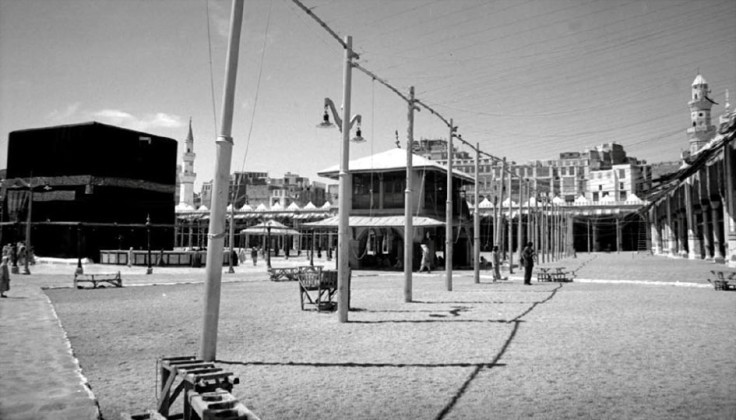
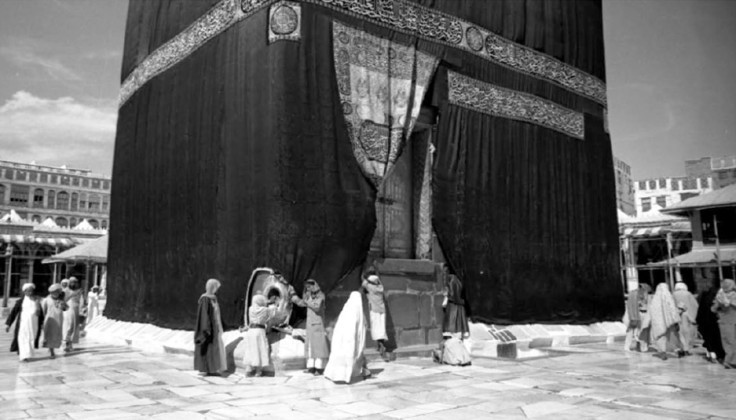
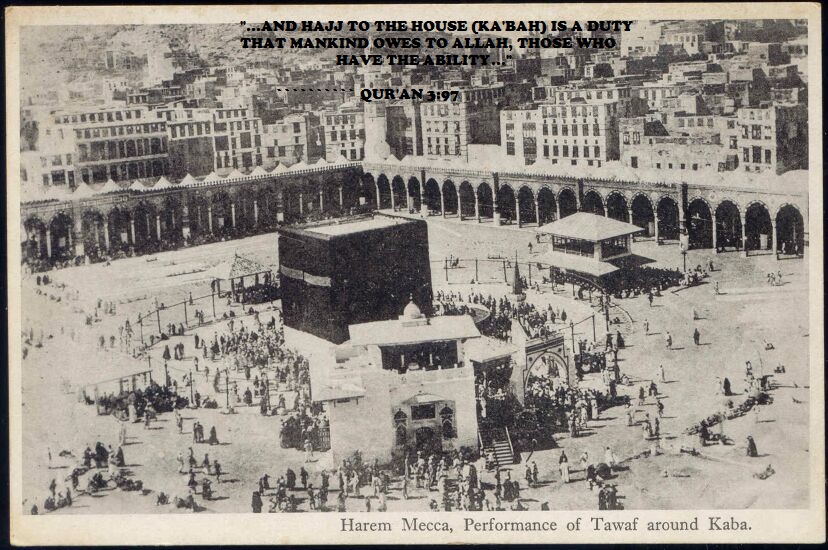
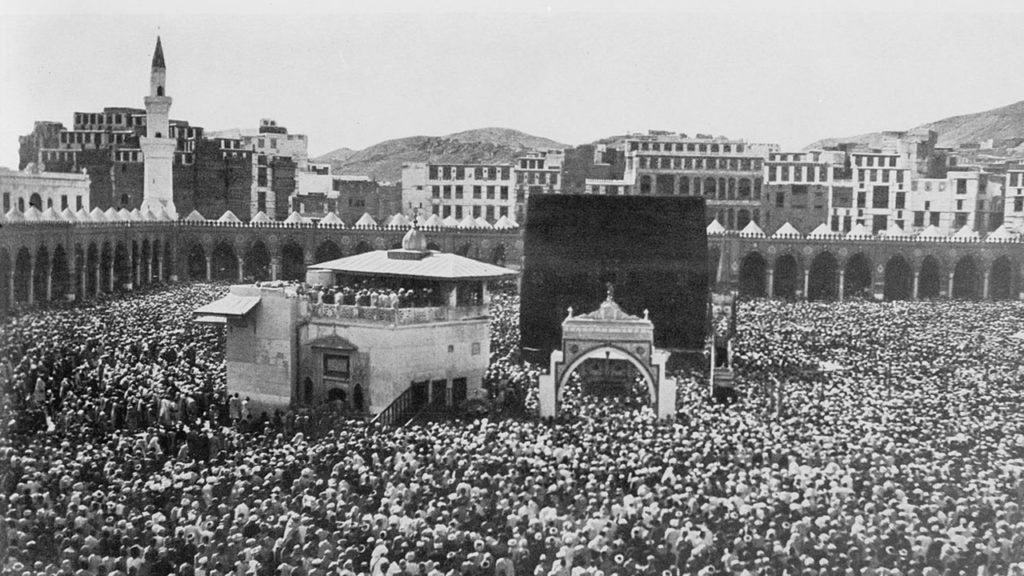
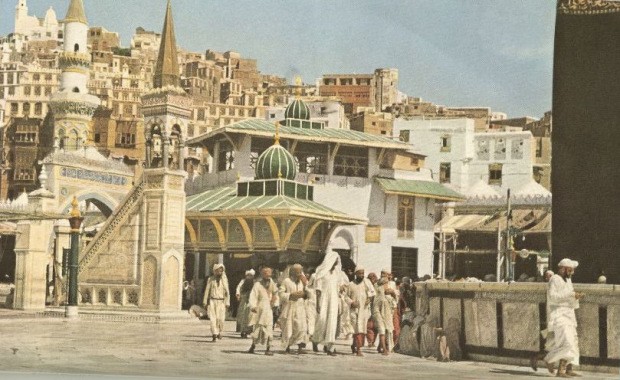
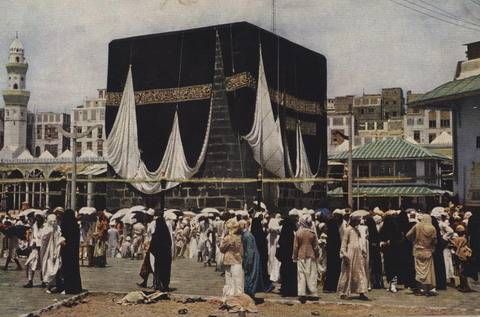
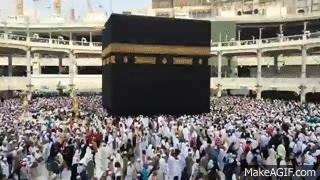

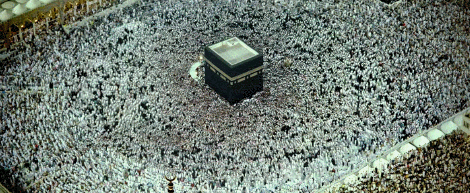

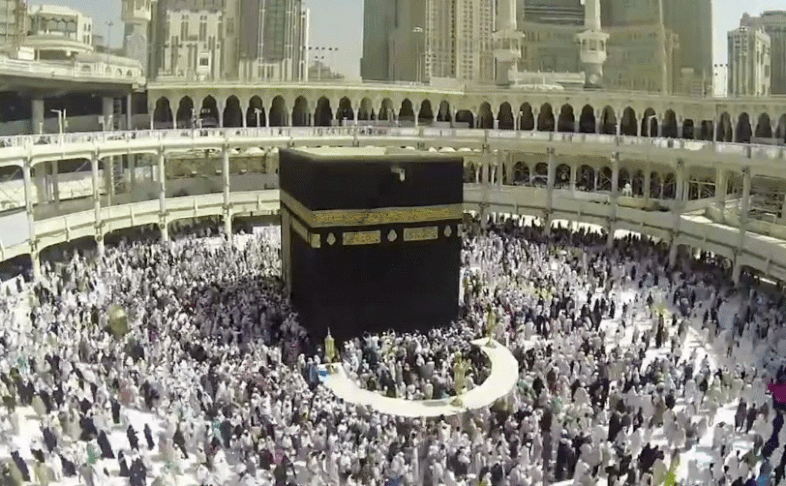
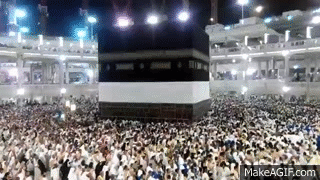
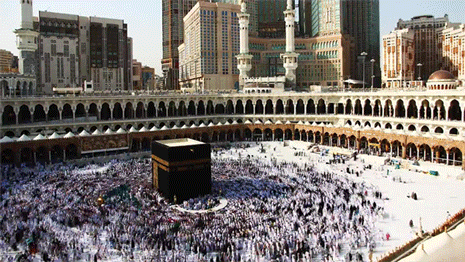

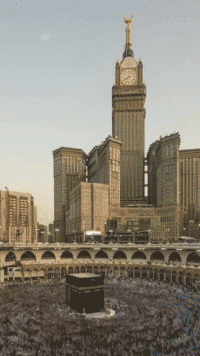
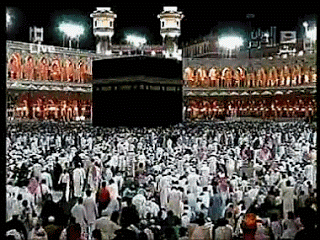
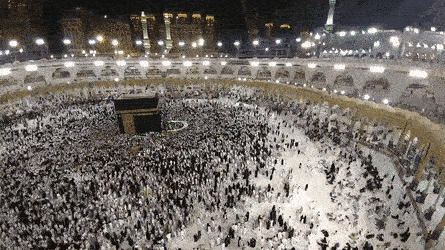
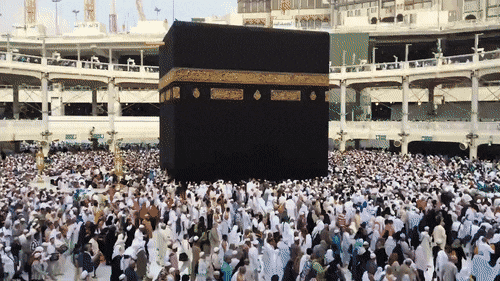
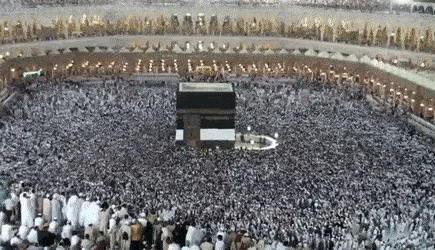
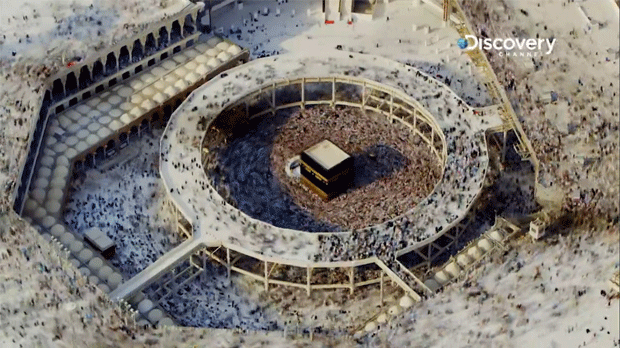
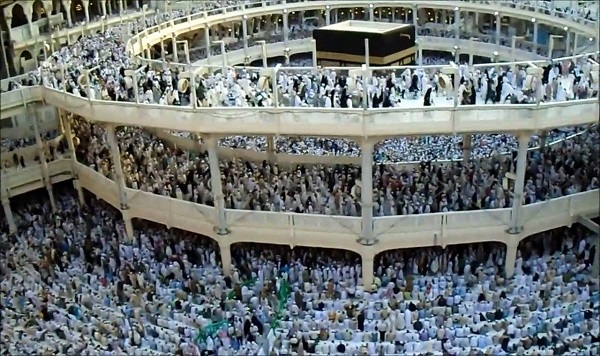
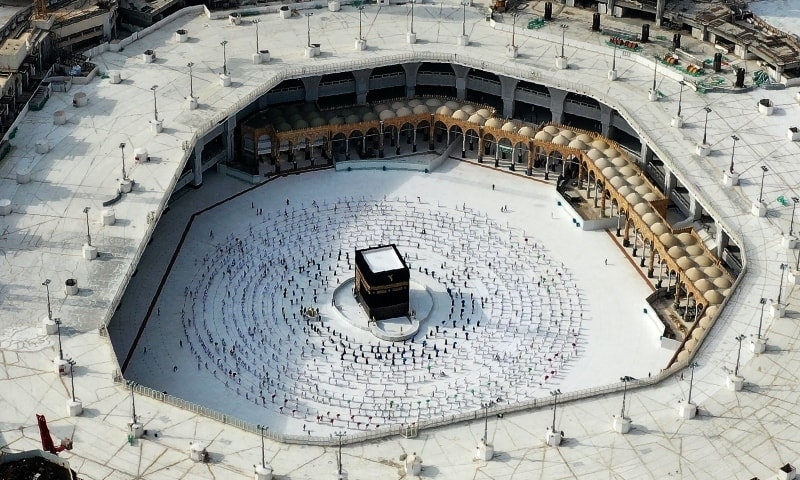
The last picture is obviously from the current Covid era. May Allah relieve us of it, and monkeypox and all diseases.
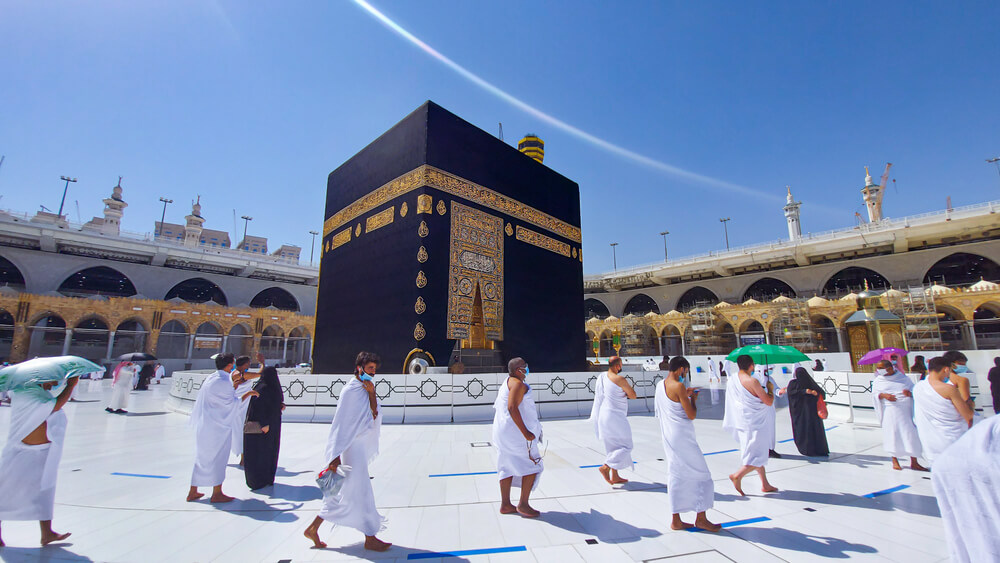
TYPES OF TAWAF
There are different types of tawaf. All of them involved going around the Kabah 7 times. The following differences exist:
- The intention – it differs according to the type of tawaf.
- Whether one is in ihram or not – Tawaf Al-Qudoom and Tawaf of Umrah require a person to be in ihram whereas Tawad of Ifaadah requires partial ihram.
- Running in the first 3 rounds and exposing the shoulder is only done for the first Tawaf in a journey i.e. Tawaf Al-Qudoom or Tawaf of Umrah.
- The status of that tawaf – Some types are obligatory whereas others are not.
The types of Tawaf are as follows:
-
Tawaf Al-Qudoom (Tawaf of Arrival)
This is done by the pilgrim who is doing Hajj Ifrad or Qiran upon arriving at the Kabah. According to the Standing committee, there is a difference of opinion on whether this is obligatory or recommended.
The Prophet (sallallahu alaihi wasallam) performed this tawaf upon arriving at the House.
عَنْ وَبَرَةَ، قَالَ كُنْتُ جَالِسًا عِنْدَ ابْنِ عُمَرَ فَجَاءَهُ رَجُلٌ فَقَالَ أَيَصْلُحُ لِي أَنْ أَطُوفَ بِالْبَيْتِ قَبْلَ أَنْ آتِيَ الْمَوْقِفَ . فَقَالَ نَعَمْ . فَقَالَ فَإِنَّ ابْنَ عَبَّاسٍ يَقُولُ لاَ تَطُفْ بِالْبَيْتِ حَتَّى تَأْتِيَ الْمَوْقِفَ . فَقَالَ ابْنُ عُمَرَ فَقَدْ حَجَّ رَسُولُ اللَّهِ صلى الله عليه وسلم فَطَافَ بِالْبَيْتِ قَبْلَ أَنْ يَأْتِيَ الْمَوْقِفَ فَبِقَوْلِ رَسُولِ اللَّهِ صلى الله عليه وسلم أَحَقُّ أَنْ تَأْخُذَ أَوْ بِقَوْلِ ابْنِ عَبَّاسٍ إِنْ كُنْتَ صَادِقًا
Wabara reported: While I was sitting in the company of Ibn Umar (radiallahu anhuma), a person came to him and said: Is it right for me to circumambulate the House before I come to stay (at Arafah)? Ibn Umar said: Yes. whereupon he said: Ibn Abbas (radiallahu anhuma), however, says: Do not circumambulate the House until you come to stay at Arafah. Thereupon Ibn Umar said: Allah’s Messenger (sallallahu alaihi wasallam) performed the Hajj and circumambulated the House before coming to stay (at Arafah). If you say the truth, is it more rightful to follow the saying of the Prophet (sallallahu alaihi wasallam) or the words of Ibn Abbas? [Sahih Muslim, Hadeeth No. 2846]
2. Tawaf of Umrah
This is a pillar of Umrah. Umrah is invalidated if this is not performed.
عَنِ ابْنِ عَبَّاسٍ، أَنَّ رَسُولَ اللَّهِ صلى الله عليه وسلم وَأَصْحَابَهُ اعْتَمَرُوا مِنَ الْجِعْرَانَةِ فَرَمَلُوا بِالْبَيْتِ وَجَعَلُوا أَرْدِيَتَهُمْ تَحْتَ آبَاطِهِمْ قَدْ قَذَفُوهَا عَلَى عَوَاتِقِهِمُ الْيُسْرَى
Narrated Ibn Abbas (radiallahu anhuma): The Messenger of Allah (sallallahu alaihi wasallam) and his Companions performed Umrah from al-Jiraanah. They went quickly round the House (the Kabah). They put their upper garments under their armpits and threw the ends over their left shoulders. [Sunan Abee Dawood, Hadeeth No. 1884. Graded “sahih” (authentic) by Al-Albani]
This is the Tawaf that this section is referring to.
3. Tawaf Al-Ifaadhah (The Tawaf of Hajj or the Tawaf of Ziyaarah (Visiting))
This is done after the standing at Arafah, usually on the 10th of Dhul Hijjah or after it. This is one of the pillars of Hajj without which Hajj is invalid.
It states in the Hadeeth of Jaabir (discussed in Part 4):
ثُمَّ رَكِبَ رَسُولُ اللّهِ فَأَفَاضَ إِلَى الْبَيْتِ. فَصَلَّى بِمَكَّةَ الظُّهْرَ
The Messenger of Allah (sallahu alaihi wasallam) again rode and came to the House (and performed Tawaf Al-Ifaadhah), and offered the Dhuhr prayer at Makkah. [Sahih Muslim, Hadeeth No. 2803]
عَنْ عَائِشَة قَالَتْ حَاضَتْ صَفِيَّةُ بِنْتُ حُيَىٍّ بَعْدَ مَا أَفَاضَتْ – قَالَتْ عَائِشَةُ – فَذَكَرْتُ حِيضَتَهَا لِرَسُولِ اللَّهِ صلى الله عليه وسلم فَقَالَ رَسُولُ اللَّهِ صلى الله عليه وسلم : أَحَابِسَتُنَا هِيَ . قَالَتْ فَقُلْتُ يَا رَسُولَ اللَّهِ إِنَّهَا قَدْ كَانَتْ أَفَاضَتْ وَطَافَتْ بِالْبَيْتِ ثُمَّ حَاضَتْ بَعْدَ الإِفَاضَةِ . فَقَالَ رَسُولُ اللَّهِ صلى الله عليه وسلم : فَلْتَنْفِرْ
Aishah (radiallahu anha) reported: Safiyyah bint Huyayy (radiallahu anha) entered the period of menses after performing Tawaf Al-Ifaadah. I made a mention of her menses to Allah’s Messenger (sallallahu alaihi wasallam), whereupon Allah’s Messenger (sallallahu alaihi wasallam) remarked: Well, then she will detain us. I said: Messenger of Allah, she has performed Tawaf Al-Ifaadah and circumambulated the House, and it was after this that she entered the period of menses. Thereupon Allah’s Messenger (sallallahu alaihi wasallam) said: (If it is so), then proceed forth. [Sahih Muslim, Hadeeth No. 3060]
عَنْ عَائِشَةَ، أَنَّ رَسُولَ اللَّهِ صلى الله عليه وسلم أَرَادَ مِنْ صَفِيَّةَ بَعْضَ مَا يُرِيدُ الرَّجُلُ مِنْ أَهْلِهِ . فَقَالُوا إِنَّهَا حَائِضٌ يَا رَسُولَ اللَّهِ . قَالَ : وَإِنَّهَا لَحَابِسَتُنَا . فَقَالُوا يَا رَسُولَ اللَّهِ إِنَّهَا قَدْ زَارَتْ يَوْمَ النَّحْرِ . قَالَ : فَلْتَنْفِرْ مَعَكُمْ
Aishah (radiallahu anha) reported that Allah’s Messenger (sallallahu alaihi wasallam) inclined to do with Safiyyah (radiallahu anha) what a man feels inclined to do with his wife. They said: Messenger of Allah, she has entered the state of menses, whereupon he said: (Well) she is going to detain us. They (his wives) said: Messenger of Allah, she performed Tawaf Ziyarah (Tawaf Al-Ifaadah) on the Day of Nahr (the Day of Sacrifice i.e. the 10th of Dhul Hijjah). Thereupon he said: Then she should proceed along with you. [Sahih Muslim, Hadeeth No. 3065]
4. Tawaf Al-Widaa (The Farewell Tawaf)
This is done at the end of the Hajj journey when one intends to go back home. The Standing Committee states:
“It is obligatory, according to the more correct of the two scholarly opinions, for all pilgrims except women who are menstruating or bleeding following childbirth, and the one who fails to do it must sacrifice an animal of the type that is valid as an udhiyah.”
عَنِ ابْنِ عَبَّاسٍ، قَالَ كَانَ النَّاسُ يَنْصَرِفُونَ فِي كُلِّ وَجْهٍ فَقَالَ رَسُولُ اللَّهِ صلى الله عليه وسلم : لاَ يَنْفِرَنَّ أَحَدٌ حَتَّى يَكُونَ آخِرُ عَهْدِهِ بِالْبَيْتِ
Ibn Abbas (radiallahu ahuma) reported that the people used to return through every path, whereupon Allah’s Messenger (sallallahu alaihi wasallam) said: None amongst you should depart until he performs the last circumambulation round the House. [Sahih Muslim, Hadeeth No. 3057]
عَنِ ابْنِ عَبَّاسٍ، قَالَ أُمِرَ النَّاسُ أَنْ يَكُونَ، آخِرُ عَهْدِهِمْ بِالْبَيْتِ إِلاَّ أَنَّهُ خُفِّفَ عَنِ الْمَرْأَةِ الْحَائِضِ
Ibn Abbas (radiallahu anhuma) reported: The people were commanded (by the Prophet) to perform the last circumambulation round the House, but menstruating women were exempted. [Sahih Muslim, Hadeeth No. 3058]
عَنِ ابْنِ عُمَرَ، قَالَ مَنْ حَجَّ الْبَيْتَ فَلْيَكُنْ آخِرُ عَهْدِهِ بِالْبَيْتِ إِلاَّ الْحُيَّضَ وَرَخَّصَ لَهُنَّ رَسُولُ اللَّهِ صلى الله عليه وسلم
Ibn Umar (radiallahu anhuma) said: “Whoever performs Hajj to the House, then let the last of their acts be at the House, except for menstruating women. The Messenger of Allah (sallallahu alaihi wasallam) gave them permission (to leave).” [Jaami At-Tirmidhi, Hadeeth No. 944. Graded “sahih” (authentic) by Al-Albani.]
Imam At-Tirmidhi (rahimahullah) stated after this hadeeth: “The hadith of Ibn Umar is a Hasan Sahih (authentic) hadith. This is acted upon according to the people of knowledge.”
5. Tawaf due to a vow
If a person vowed to do tawaf, then he needs to fulfill his vow. That’s because any vow made to be obedient to Allah needs to be fulfilled.
عَنْ عَائِشَةَ ـ رضى الله عنها ـ قَالَتْ قَالَ النَّبِيُّ صلى الله عليه وسلم : مَنْ نَذَرَ أَنْ يُطِيعَ اللَّهَ فَلْيُطِعْهُ، وَمَنْ نَذَرَ أَنْ يَعْصِيَهُ فَلاَ يَعْصِهِ
Narrated Aishah (radiallahu anha): The Prophet (sallallahu alaihi wasallam) said, “Whoever vowed to be obedient to Allah, must be obedient to Him; and whoever vowed to be disobedient to Allah, should not be disobedient to Him.” [Sahih Al-Bukhari, Volume 8, Hadeeth No. 691]
عَنْ مُحَمَّدِ بْنِ الزُّبَيْرِ، عَنْ أَبِيهِ، عَنْ رَجُلٍ، مِنْ أَهْلِ الْبَصْرَةِ قَالَ صَحِبْتُ عِمْرَانَ بْنَ حُصَيْنٍ قَالَ سَمِعْتُ رَسُولَ اللَّهِ صلى الله عليه وسلم يَقُولُ :النَّذْرُ نَذْرَانِ فَمَا كَانَ مِنْ نَذْرٍ فِي طَاعَةِ اللَّهِ فَذَلِكَ لِلَّهِ وَفِيهِ الْوَفَاءُ وَمَا كَانَ مِنْ نَذْرٍ فِي مَعْصِيَةِ اللَّهِ فَذَلِكَ لِلشَّيْطَانِ وَلاَ وَفَاءَ فِيهِ وَيُكَفِّرُهُ مَا يُكَفِّرُ الْيَمِينَ
This article contains more information on vows.
6. Nafl Tawaf (Voluntary Tawaf)
These can be done at any time so a pilgrim should try to increase in these.
عَنْ جُبَيْرِ بْنِ مُطْعِمٍ، أَنَّ النَّبِيَّ صلى الله عليه وسلم قَالَ : يَا بَنِي عَبْدِ مَنَافٍ لاَ تَمْنَعُوا أَحَدًا طَافَ بِهَذَا الْبَيْتِ وَصَلَّى أَيَّةَ سَاعَةٍ شَاءَ مِنْ لَيْلٍ أَوْ نَهَارٍ
It was narrated from Jubair bin Mutim (radiallahu anhu) that the Prophet (sallallahu alaihi wasallam) said: “O Banu Abd Manaf, do not prevent anyone from performing Tawaf of this House and praying at any time he wants of night or day.” [Sunan An-Nasai, Hadeeth No. 586. Graded “sahih” (authentic) by Al-Albani.]
(Note: Abd Manaf was the great-great grandfather of the Prophet (sallallahu alaihi wasallam). Banu Abd Manaf refers to all his descendants.)
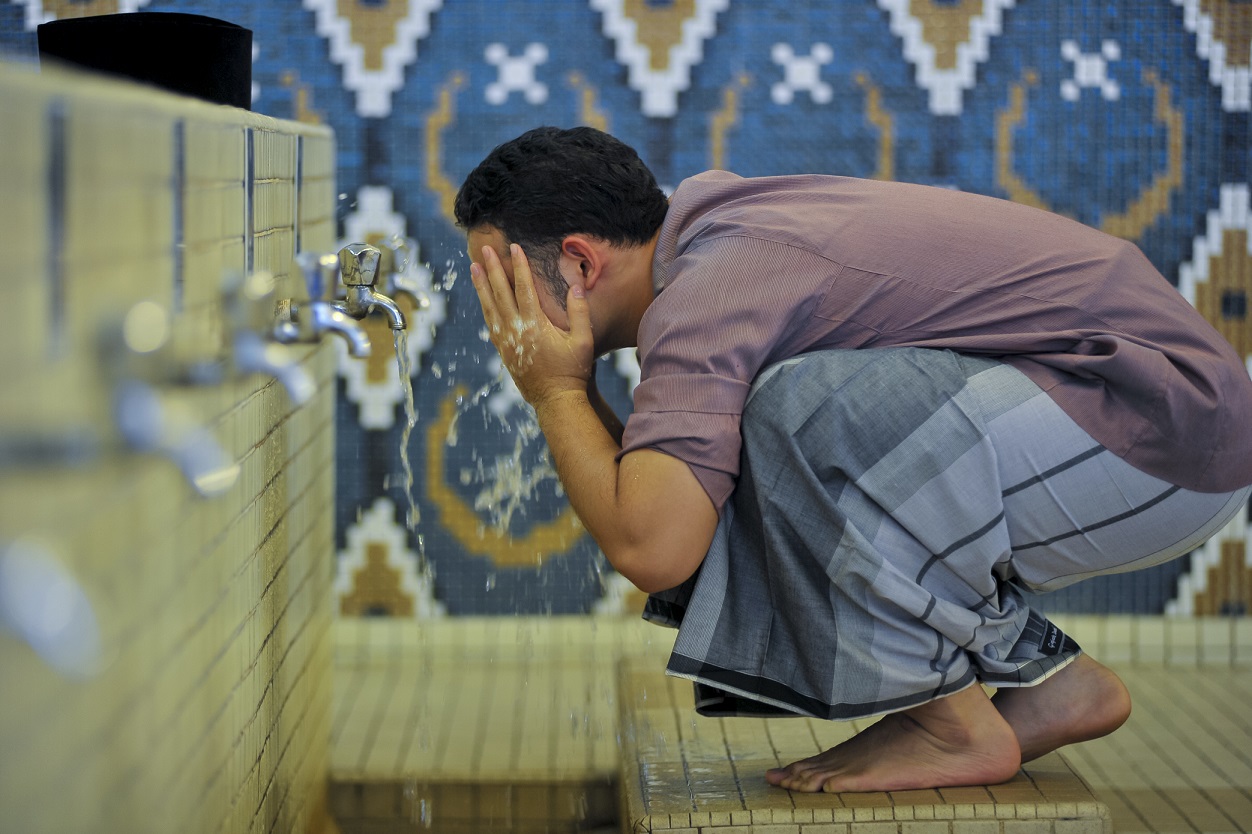
CONDITIONS OF TAWAF
Like all acts of worship, tawaf has certain conditions that need to be fulfilled in order for it to be valid.
1. Islam
This is mandatory for every act of worship.
وَمَن يَبْتَغِ غَيْرَ الْإِسْلَامِ دِينًا فَلَن يُقْبَلَ مِنْهُ وَهُوَ فِي الْآخِرَةِ مِنَ الْخَاسِرِينَ
“And whoever seeks a religion other than Islam, it will never be accepted of him, and in the Hereafter he will be one of the losers.” [Surah Aal-Imraan (3) : 85]
2. Sanity
An insane person is not held accountable for their actions.
عَنْ عَائِشَةَ، أَنَّ رَسُولَ اللَّهِ ـ صلى الله عليه وسلم ـ قَالَ : رُفِعَ الْقَلَمُ عَنْ ثَلاَثَةٍ عَنِ النَّائِمِ حَتَّى يَسْتَيْقِظَ وَعَنِ الصَّغِيرِ حَتَّى يَكْبَرَ وَعَنِ الْمَجْنُونِ حَتَّى يَعْقِلَ أَوْ يُفِيقَ
It was narrated from Aishah (radiallahu anha) that the Messenger of Allah (sallallahu alaihi wasallam) said. “The Pen has been lifted from three: from the sleeping person until he awakens, from the minor until he grows up, and from the insane person until he comes to his senses.” [Sunan Ibn Majah, Hadeeth No. 2041. Graded “sahih” (authentic) by Al-Albani.]
3. Intention
The intention is in the heart and is never uttered aloud.
عن عُمَرَ بْنَ الْخَطَّابِ ـ رضى الله عنه قَالَ سَمِعْتُ رَسُولَ اللَّهِ صلى الله عليه وسلم يَقُولُ :إِنَّمَا الأَعْمَالُ بِالنِّيَّاتِ، وَإِنَّمَا لِكُلِّ امْرِئٍ مَا نَوَى، فَمَنْ كَانَتْ هِجْرَتُهُ إِلَى دُنْيَا يُصِيبُهَا أَوْ إِلَى امْرَأَةٍ يَنْكِحُهَا فَهِجْرَتُهُ إِلَى مَا هَاجَرَ إِلَيْهِ
Umar ibn Al-Khattab (radiallahu anhu) narrated: I heard Allah’s Messenger (sallallahu alaihi wasallam) saying, “The reward of deeds depends upon the intentions and every person will get the reward according to what he has intended. So whoever emigrated for worldly benefits or for a woman to marry, his emigration was for what he emigrated for.” [Sahih Al-Bukhari, Volume 1, Hadeeth No. 1]
Shaikh Muhammad Ibn Abdul Wahhaab Al-Wassabi (from Yemen, not the Saudi one), in his book Manasik Al-Hajj wal-Umrah states that it is with the intention of the Tawaf of Hajj (i.e. Tawaf Al-Ifaadhah) if it is for Hajj, or with the intention of the Tawaf of Umrah, if it is for Umrah, or with the intention of Tawaf of (fulfilling) an oath if it was for an oath, or with the intention of a voluntary Tawaf if it is voluntary.
Please note that there is also Tawaf Al-Widaa (the Farewell Tawaf) which the Shaikh did not mention.
4. Taharah (purity)
One needs to be free of major and minor impurity in order to tawaf. Therefore, menstruating women and those in post-natal bleeding cannot do tawaf (although they can assume ihram as mentioned earlier in the series in Part 5).
عَنْ عَائِشَةَ، قَالَتْ حِضْتُ فَأَمَرَنِي رَسُولُ اللَّهِ صلى الله عليه وسلم أَنْ أَقْضِيَ الْمَنَاسِكَ كُلَّهَا إِلاَّ الطَّوَافَ بِالْبَيْتِ
Aishah (radiallahu anha) narrated: “I got my menses so the Prophet (sallallahu alaihi wasallam) ordered me to carry out all the rites except for Tawaf around the House.” [Jaami At-Tirmidhi, Hadeeth No. 945. For some reason, there are two ahadeeth numbered 945. This is the first one. Graded “sahih” (authentic) by Al-Albani.]
عَنِ ابْنِ عَبَّاسٍ، رَفَعَ الْحَدِيثَ إِلَى رَسُولِ اللَّهِ صلى الله عليه وسلم : أَنَّ النُّفَسَاءَ وَالْحَائِضَ تَغْتَسِلُ وَتُحْرِمُ وَتَقْضِي الْمَنَاسِكَ كُلَّهَا غَيْرَ أَنْ لاَ تَطُوفَ بِالْبَيْتِ حَتَّى تَطْهُرَ
عَنْ مُحَمَّدِ بْنِ عَبْدِ الرَّحْمَنِ بْنِ نَوْفَلٍ الْقُرَشِيِّ، أَنَّهُ سَأَلَ عُرْوَةَ بْنَ الزُّبَيْرِ فَقَالَ قَدْ حَجَّ النَّبِيُّ صلى الله عليه وسلم فَأَخْبَرَتْنِي عَائِشَةُ ـ رضى الله عنها ـ أَنَّهُ أَوَّلُ شَىْءٍ بَدَأَ بِهِ حِينَ قَدِمَ أَنَّهُ تَوَضَّأَ ثُمَّ طَافَ بِالْبَيْتِ ثُمَّ لَمْ تَكُنْ عُمْرَةً، ثُمَّ حَجَّ أَبُو بَكْرٍ ـ رضى الله عنه ـ فَكَانَ أَوَّلَ شَىْءٍ بَدَأَ بِهِ الطَّوَافُ بِالْبَيْتِ ثُمَّ لَمْ تَكُنْ عُمْرَةً. ثُمَّ عُمَرُ ـ رضى الله عنه ـ مِثْلُ ذَلِكَ. ثُمَّ حَجَّ عُثْمَانُ ـ رضى الله عنه ـ فَرَأَيْتُهُ أَوَّلُ شَىْءٍ بَدَأَ بِهِ الطَّوَافُ بِالْبَيْتِ ثُمَّ لَمْ تَكُنْ عُمْرَةٌ، ثُمَّ مُعَاوِيَةُ وَعَبْدُ اللَّهِ بْنُ عُمَرَ، ثُمَّ حَجَجْتُ مَعَ أَبِي الزُّبَيْرِ بْنِ الْعَوَّامِ، فَكَانَ أَوَّلَ شَىْءٍ بَدَأَ بِهِ الطَّوَافُ بِالْبَيْتِ، ثُمَّ لَمْ تَكُنْ عُمْرَةٌ، ثُمَّ رَأَيْتُ الْمُهَاجِرِينَ وَالأَنْصَارَ يَفْعَلُونَ ذَلِكَ، ثُمَّ لَمْ تَكُنْ عُمْرَةٌ، ثُمَّ آخِرُ مَنْ رَأَيْتُ فَعَلَ ذَلِكَ ابْنُ عُمَرَ ثُمَّ لَمْ يَنْقُضْهَا عُمْرَةً، وَهَذَا ابْنُ عُمَرَ عِنْدَهُمْ فَلاَ يَسْأَلُونَهُ، وَلاَ أَحَدٌ مِمَّنْ مَضَى، مَا كَانُوا يَبْدَءُونَ بِشَىْءٍ حَتَّى يَضَعُوا أَقْدَامَهُمْ مِنَ الطَّوَافِ بِالْبَيْتِ، ثُمَّ لاَ يَحِلُّونَ، وَقَدْ رَأَيْتُ أُمِّي وَخَالَتِي، حِينَ تَقْدَمَانِ لاَ تَبْتَدِئَانِ بِشَىْءٍ أَوَّلَ مِنَ الْبَيْتِ، تَطُوفَانِ بِهِ، ثُمَّ لاَ تَحِلاَّنِ. وَقَدْ أَخْبَرَتْنِي أُمِّي، أَنَّهَا أَهَلَّتْ هِيَ وَأُخْتُهَا وَالزُّبَيْرُ وَفُلاَنٌ وَفُلاَنٌ بِعُمْرَةٍ، فَلَمَّا مَسَحُوا الرُّكْنَ حَلُّوا
Narrated Muhammad ibn Abdir-Rahman bin Nawfal Al-Qurashi: I asked Urwah bin Az-Zubair (regarding the Hajj of the Prophet (sallallahu alaihi wasallam)). Urwah replied, “Aishah (radiallahu anha) narrated, ‘When the Prophet (sallallahu alaihi wasallam) reached Makkah, the first thing he started with was the ablution, then he performed Tawaf of the Kabah and his intention was not Umrah alone (but Hajj and Umrah together).’ ” Later Abu Bakr performed the Hajj and the first thing he started with was Tawaf of the Kabah and it was not Umrah alone (but Hajj and Umrah together). And then Umar did the same. Then Uthman performed the Hajj and the first thing he started with was Tawaf of the Kabah and it was not Umrah alone. And then Muawiyah and Abdullah ibn Umar did the same. I performed Hajj with Ibn Az-Zubair and the first thing he started with was Tawaf of the Kabah and it was not Umrah alone, (but Hajj and Umrah together). Then I saw the Muhajirin (Emigrants) and Ansar doing the same and it was not Umrah alone. And the last person I saw doing the same was Ibn Umar, and he did not do another Umrah after finishing the first. Now here is Ibn Umar present amongst the people! They neither ask him nor anyone of the previous ones. And all these people, on entering Makkah, would not start with anything unless they had performed Tawaf of the Kabah, and would not finish their Ihram. And no doubt, I saw my mother and my aunt*, on entering Makkah doing nothing before performing Tawaf of the Kabah, and they would not finish their lhram. And my mother informed me that she, her sister, Az-Zubair and such and such persons had assumed lhram for Umrah and after passing their hands over the Corner (the Black Stone) (i.e. finishing their Umrah) they finished their Ihram.” [Sahih Al-Bukhari, Volume 2, Hadeeth No. 705]
(*His mother is Asma bint Abee Bakr and his aunt is Aishah bint Abee Bakr, the wife of the Prophet (sallallahu alaihi wasallam).)
Also, tawaf is similar to prayer.
عَنِ ابْنِ عَبَّاسٍ، أَنَّ النَّبِيَّ صلى الله عليه وسلم قَالَ : الطَّوَافُ حَوْلَ الْبَيْتِ مِثْلُ الصَّلاَةِ إِلاَّ أَنَّكُمْ تَتَكَلَّمُونَ فِيهِ فَمَنْ تَكَلَّمَ فِيهِ فَلاَ يَتَكَلَّمَنَّ إِلاَّ بِخَيْرٍ
Ibn Abbas (radiallahu anhuma) narrated that the Prophet (sallallahu alaihi wasallam) said: “Tawaf around the House is similar to prayer except that you can talk during it. So whoever talks in it, then let him not say anything but good.” [Jaami At-Tirmidhi, Hadeeth No. 960. Graded “sahih” (authentic) by Al-Albani.]
Prayer is not accepted without wudhu.
عَنْ أَنَسِ بْنِ مَالِكٍ، قَالَ سَمِعْتُ رَسُولَ اللَّهِ ـ صلى الله عليه وسلم ـ يَقُولُ : لاَ يَقْبَلُ اللَّهُ صَلاَةً بِغَيْرِ طُهُورٍ وَلاَ يَقْبَلُ صَدَقَةً مِنْ غُلُولٍ
It was narrated that Anas bin Malik (radiallahu anhu) said: “I heard the Messenger of Allah (sallallahu alaihi wasallam) say: ‘Allah does not accept any prayer without purification, and He does not accept any charity from Ghulul (goods stolen from the spoils of war prior to distribution).'” [Sunan Ibn Majah, Hadeeth No. 273. Graded “sahih” (authentic) by Al-Albani.]
عَنْ أَبِي هُرَيْرَةَ، عَنِ النَّبِيِّ صلى الله عليه وسلم قَالَ : لاَ يَقْبَلُ اللَّهُ صَلاَةَ أَحَدِكُمْ إِذَا أَحْدَثَ حَتَّى يَتَوَضَّأَ
Narrated Abu Hurairah (sallallahu alaihi wasallam): The Prophet (sallallahu alaihi wasallam) said, “Allah does not accept prayer of anyone of you if he does Hadath (passes wind) till he performs the ablution (anew). [Sahih Al-Bukhari, Volume 9, Hadeeth No. 86]
5. Covering the awrah (private parts)
As mentioned earlier, the pagans used to do tawaf around the Kabah naked. The following verse was revealed regarding this:
يَا بَنِي آدَمَ خُذُوا زِينَتَكُمْ عِندَ كُلِّ مَسْجِدٍ وَكُلُوا وَاشْرَبُوا وَلَا تُسْرِفُوا ۚ إِنَّهُ لَا يُحِبُّ الْمُسْرِفِينَ
O Children of Adam! Take your adornment (by wearing your clean clothes), while praying and going round (the Tawaf of) the Kabah, and eat and drink but waste not by extravagance, certainly He (Allah) likes not Al-Musrifun (those who waste by extravagance). [Surah Al-Araaf (7) : 31]
عَنْ هِشَامِ بْنِ عُرْوَةَ، قَالَ عُرْوَةُ كَانَ النَّاسُ يَطُوفُونَ فِي الْجَاهِلِيَّةِ عُرَاةً إِلاَّ الْحُمْسَ، وَالْحُمْسُ قُرَيْشٌ وَمَا وَلَدَتْ، وَكَانَتِ الْحُمْسُ يَحْتَسِبُونَ عَلَى النَّاسِ يُعْطِي الرَّجُلُ الرَّجُلَ الثِّيَابَ يَطُوفُ فِيهَا، وَتُعْطِي الْمَرْأَةُ الْمَرْأَةَ الثِّيَابَ تَطُوفُ فِيهَا، فَمَنْ لَمْ يُعْطِهِ الْحُمْسُ طَافَ بِالْبَيْتِ عُرْيَانًا، وَكَانَ يُفِيضُ جَمَاعَةُ النَّاسِ مِنْ عَرَفَاتٍ، وَيُفِيضُ الْحُمْسُ مِنْ جَمْعٍ. قَالَ وَأَخْبَرَنِي أَبِي عَنْ عَائِشَةَ ـ رضى الله عنها ـ أَنَّ هَذِهِ الآيَةَ نَزَلَتْ فِي الْحُمْسِ {ثُمَّ أَفِيضُوا مِنْ حَيْثُ أَفَاضَ النَّاسُ} قَالَ كَانُوا يُفِيضُونَ مِنْ جَمْعٍ فَدُفِعُوا إِلَى عَرَفَاتٍ
Hisham ibn Urwah narrated that Urwah said: During the Pre-Islamic period of Ignorance, the people used to perform Tawaf of the Kabah naked except the Hums; and the Hums were Quraish and their offspring. The Hums used to give clothes to the men who would perform the Tawaf wearing them; and women (of the Hums) used to give clothes to the women who would perform the Tawaf wearing them. Those to whom the Hums did not give clothes would perform Tawaf round the Kabah naked. Most of the people used to go away (disperse) directly from Arafah but they (Hums) used to depart after staying at Al-Muzdalifah. Hisham added, “My father narrated that Aishah (radiallahu anha) had said, ‘The following verses were revealed about the Hums:
ثُمَّ أَفِيضُوا مِنْ حَيْثُ أَفَاضَ النَّاسُ
Then depart from the place whence all the people depart. [Surah Al-Baqarah (2) : 199]
Urwah added, “They (the Hums) used to stay at Al-Muzdalifa and used to depart from there (to Mina) and so they were sent to Arafah (by Allah’s order).” [Sahih Al-Bukhari, Volume 2, Hadeeth No. 726]
عَنِ ابْنِ عَبَّاسٍ، قَالَ كَانَتِ الْمَرْأَةُ تَطُوفُ بِالْبَيْتِ وَهِيَ عُرْيَانَةٌ فَتَقُولُ مَنْ يُعِيرُنِي تِطْوَافًا تَجْعَلُهُ عَلَى فَرْجِهَا وَتَقُولُ الْيَوْمَ يَبْدُو بَعْضُهُ أَوْ كُلُّهُ فَمَا بَدَا مِنْهُ فَلاَ أُحِلُّهُ فَنَزَلَتْ هَذِهِ الآيَةَ { خُذُوا زِينَتَكُمْ عِنْدَ كُلِّ مَسْجِدٍ}
Ibn Abbas (radiallahu anhuma) reported: During the pre-Islamic days women circumambulated the Kabah naked, and said: Who would provide cloth to cover the one who is circumambulating the Kabah so that she would cover her private parts? And then she would say: Today will be exposed the whole or the part and what is exposed I shall not make it lawful. It was in this connection that the verse was revealed:
يَا بَنِي آدَمَ خُذُوا زِينَتَكُمْ عِندَ كُلِّ مَسْجِدٍ وَكُلُوا وَاشْرَبُوا وَلَا تُسْرِفُوا ۚ إِنَّهُ لَا يُحِبُّ الْمُسْرِفِينَ
Take your adornment (by wearing your clean clothes), while praying and going round (the Tawaf of) the Kabah. [Surah Al-Araaf (7) : 31]
[Sahih Muslim, Hadeeth No. 7179]
Ibn Kathir states in his explanation of this verse:
“This honorable Ayah refutes the idolators’ practice of performing Tawaf around the Sacred House while naked. Muslim, An-Nasai and Ibn Jarir, (the following wording is that of Ibn Jarir) recorded that Shubah said that Salamah bin Kuhayl said that Muslim Al-Batin said that Said bin Jubayr said that Ibn Abbas said, “The idolators used to go around the House while naked, both men and women, men in the day and women by night. The woman would say, “Today, a part or all of it will be unveiled, but whatever is exposed of it, I do not allow.” Allah said in reply,
﴿خُذُواْ زِينَتَكُمْ عِندَ كُلِّ مَسْجِدٍ﴾
(Take your adornment to every Masjid,) Al-Awfi said that Ibn Abbas commented on:
﴿خُذُواْ زِينَتَكُمْ عِندَ كُلِّ مَسْجِدٍ﴾
(Take your adornment to every Masjid) “There were people who used to perform Tawaf around the House while naked, and Allah ordered them to take adornment, meaning, wear clean, proper clothes that cover the private parts. people were commanded to wear their best clothes when performing every prayer.” Mujahid, Ata, Ibrahim An-Nakhai, Said bin Jubayr, Qatadah, As-Suddi, Ad-Dahhak and Malik narrated a similar saying from Az-Zuhri, and from several of the Salaf. They said that this Ayah was revealed about the idolators who used to perform Tawaf around the House while naked. This Ayah (7:31), as well as the Sunnah, encourage wearing the best clothes when praying, especially for Friday and Id prayers. It is also recommended (for men) to wear perfume for prayer, because it is adornment, and to use Siwak for it is part of what completes adornment. The best color for clothes is white, for Imam Ahmad narrated that Ibn Abbas said that the Messenger of Allah said,
«الْبَسُوا مِنْ ثِيَابِكُمُ الْبَيَاضَ فَإِنَّهَا مِنْ خَيْرِ ثِيَابِكُمْ، وَكَفِّنُوا فِيهَا مَوْتَاكُمْ وَإِنَّ خَيْرَ أَكْحَالِكُمُ الْإثْمَدُ فَإِنَّهُ يَجْلُو الْبَصَرَ وَيُنْبِتُ الشَّعَر»
(Wear white clothes, for it is among your best clothes, and also wrap your dead with it. And Ithmid (antimony) is among the best of your Kohl, for it clears the sight and helps the hair grow.) This Hadith has a sound chain of narration, consisting of narrators who conform to the conditions and guidelines of Imam Muslim. Abu Dawud, At-Tirmidhi and Ibn Majah also recorded it, and At-Tirmidhi said, “Hasan Sahih.””
The Prophet (sallallahu alaihi wasallam) also sent a messenger to announce that doing tawaf around the Kabah naked was prohibited.
عن أَبَي هُرَيْرَةَ، قَالَ بَعَثَنِي أَبُو بَكْرٍ فِي تِلْكَ الْحَجَّةِ فِي مُؤَذِّنِينَ يَوْمَ النَّحْرِ نُؤَذِّنُ بِمِنًى أَنْ لاَ يَحُجَّ بَعْدَ الْعَامِ مُشْرِكٌ، وَلاَ يَطُوفَ بِالْبَيْتِ عُرْيَانٌ. قَالَ حُمَيْدُ بْنُ عَبْدِ الرَّحْمَنِ ثُمَّ أَرْدَفَ رَسُولُ اللَّهِ صلى الله عليه وسلم عَلِيًّا، فَأَمَرَهُ أَنْ يُؤَذِّنَ بِبَرَاءَةَ قَالَ أَبُو هُرَيْرَةَ فَأَذَّنَ مَعَنَا عَلِيٌّ فِي أَهْلِ مِنًى يَوْمَ النَّحْرِ لاَ يَحُجُّ بَعْدَ الْعَامِ مُشْرِكٌ، وَلاَ يَطُوفُ بِالْبَيْتِ عُرْيَانٌ
Narrated Abu Hurairah (radiallahu anhu): On the Day of Nahr (10th of Dhul-Hijjah, in the year prior to the last Hajj of the Prophet (sallallahu alaihi wasallam) when Abu Bakr was the leader of the pilgrims in that Hajj) Abu Bakr sent me along with other announcers to Mina to make a public announcement: “No pagan is allowed to perform Hajj after this year and no naked person is allowed to perform the Tawaf around the Kabah. Then Allah’s Messenger (sallallahu alaihi wasallam) sent Ali to read out the Surat Baraa (At-Taubah) to the people; so he made the announcement along with us on the day of Nahr in Mina: “No pagan is allowed to perform Hajj after this year and no naked person is allowed to perform the Tawaf around the Kabah.” [Sahih Al-Bukhari, Volume 1, Hadeeth No. 365]
6. Completing seven rounds around the Kabah
One tawaf entails seven rounds around the Kabah.
عَنْ عَمْرِو بْنِ دِينَارٍ، قَالَ سَأَلْنَا ابْنَ عُمَرَ ـ رضى الله عنه ـ عَنْ رَجُلٍ، طَافَ بِالْبَيْتِ فِي عُمْرَةٍ، وَلَمْ يَطُفْ بَيْنَ الصَّفَا وَالْمَرْوَةِ أَيَأْتِي امْرَأَتَهُ فَقَالَ قَدِمَ النَّبِيُّ صلى الله عليه وسلم فَطَافَ بِالْبَيْتِ سَبْعًا، وَصَلَّى خَلْفَ الْمَقَامِ رَكْعَتَيْنِ، فَطَافَ بَيْنَ الصَّفَا وَالْمَرْوَةِ سَبْعًا {لَقَدْ كَانَ لَكُمْ فِي رَسُولِ اللَّهِ أُسْوَةٌ حَسَنَةٌ}. وَسَأَلْنَا جَابِرَ بْنَ عَبْدِ اللَّهِ ـ رضى الله عنهما ـ فَقَالَ لاَ يَقْرَبَنَّهَا حَتَّى يَطُوفَ بَيْنَ الصَّفَا وَالْمَرْوَةِ
Narrated Amr ibn Dinar: We asked Ibn Umar (radiallahu anhuma) whether a man who, while performing Umrah, had performed Tawaf of the Kabah; and had not yet performed Tawaf between Safa and Marwah, could have sexual relation with his wife, Ibn Umar replied “The Prophet (salallahu alaihi wasallam) reached Makkah and performed the seven rounds (of Tawaf) of the Kabah and then offered a two rakah prayer behind Maqam Ibrahim and then performed the seven rounds (of Tawaf) between Safa and Marwah.” He added, “Verily! In Allah’s Messenger (sallallahu alaihi wasallam) you have a good example.” We asked Jabir ibn Abdullah (radiallahu anhuma) (the same question) and he said, “He (that man) should not come near (his wife) till he has completed Tawaf between Safa and Marwah.” [Sahih Al-Bukhari, Volume 2, Hadeeth No. 708]
7. Doing Tawaf counterclockwise
When doing tawaf, one needs to keep the Kabah on one’s left side.
عَنْ جَابِرِ بْنِ عَبْدِ اللَّهِ، – رضى الله عنهما – أَنَّ رَسُولَ اللَّهِ صلى الله عليه وسلم لَمَّا قَدِمَ مَكَّةَ أَتَى الْحَجَرَ فَاسْتَلَمَهُ ثُمَّ مَشَى عَلَى يَمِينِهِ فَرَمَلَ ثَلاَثًا وَمَشَى أَرْبَعًا
Jabir ibn Abdullah (radiallahu anhuma) reported that when Allah’s Messenger (sallallahu alaihi wasallam) proceeded to Makkah, he came to it (the Black Stone), he kissed it, and then walked on its right and moved quickly in three circuits, and walked in four circuits. [Sahih Muslim, Hadeeth No. 2806]
8. Tawaf outside the Kabah and beyond the Hijr
Tawaf needs to be done outside the Kabah (i.e. as one needs to go around the whole House).
ثُمَّ لْيَقْضُوا تَفَثَهُمْ وَلْيُوفُوا نُذُورَهُمْ وَلْيَطَّوَّفُوا بِالْبَيْتِ الْعَتِيقِ
Then let them complete the prescribed duties (Manasik of Hajj) for them, and perform their vows, and circumambulate the Ancient House (the Kabah at Makkah). [Surah Al-Hajj (22) : 29]
So, one should walk around the Hijr as it is part of the Kabah.
عَنْ عَائِشَةَ، أَنَّهَا قَالَتْ كُنْتُ أُحِبُّ أَنْ أَدْخُلَ الْبَيْتَ فَأُصَلِّيَ فِيهِ فَأَخَذَ رَسُولُ اللَّهِ صلى الله عليه وسلم بِيَدِي فَأَدْخَلَنِي فِي الْحِجْرِ فَقَالَ : صَلِّي فِي الْحِجْرِ إِذَا أَرَدْتِ دُخُولَ الْبَيْتِ فَإِنَّمَا هُوَ قِطْعَةٌ مِنَ الْبَيْتِ فَإِنَّ قَوْمَكِ اقْتَصَرُوا حِينَ بَنَوُا الْكَعْبَةَ فَأَخْرَجُوهُ مِنَ الْبَيْتِ
Narrated Aishah (radiallahu anha), Ummul Mumineen: I liked to enter the House (the Kabah) and pray therein. The Messenger of Allah (sallallahu alaihi wasallam) caught me by hand and admitted me to Al-Hijr. He then said: Pray in ِAl-Hijr when you intend to enter the House (the Kabah), for it is a part of the House (the Kabah). Your people shortened it when they built the Kabah, and they took it out of the House. [Sunan Abee Dawood, Hadeeth No. 2028. Graded “hasan sahih” (authentic) by Al-Albani.]
9. No unnecessary breaks whilst doing Tawaf
Each round needs to be done one after the other. One may stop for an obligatory prayer and the like but he needs to restart from the place where he stopped.
One may refer to this article for more information.
10. Tawaf within Masjid Al-Haram itself
One should not to tawaf outside the masjid.
Shaykh Ibn Uthaimeen (rahimahullah) stated:
“The scholars said: In order for tawaf to be valid, it is stipulated that it should be within the confines of al-Masjid al-Haraam; if someone does tawaf outside the mosque, then it is not valid. If someone wants to go around al-Masjid al-Haraam from the outside, then it is not valid, because in that case he will have circumambulated the mosque, not the Ka‘bah. As for those who do tawaf inside the mosque itself, whether on the upper or lower floors, their tawaf is valid. Based on that, one should avoid doing tawaf in the Mas‘aa or on its roof, because the Mas‘aa is not part of the mosque.”
11. Beginning and ending each round at the Black stone
One round starts and ends at the Black stone because the Prophet (sallallahu alaihi wasallam) started his tawaf from the black stone.
عَنِ ابْنِ عَبَّاسٍ، أَنَّ النَّبِيَّ صلى الله عليه وسلم اضْطَبَعَ فَاسْتَلَمَ وَكَبَّرَ ثُمَّ رَمَلَ ثَلاَثَةَ أَطْوَافٍ وَكَانُوا إِذَا بَلَغُوا الرُّكْنَ الْيَمَانِيَ وَتَغَيَّبُوا مِنْ قُرَيْشٍ مَشَوْا ثُمَّ يَطْلُعُونَ عَلَيْهِمْ يَرْمُلُونَ تَقُولُ قُرَيْشٌ كَأَنَّهُمُ الْغِزْلاَنُ قَالَ ابْنُ عَبَّاسٍ فَكَانَتْ سُنَّةً
Narrated Abdullah ibn Abbas (radiallahu anhuma): The Prophet (sallallahu alaihi wasallam) wore the mantle under his right armpit with the end over his left shoulder, and touched the corner (Black Stone), then uttered “Allah is most great” and walked proudly in three circuits of circumambulation. When they (the Companions) reached the Yemeni corner, and disappeared from the eyes of the Quraish, they walked as usual; When they appeared before them, they walked proudly with rapid strides. Thereupon the Quraysh said: They look to be the deer (that are jumping). Ibn Abbas said: Hence this became the sunnah (model behaviour of the Prophet). [Sunan Abee Dawood, Hadeeth No. 1889. Graded “sahih” (authentic) by Al-Albani.]
Please refer to this article for more information on the conditions of tawaf.
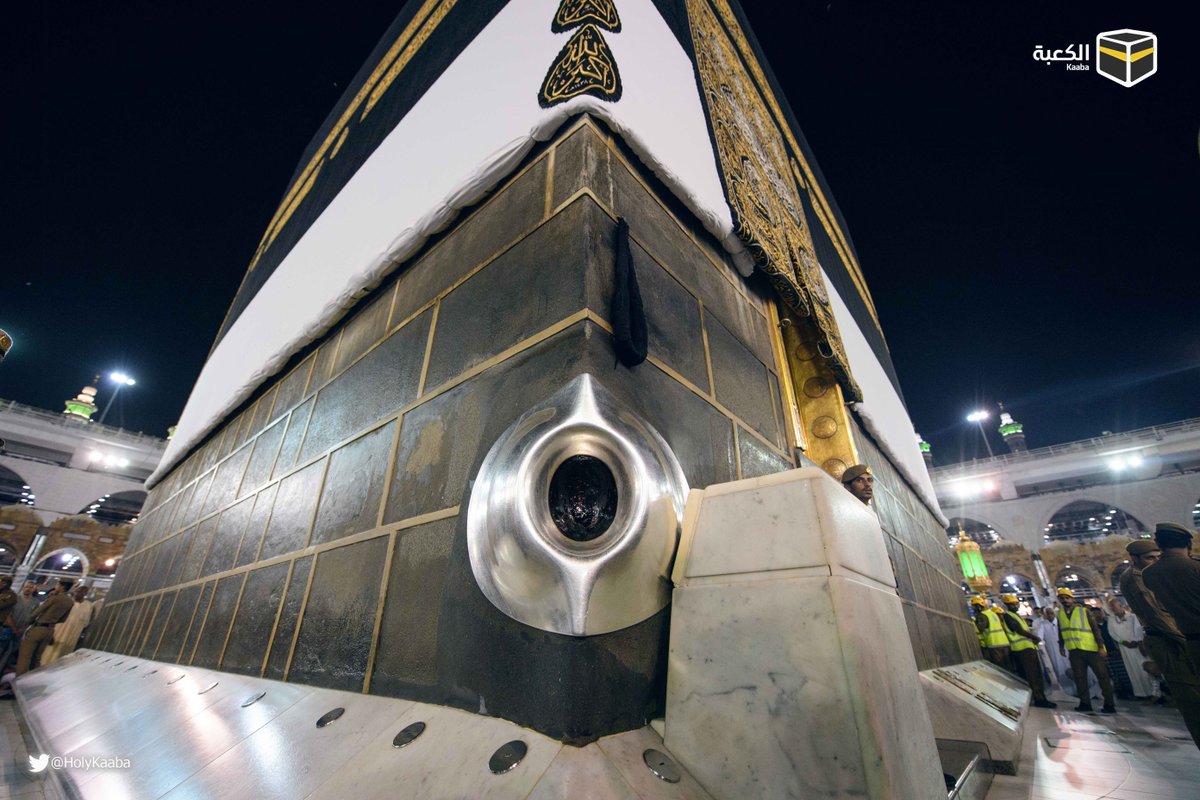
HOW TO DO TAWAF
One tawaf consists of 7 rounds. Each round starts and ends at the Black stone (go counterclockwise).
عَنْ عَمْرِو بْنِ دِينَارٍ قَالَ سَمِعْتُ ابْنَ عُمَرَ ـ رضى الله عنهما ـ يَقُولُ قَدِمَ النَّبِيُّ صلى الله عليه وسلم فَطَافَ بِالْبَيْتِ سَبْعًا وَصَلَّى خَلْفَ الْمَقَامِ رَكْعَتَيْنِ، ثُمَّ خَرَجَ إِلَى الصَّفَا، وَقَدْ قَالَ اللَّهُ تَعَالَى {لَقَدْ كَانَ لَكُمْ فِي رَسُولِ اللَّهِ أُسْوَةٌ حَسَنَةٌ}
Narrated Ibn Umar (radiallahu anhuma): The Prophet (sallallahu alaihi wasallam) reached Makkah, circumambulated the Kabah seven times and then offered a two rakah prayer behind Maqam Ibrahim. Then he went towards the Safa. Allah, the Most High, has said,
لَّقَدْ كَانَ لَكُمْ فِي رَسُولِ اللَّـهِ أُسْوَةٌ حَسَنَةٌ
“Indeed in the Messenger of Allah (Muhammad) you have a good example.” [Surah Al-Ahzab (33) : 21]
[Sahih Al-Bukhari, Volume 2, Hadeeth No. 693]
عَنْ إِسْمَاعِيل بْن أَبِي خَالِدٍ، عَنْ عَبْدِ اللَّهِ بْنِ أَبِي أَوْفَى، قَالَ اعْتَمَرَ رَسُولُ اللَّهِ صلى الله عليه وسلم فَطَافَ بِالْبَيْتِ وَصَلَّى خَلْفَ الْمَقَامِ رَكْعَتَيْنِ، وَمَعَهُ مَنْ يَسْتُرُهُ مِنَ النَّاسِ فَقَالَ لَهُ رَجُلٌ أَدَخَلَ رَسُولُ اللَّهِ صلى الله عليه وسلم الْكَعْبَةَ قَالَ لاَ
Narrated Ismail bin Abee Khalid: Abdullah bin Abu Aufa (radiallahu anhu) said, “Allah’s Messenger (sallallahu alaihi wasallam) performed the Umrah. He performed Tawaf of the Kabah and offered two rakah behind the Maqam (of Ibrahim) and was accompanied by those who were screening him from the people.” Somebody asked Abdullah, “Did Allah’s Messenger (sallallahu alaihi wasallam) enter the Kabah?” Abdullah replied in the negative. [Sahih Al-Bukhari, Volume 2, Hadeeth No. 670]
The following diagram will help one visualise tawaf better:

This is what doing Tawaf feels like:
Please remember that some of thefollowing steps are obligatory whilst others are recommended.
1. Make sure that you are in a state of wudhu (ablution)
The Prophet (sallallahu alaihi wasallam) did wudhu (ablution) before his tawaf.
عَنْ مُحَمَّدِ بْنِ عَبْدِ الرَّحْمَنِ بْنِ نَوْفَلٍ الْقُرَشِيِّ، أَنَّهُ سَأَلَ عُرْوَةَ بْنَ الزُّبَيْرِ فَقَالَ قَدْ حَجَّ النَّبِيُّ صلى الله عليه وسلم فَأَخْبَرَتْنِي عَائِشَةُ ـ رضى الله عنها ـ أَنَّهُ أَوَّلُ شَىْءٍ بَدَأَ بِهِ حِينَ قَدِمَ أَنَّهُ تَوَضَّأَ ثُمَّ طَافَ بِالْبَيْتِ ثُمَّ لَمْ تَكُنْ عُمْرَةً، ثُمَّ حَجَّ أَبُو بَكْرٍ ـ رضى الله عنه ـ فَكَانَ أَوَّلَ شَىْءٍ بَدَأَ بِهِ الطَّوَافُ بِالْبَيْتِ ثُمَّ لَمْ تَكُنْ عُمْرَةً. ثُمَّ عُمَرُ ـ رضى الله عنه ـ مِثْلُ ذَلِكَ. ثُمَّ حَجَّ عُثْمَانُ ـ رضى الله عنه ـ فَرَأَيْتُهُ أَوَّلُ شَىْءٍ بَدَأَ بِهِ الطَّوَافُ بِالْبَيْتِ ثُمَّ لَمْ تَكُنْ عُمْرَةٌ، ثُمَّ مُعَاوِيَةُ وَعَبْدُ اللَّهِ بْنُ عُمَرَ، ثُمَّ حَجَجْتُ مَعَ أَبِي الزُّبَيْرِ بْنِ الْعَوَّامِ، فَكَانَ أَوَّلَ شَىْءٍ بَدَأَ بِهِ الطَّوَافُ بِالْبَيْتِ، ثُمَّ لَمْ تَكُنْ عُمْرَةٌ، ثُمَّ رَأَيْتُ الْمُهَاجِرِينَ وَالأَنْصَارَ يَفْعَلُونَ ذَلِكَ، ثُمَّ لَمْ تَكُنْ عُمْرَةٌ، ثُمَّ آخِرُ مَنْ رَأَيْتُ فَعَلَ ذَلِكَ ابْنُ عُمَرَ ثُمَّ لَمْ يَنْقُضْهَا عُمْرَةً، وَهَذَا ابْنُ عُمَرَ عِنْدَهُمْ فَلاَ يَسْأَلُونَهُ، وَلاَ أَحَدٌ مِمَّنْ مَضَى، مَا كَانُوا يَبْدَءُونَ بِشَىْءٍ حَتَّى يَضَعُوا أَقْدَامَهُمْ مِنَ الطَّوَافِ بِالْبَيْتِ، ثُمَّ لاَ يَحِلُّونَ، وَقَدْ رَأَيْتُ أُمِّي وَخَالَتِي، حِينَ تَقْدَمَانِ لاَ تَبْتَدِئَانِ بِشَىْءٍ أَوَّلَ مِنَ الْبَيْتِ، تَطُوفَانِ بِهِ، ثُمَّ لاَ تَحِلاَّنِ. وَقَدْ أَخْبَرَتْنِي أُمِّي، أَنَّهَا أَهَلَّتْ هِيَ وَأُخْتُهَا وَالزُّبَيْرُ وَفُلاَنٌ وَفُلاَنٌ بِعُمْرَةٍ، فَلَمَّا مَسَحُوا الرُّكْنَ حَلُّوا
Narrated Muhammad ibn Abdir-Rahman bin Nawfal Al-Qurashi: I asked Urwah bin Az-Zubair (regarding the Hajj of the Prophet (sallallahu alaihi wasallam)). Urwah replied, “Aishah (radiallahu anha) narrated, ‘When the Prophet (sallallahu alaihi wasallam) reached Makkah, the first thing he started with was the ablution, then he performed Tawaf of the Kabah and his intention was not Umrah alone (but Hajj and Umrah together).’ ” Later Abu Bakr performed the Hajj and the first thing he started with was Tawaf of the Kabah and it was not Umrah alone (but Hajj and Umrah together). And then Umar did the same. Then Uthman performed the Hajj and the first thing he started with was Tawaf of the Kabah and it was not Umrah alone. And then Muawiyah and Abdullah ibn Umar did the same. I performed Hajj with Ibn Az-Zubair and the first thing he started with was Tawaf of the Kabah and it was not Umrah alone, (but Hajj and Umrah together). Then I saw the Muhajirin (Emigrants) and Ansar doing the same and it was not Umrah alone. And the last person I saw doing the same was Ibn Umar, and he did not do another Umrah after finishing the first. Now here is Ibn Umar present amongst the people! They neither ask him nor anyone of the previous ones. And all these people, on entering Makkah, would not start with anything unless they had performed Tawaf of the Kabah, and would not finish their Ihram. And no doubt, I saw my mother and my aunt*, on entering Makkah doing nothing before performing Tawaf of the Kabah, and they would not finish their lhram. And my mother informed me that she, her sister, Az-Zubair and such and such persons had assumed lhram for Umrah and after passing their hands over the Corner (the Black Stone) (i.e. finishing their Umrah) they finished their Ihram.” [Sahih Al-Bukhari, Volume 2, Hadeeth No. 705]
Please note that the majority of scholars stated that it is obligatory to be in a state of wudhu during tawaf. There is some dispute in this matter (which you can read about here) as some scholars thought it was recommended, not obligatory.
However, it is better to be on the safe side, and make sure that one is in a state of wudhu during the entire tawaf.
Also, even if it just recommended, that is enough reason to do it. Not every act needs to be obligatory for a person to do it. Those who strive to be close to Allah should also do the recommended acts.
2. If doing Umrah, the pilgrim needs to stop reciting the Talbiyah upon the start of Tawaf
عَنِ ابْنِ عَبَّاسٍ، يَرْفَعُ الْحَدِيثَ أَنَّهُ كَانَ يُمْسِكُ عَنِ التَّلْبِيَةِ، فِي الْعُمْرَةِ إِذَا اسْتَلَمَ الْحَجَرَ
Ibn Abbas (radiallahu anhuma) narrated: (that the Prophet (sallallahu alaihi wasallam): “Would stop saying the talbiyah during Umrah when he touched the (Black) Stone.” [Jaami At-Tirmidhi, Hadeeth No. 919. Graded “daif” (weak) by Al-Albani who said it was authentic as a statement of Ibn Abbas (radiallahu anhuma) (but not as a statement of the Prophet (sallallahu alaihi wasallam)).]
3. Go to the Mataf area
This is the white area surrounding the Kabah. The Tawaf done in this area takes the least amount of time as opposed to doing it on an upper floor, for instance.
However, those who suffer from a fear of crowds might want to do tawaf in an upper floor as the mataf area gets completely full at times.
4. Men who are doing the Tawaf of Umrah or Tawaf Al-Qudoom need to uncover their right shoulders for all seven rounds of this Tawaf
عَنِ ابْنِ عَبَّاسٍ، أَنَّ رَسُولَ اللَّهِ صلى الله عليه وسلم وَأَصْحَابَهُ اعْتَمَرُوا مِنَ الْجِعْرَانَةِ فَرَمَلُوا بِالْبَيْتِ وَجَعَلُوا أَرْدِيَتَهُمْ تَحْتَ آبَاطِهِمْ قَدْ قَذَفُوهَا عَلَى عَوَاتِقِهِمُ الْيُسْرَى
Narrated Abdullah ibn Abbas (radiallahu anhuma): The Messenger of Allah (sallallahu alaihi wasallam) and his Companions performed Umrah from al-Jiraanah. They went quickly round the House (the Kabah). They put their upper garments under their armpits and threw the ends over their left shoulders. [Sunan Abee Dawood, Hadeeth No. 1884. Graded “sahih” (authentic) by Al-Albani]
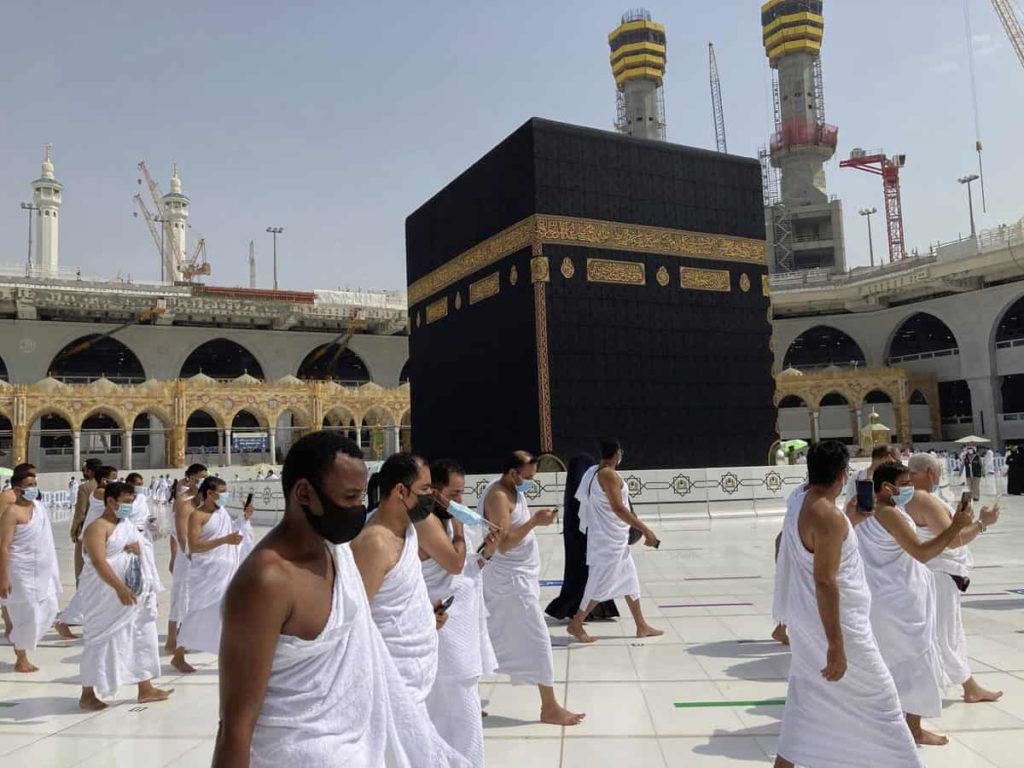
Please note that this is ONLY for the Tawaf of Umrah and Tawaf of Al-Qudoom, not for any of the other types of tawaf.
5. Start at the Black stone
Every round of tawaf starts and ends with the Black stone.
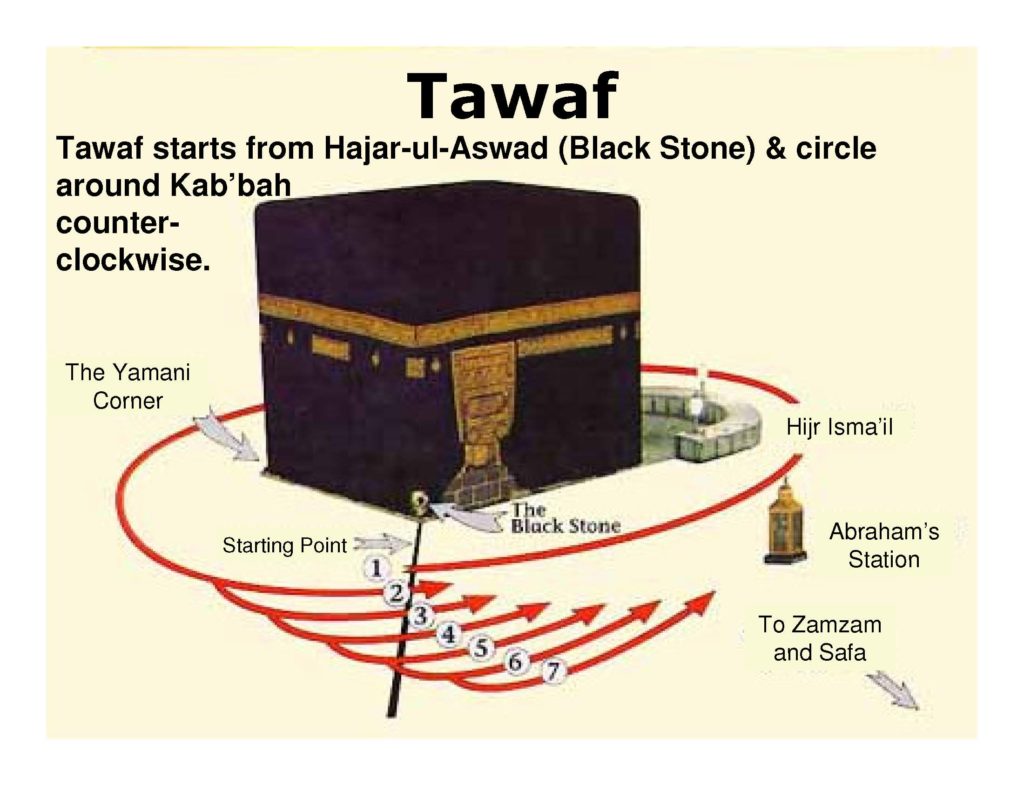 The Prophet (sallallahu alaihi wasallam) always started his tawaf from the black stone.
The Prophet (sallallahu alaihi wasallam) always started his tawaf from the black stone.
عَنْ نَافِعٍ، أَنَّ ابْنَ عُمَرَ ـ رضى الله عنهما ـ كَانَ يَبِيتُ بِذِي طُوًى بَيْنَ الثَّنِيَّتَيْنِ، ثُمَّ يَدْخُلُ مِنَ الثَّنِيَّةِ الَّتِي بِأَعْلَى مَكَّةَ، وَكَانَ إِذَا قَدِمَ مَكَّةَ حَاجًّا أَوْ مُعْتَمِرًا لَمْ يُنِخْ نَاقَتَهُ إِلاَّ عِنْدَ باب الْمَسْجِدِ، ثُمَّ يَدْخُلُ فَيَأْتِي الرُّكْنَ الأَسْوَدَ فَيَبْدَأُ بِهِ، ثُمَّ يَطُوفُ سَبْعًا ثَلاَثًا سَعْيًا، وَأَرْبَعًا مَشْيًا، ثُمَّ يَنْصَرِفُ فَيُصَلِّي سَجْدَتَيْنِ، ثُمَّ يَنْطَلِقُ قَبْلَ أَنْ يَرْجِعَ إِلَى مَنْزِلِهِ، فَيَطُوفُ بَيْنَ الصَّفَا وَالْمَرْوَةِ، وَكَانَ إِذَا صَدَرَ عَنِ الْحَجِّ أَوِ الْعُمْرَةِ أَنَاخَ بِالْبَطْحَاءِ الَّتِي بِذِي الْحُلَيْفَةِ الَّتِي كَانَ النَّبِيُّ صلى الله عليه وسلم يُنِيخُ بِهَا
Narrated Nafi: Ibn Umar (radiallahu anhuma) used to spend the night at Dhi-Tuwa in between the two Thaniyas and then he would enter Makkah through the Thaniya which is at the higher region of Mecca, and whenever he came to Makkah for Hajj or Umrah, he did not make his she camel kneel down except near the gate of the Masjid (Sacred Mosque) and then he would enter (it) and go to the Black (stone) Corner and start from there circumambulating the Kabah seven times: hastening in the first three rounds (Ramal) and walking in the last four. On finishing, he would offer two rakah prayer and set out to perform Tawaf between Safa and Marwah before returning to his dwelling place. On returning (to Madinah) from Hajj or Umrah, he used to make his camel kneel down at Al-Batha which is at Dhul-Hulaifah, the place where the Prophet used to make his camel kneel down. [Sahih Al-Bukhari, Volume 2, Hadeeth No. 820]
For those who are far from the stone, they need to start at a point that is parallel to the Black Stone. This is indicated by green markers in the masjid.
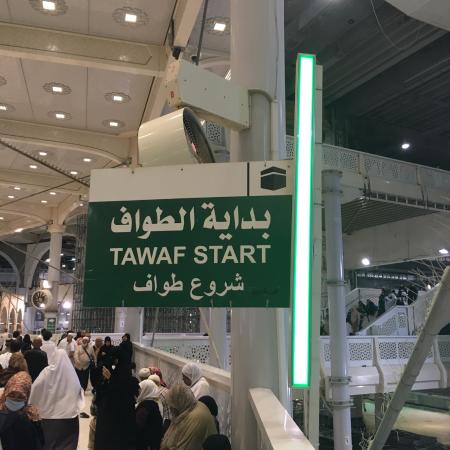
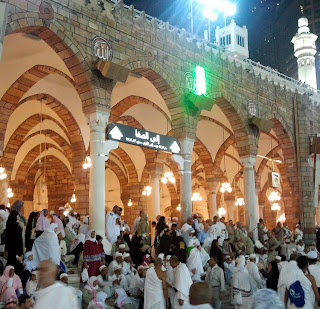
The Prophet (sallallahu alaihi wasallam) began his tawaf by either kissing it or touching it. The following narration mentions the fact that he kissed the stone at the beginning.
عَنْ سَالِمٍ، عَنْ أَبِيهِ ـ رضى الله عنه ـ قَالَ رَأَيْتُ رَسُولَ اللَّهِ صلى الله عليه وسلم حِينَ يَقْدَمُ مَكَّةَ، إِذَا اسْتَلَمَ الرُّكْنَ الأَسْوَدَ أَوَّلَ مَا يَطُوفُ يَخُبُّ ثَلاَثَةَ أَطْوَافٍ مِنَ السَّبْعِ
Narrated Salim that his father (Ibn Umar, radiallahu anhuma) said: I saw Allah’s Messenger (sallallahu alaihi wasallam) arriving at Makkah; he kissed the Black Stone Corner first while doing Tawaf and did ramal (walking rapidly) in the first three rounds of the seven rounds (of Tawaf). [Sahih Al-Bukhari, Volume 2, Hadeeth No. 673]
There is another narration that states he touched the stone at the beginning.
عَنْ جَابِرِ بْنِ عَبْدِ اللَّهِ، – رضى الله عنهما – أَنَّ رَسُولَ اللَّهِ صلى الله عليه وسلم لَمَّا قَدِمَ مَكَّةَ أَتَى الْحَجَرَ فَاسْتَلَمَهُ ثُمَّ مَشَى عَلَى يَمِينِهِ فَرَمَلَ ثَلاَثًا وَمَشَى أَرْبَعًا
Jabir ibn Abdullah (radiallahu anhuma) reported that when Allah’s Messenger (sallallahu alaihi wasallam) proceeded to Makkah, he came to it (the Black Stone), he touched it and moved to his right and moved quickly in three circuits, and walked in four circuits. [Sahih Muslim, Hadeeth No. 2806]
One can also kiss the stone and then prostrate on it i.e. by placing one’s forehead on it as done by Ibn Abbas (radiallahu anhuma).
After touching the stone, one should kiss one’s hand. This is a substitute for the one who is not able to kiss it directly.
عَنْ نَافِعٍ، قَالَ رَأَيْتُ ابْنَ عُمَرَ يَسْتَلِمُ الْحَجَرَ بِيَدِهِ ثُمَّ قَبَّلَ يَدَهُ وَقَالَ مَا تَرَكْتُهُ مُنْذُ رَأَيْتُ رَسُولَ اللَّهِ صلى الله عليه وسلم يَفْعَلُهُ
Nafi reported: I saw lbn Umar (radiallahu anhuma) touching the Stone with his hand and then kissing his hand. and he said: I have never abandoned it since I saw Allah’s Messenger (sallallahu alaihi wasallam) doing it. [Sahih Muslim, Hadeeth No. 2910]
If one uses a staff (i.e. a stick) to touch the stone, they can kiss that staff.
عن أبي الطُّفَيْل يَقُولُ رَأَيْتُ رَسُولَ اللَّهِ صلى الله عليه وسلم يَطُوفُ بِالْبَيْتِ وَيَسْتَلِمُ الرُّكْنَ بِمِحْجَنٍ مَعَهُ وَيُقَبِّلُ الْمِحْجَنَ
Abu Tufail (radiallahu anhu) reported: I saw Allah’s Messenger (sallallahu alaihi wasallam) circumambulating the House and touching the corner with a stick that he had with him, and then kissing the stick. [Sahih Muslim, Hadeeth No. 2921]
If one is far from the Stone, one should just point at it. One is not supposed to kiss their hand (without touching the stone) or send flying kisses towards the Stone (as do many people today!).
عَنِ ابْنِ عَبَّاسٍ ـ رضى الله عنهما ـ أَنَّ رَسُولَ اللَّهِ صلى الله عليه وسلم طَافَ بِالْبَيْتِ، وَهْوَ عَلَى بَعِيرٍ، كُلَّمَا أَتَى عَلَى الرُّكْنِ أَشَارَ إِلَيْهِ بِشَىْءٍ فِي يَدِهِ وَكَبَّرَ
Narrated Ibn Abbas (radiallahu anhuma): Allah’s Messenger (sallallahu alaihi wasallam) performed Tawaf (of the Kabah) riding a camel (at that time the Prophet (sallallahu alaihi wasallam) had a foot injury). Whenever he came to the Corner (having the Black Stone) he would point out towards it with a thing in his hand and say takbeer (i.e. Allahu Akbar). [Sahih Al-Bukhari, Volume 2, Hadeeth No. 697]
When kissing, touching or pointing to the Stone the first time (i.e. at the beginning of Tawaf), one is supposed to say “Bismillah Wallahu Akbar”. There also seems to be something else that can be recited. Please refer to this article for more information.
All subsequent times, only the takbeer (“Allahu Akbar”) is said, as clear from the last hadeeth.
And yes, one can look at the Kabah whilst doing Tawaf.
When kissing, pointing or touching the Black Stone, try to remember that it is a famous stone with an illustrious history – that began in Paradise.
عَنْ رَجَاءٍ أَبِي يَحْيَى، قَالَ سَمِعْتُ مُسَافِعًا الْحَاجِبَ، قَالَ سَمِعْتُ عَبْدَ اللَّهِ بْنَ عَمْرٍو، يَقُولُ سَمِعْتُ رَسُولَ اللَّهِ صلى الله عليه وسلم يَقُولُ : إِنَّ الرُّكْنَ وَالْمَقَامَ يَاقُوتَتَانِ مِنْ يَاقُوتِ الْجَنَّةِ طَمَسَ اللَّهُ نُورَهُمَا وَلَوْ لَمْ يَطْمِسْ نُورَهُمَا لأَضَاءَتَا مَا بَيْنَ الْمَشْرِقِ وَالْمَغْرِبِ
Abdullah bin Amr (radiallahu anhuma) narrated that: He heard the Messenger of Allah (sallallahu alaihi wasallam) saying: “Indeed the Corner and the Maqam are two corundums from the corundum of Paradise. Allah removed their lights, and if their lights had not been removed then they would illuminate what is between east and the west.” [Jaami At-Tirmidhi, Hadeeth No. 878. Graded “sahih” (authentic) by Al-Albani]
(Note: According to the Darussalam translation of Jaami At-Tirmidhi, the Corner mentioned in this hadeeth refers to the Black stone and corundum basically means ruby or sapphire. The Maqam refers to the Maqam Ibrahim which will be discussed shortly.)
عَنِ ابْنِ عَبَّاسٍ، قَالَ قَالَ رَسُولُ اللَّهِ صلى الله عليه وسلم : نَزَلَ الْحَجَرُ الأَسْوَدُ مِنَ الْجَنَّةِ وَهُوَ أَشَدُّ بَيَاضًا مِنَ اللَّبَنِ فَسَوَّدَتْهُ خَطَايَا بَنِي آدَمَ
Ibn Abbas (radiallahu anhuma) narrated that: The Messenger of Allah (sallallahu alaihi wasallam) said: “The Black Stone descended from Paradise, and it was more white than milk, then it was blackened by the sins of the children of Adam.” [Jaami At-Tirmidhi, Hadeeth No. 877. Graded “sahih” (authentic) by Al-Albani.]
Al Muhibb At-Tabari (rahimahullah) had something insightful to say about this:
“The fact that it is black is a lesson for those who have insight. If sins can have this effect on an inanimate rock, then the effect they have on the heart is greater.”
When touching the black stone, one should remember that this acts removes sins.
:عن ابن عمر رضيَ اللَّهُ عنهُما عنِ النبي صلى الله عليه وسلّم قال
إنَّ مسحَ الحجرِ الأسودِ ، و الركنَ اليمانيَّ ، يحُطَّان الخطايا حطًّا
Ibn Umar (radiallahu anhuma) narrated that the Prophet (sallallahu alaihi wasallam) said: “Touching the Black Stone and the Yemeni Corner indeed erases sins.” [Sahih Al-Jaami, Hadeeth No. 2194]
One should also remember that the black stone will testify on the Last Day, for the one who touched it.
عَنِ ابْنِ عَبَّاسٍ، قَالَ قَالَ رَسُولُ اللَّهِ صلى الله عليه وسلم فِي الْحَجَرِ : وَاللَّهِ لَيَبْعَثَنَّهُ اللَّهُ يَوْمَ الْقِيَامَةِ لَهُ عَيْنَانِ يُبْصِرُ بِهِمَا وَلِسَانٌ يَنْطِقُ بِهِ يَشْهَدُ عَلَى مَنِ اسْتَلَمَهُ بِحَقٍّ
Ibn Abbas (radiallahu anhuma) narrated that: The Messenger of Allah (sallallahu alaihi wasallam) said about the (Black) Stone: “By Allah! Allah will raise it on the Day of Resurrection with two eyes by which it sees and a tongue that it speaks with, testifying to whoever touched it in truth.” [Jaami At-Tirmidhi, Hadeeth No. 961. Graded “sahih” (authentic) by Al-Albani.]
It is no wonder then that the Prophet (sallallahu alaihi wasallam) showed affection for the stone.
عَنْ سُوَيْدِ بْنِ غَفَلَةَ، قَالَ رَأَيْتُ عُمَرَ قَبَّلَ الْحَجَرَ وَالْتَزَمَهُ وَقَالَ رَأَيْتُ رَسُولَ اللَّهِ صلى الله عليه وسلم بِكَ حَفِيًّا
Suwaid ibn Ghafala reported: I saw Umar (radiallahu anhu) kissing the Stone and clinging to it and saying: I saw Allah’s Messenger (sallallahu alaihi wasallam) having great love for you. [Sahih Muslim, Hadeeth No. 2916]
One should try one’s best to try to touch it or kiss it.
عَنِ الزُّبَيْرِ بْنِ عَرَبِيٍّ، قَالَ سَأَلَ رَجُلٌ ابْنَ عُمَرَ ـ رضى الله عنهما ـ عَنِ اسْتِلاَمِ الْحَجَرِ،. فَقَالَ رَأَيْتُ رَسُولَ اللَّهِ صلى الله عليه وسلم يَسْتَلِمُهُ وَيُقَبِّلُهُ. قَالَ قُلْتُ أَرَأَيْتَ إِنْ زُحِمْتُ أَرَأَيْتَ إِنْ غُلِبْتُ قَالَ اجْعَلْ أَرَأَيْتَ بِالْيَمَنِ، رَأَيْتُ رَسُولَ اللَّهِ صلى الله عليه وسلم يَسْتَلِمُهُ وَيُقَبِّلُهُ
وَقَالَ لِي عَمْرُو بْنُ عَلِيٍّ حَدَّثَنَا أَبُو عَاصِمٍ، قَالَ ابْنُ جُرَيْجٍ أَخْبَرَنَا قَالَ أَخْبَرَنِي عَطَاءٌ، إِذْ مَنَعَ ابْنُ هِشَامٍ النِّسَاءَ الطَّوَافَ مَعَ الرِّجَالِ قَالَ كَيْفَ يَمْنَعُهُنَّ، وَقَدْ طَافَ نِسَاءُ النَّبِيِّ صلى الله عليه وسلم مَعَ الرِّجَالِ قُلْتُ أَبَعْدَ الْحِجَابِ أَوْ قَبْلُ قَالَ إِي لَعَمْرِي لَقَدْ أَدْرَكْتُهُ بَعْدَ الْحِجَابِ. قُلْتُ كَيْفَ يُخَالِطْنَ الرِّجَالَ قَالَ لَمْ يَكُنَّ يُخَالِطْنَ كَانَتْ عَائِشَةُ ـ رضى الله عنها ـ تَطُوفُ حَجْرَةً مِنَ الرِّجَالِ لاَ تُخَالِطُهُمْ، فَقَالَتِ امْرَأَةٌ انْطَلِقِي نَسْتَلِمْ يَا أُمَّ الْمُؤْمِنِينَ. قَالَتْ {انْطَلِقِي} عَنْكِ. وَأَبَتْ. {وَكُنَّ} يَخْرُجْنَ مُتَنَكِّرَاتٍ بِاللَّيْلِ، فَيَطُفْنَ مَعَ الرِّجَالِ، وَلَكِنَّهُنَّ كُنَّ إِذَا دَخَلْنَ الْبَيْتَ قُمْنَ حَتَّى يَدْخُلْنَ وَأُخْرِجَ الرِّجَالُ، وَكُنْتُ آتِي عَائِشَةَ أَنَا وَعُبَيْدُ بْنُ عُمَيْرٍ وَهِيَ مُجَاوِرَةٌ فِي جَوْفِ ثَبِيرٍ. قُلْتُ وَمَا حِجَابُهَا قَالَ هِيَ فِي قُبَّةٍ تُرْكِيَّةٍ لَهَا غِشَاءٌ، وَمَا بَيْنَنَا وَبَيْنَهَا غَيْرُ ذَلِكَ، وَرَأَيْتُ عَلَيْهَا دِرْعًا مُوَرَّدًا
Ibn Juraij said, “Ata informed us that when Ibn Hisham forbade women to perform Tawaf with men he said to him, ‘How do you forbid them while the wives of the Prophet (sallallahu alaihi wasallam) used to perform Tawaf with the men?’ I said, ‘Was this before decreeing of the use of the veil or after it? Ata took an oath and said, ‘I saw it after the order of veil.’ I said, ‘How did they mix with the men?’ Ata said, ‘The women never mixed with the men, and Aishah used to perform Tawaf separately and never mixed with men. Once it happened that Aishah was performing the Tawaf and woman said to her, ‘O Mother of believers! Let us touch the Black stone.’ Aishah said to her, ‘Go yourself,’ and she herself refused to do so. The wives of the Prophet (sallallahu alaihi wasallam) used to come out in night, in disguise and used to perform Tawaf with men. But whenever they intended to enter the Kabah, they would stay outside till the men had gone out. I and Ubaid bin Umair used to visit Aishah while she was residing at Jauf Thabir.” I asked, “What was her veil?” Ata said, “She was wearing an old Turkish veil, and that was the only thing (veil) which was screen between us and her. I saw a pink cover on her.” [Sahih Al-Bukhari, Volume 2, This is mentioned after the chapter title of Hadeeth No. 686. A full chain for it has been mentioned in “Taghleeq At-Taleeq” by Imam Ibn Hajr.]
عَنْ أُمِّ سَلَمَةَ ـ رضى الله عنها ـ شَكَوْتُ إِلَى رَسُولِ اللَّهِ صلى الله عليه وسلم. وَحَدَّثَنِي مُحَمَّدُ بْنُ حَرْبٍ حَدَّثَنَا أَبُو مَرْوَانَ يَحْيَى بْنُ أَبِي زَكَرِيَّاءَ الْغَسَّانِيُّ عَنْ هِشَامٍ عَنْ عُرْوَةَ عَنْ أُمِّ سَلَمَةَ ـ رضى الله عنها ـ زَوْجِ النَّبِيِّ صلى الله عليه وسلم أَنَّ رَسُولَ اللَّهِ صلى الله عليه وسلم قَالَ وَهْوَ بِمَكَّةَ، وَأَرَادَ الْخُرُوجَ، وَلَمْ تَكُنْ أُمُّ سَلَمَةَ طَافَتْ بِالْبَيْتِ وَأَرَادَتِ الْخُرُوجَ، فَقَالَ لَهَا رَسُولُ اللَّهِ صلى الله عليه وسلم : إِذَا أُقِيمَتْ صَلاَةُ الصُّبْحِ فَطُوفِي عَلَى بَعِيرِكِ، وَالنَّاسُ يُصَلُّونَ . فَفَعَلَتْ ذَلِكَ، فَلَمْ تُصَلِّ حَتَّى خَرَجَتْ
Narrated Umm Salamah (radiallahu anha) (the wife of the Prophet) I informed Allah’s Messenger (sallallahu alaihi wasallam) (about my illness).
(Through other sub-narrators, Umm Salamah narrated that when Allah’s Messenger (sallallahu alaihi wasallam) was at Makkah and had just decided to leave (Makkah) while she had not yet done Tawaf of the Kabah (and after listening to her).
The Prophet (sallallahu alaihi wasallam) said, “When the morning prayer is established, perform the Tawaf on your camel while the people are in prayer.” So she did the same and did not offer the two rakah of Tawaf until she came out (of the Masjid). [Sahih Al-Bukhari, Volume 2, Hadeeth No. 692]
Please note that the Black Stone is just that – a stone. It cannot by itself bring about benefit or harm.
عَنْ عَابِسِ بْنِ رَبِيعَةَ، عَنْ عُمَرَ ـ رضى الله عنه ـ أَنَّهُ جَاءَ إِلَى الْحَجَرِ
فَقَبَّلَهُ، فَقَالَ إِنِّي أَعْلَمُ أَنَّكَ حَجَرٌ لاَ تَضُرُّ وَلاَ تَنْفَعُ، وَلَوْلاَ أَنِّي رَأَيْتُ النَّبِيَّ صلى الله عليه وسلم يُقَبِّلُكَ مَا قَبَّلْتُكَ
Narrated Abis bin Rabiah: Umar (radiallahu anhu) came near the Black Stone and kissed it and said “No doubt, I know that you are a stone and can neither benefit anyone nor harm anyone. Had I not seen Allah’s Messenger (salallahu alaihi wasallam) kissing you I would not have kissed you.” [Sahih Al-Bukhari, Volume 2, Hadeeth No. 667]
Here are some points of benefit derived from the above hadeeth.
When the Kabah was rebuilt (5 years before Prophethood), the Quraish differed as to who would raise the Black Stone to its place. It so happened that the Prophet (sallallahu alaihi wasallam) was chosen to arbitrate this issue.
Shaikh Safiur-Rahman Al-Mubarakpuri stated in Ar-Raheeq Al-Makhtoum (The Sealed Nectar):
“When Allah’s Messenger (sallallahu alaihi wasallam) was thirty-five, the Quraish started rebuilding Al-Kabah. This was because it was a low building of white stones no more than nine arm’s length, from the days of Ismael (alaihissalaam). It was also roofless leaving thieves with easy access to the treasures inside. It was also forced to the wearing forces of nature that weakened and cracked its walls, since it was built so long ago. Five years before the advent of Prophethood, there was a great flood in Makkah that swept towards Al-Kabah and almost demolished it. The Quraish were obliged to rebuild it to safeguard its sanctity and position. The chiefs of the Quraish decided to only use lawful money in rebuilding Al-Kabah so all money derived from immoral means, usury, or unjust practice was excluded. At first, they were too fearful to knock down the wall, but Al-Walid bin Al-Mughirah Al-Mukhzumi began the task. Seeing that he was unharmed, others participated in demolishing the walls until they reached the foundation laid by Ibrahim (alaihissalaam). When they started rebuilding its walls, they divided the work among the tribes such that each tribe was responsible for rebuilding a part of it. The different tribes collected stones and started work.
The man who laid the stones was a Roman mason called Baqum. The work went on in harmony until the time came to restore the sacred Black Stone to its proper place. Strife broke out among the chiefs, and lasted for four or five days, each contesting for the honor of placing the stone in its position. Daggers were on the point of being drawn and great bloodshed seemed imminent. Luckily, the oldest among the chiefs, Abu Umaiyah bin Mughirah Al-Makhzumi made a proposal that was accepted by all. He said: “Let him, who enters the Sanctuary first of all, decide on the point.” It was then Allah’s Will that the Messenger of Allah (sallallahu alaihi wasallam) should be the first to enter the Masjid. On seeing him, all the people present, cried with one voice: “Al-Ameen (the trustworthy) has come. We are content to abide by his decision.” They informed him of their objective. He asked for a mantle , and spread it on the groundplacing the stone in its center. He then asked the representatives of the different clans among them to lift the stone all together. When it reached the proper place, Muhammad (sallallahu alaihi wasallam) laid it in the original position with his own hands. This is how a very tense situation was eased and a grave danger averted by the wisdom of the Prophet (sallallahu alaihi wasallam).”
The Black Stone was also missing for many years, having being snatched away by a sect known as the Qaraamitah in 278 AH.
Imam Ibn Kathir (rahimahullah) stated in Al-Bidaayah wan-Nihaayah:
“In this year the Qaraamitah – who are a heretical sect that follows Persian philosophy and believes that Zaradasht and Mazdak, who used to permit forbidden things, are prophets – started their trouble.
As well as that, they blindly follow everyone who speaks falsehood. The group they managed to corrupt the most were the Raafidis because they are the least wise of people. They are also called Ismaaeelis (Ismailis) because they are named after Ismaaeel al-’raj ibn Jafar al-Saadiq.
They are also called al-Qaraamitah. It was said that they are named after Qarmat ibn al-Ashath al-Baqqaar; and it was said that in the beginning their leader used to tell them to pray fifty times a day, so as to distract them from what he was really up to.
What is meant is that this group became active in this year, then things got worse and reached alarming proportions – as we shall see – when they entered al-Masjid al-Haraam and shed the blood of the pilgrims inside the Mosque around the Kabah, and they broke the Black Stone and removed it from its position, and took it with them to their homeland in 317 AH, and it stayed with them until 339 AH, so it was absent from its place in the Kabah for 22 years. To Allah we belong and verily unto Him is our return.”
The current Black Stone only consists of 8 pieces. This article offers more insight on this issue.
This is what its frame looks like:
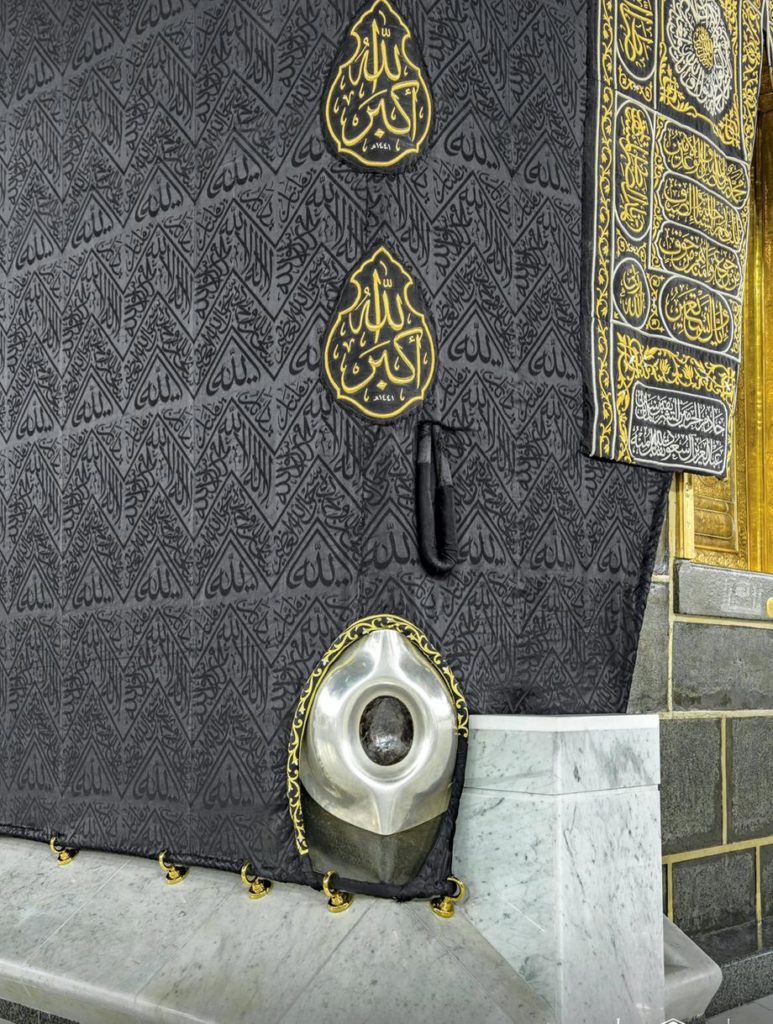
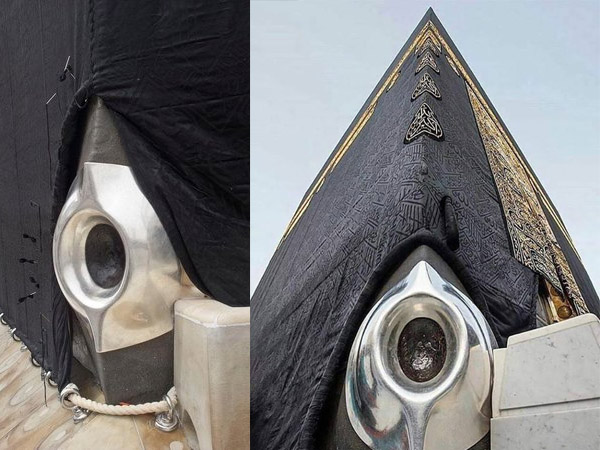
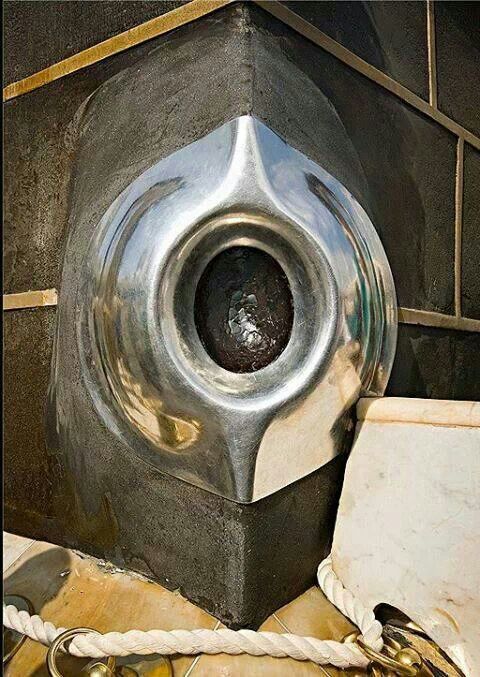
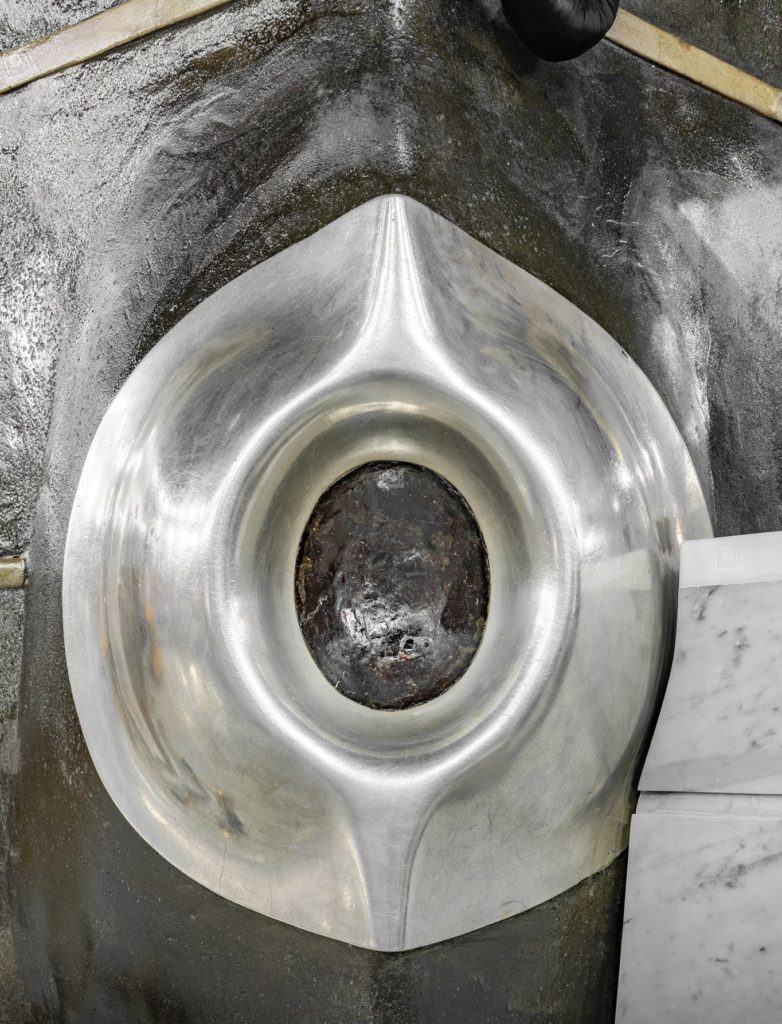
The following diagram shows the 8 pieces inside the frame:
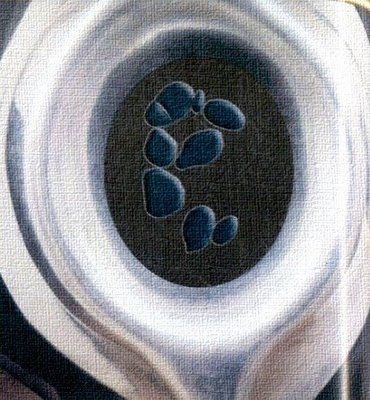
This is what the stone looks like up close.
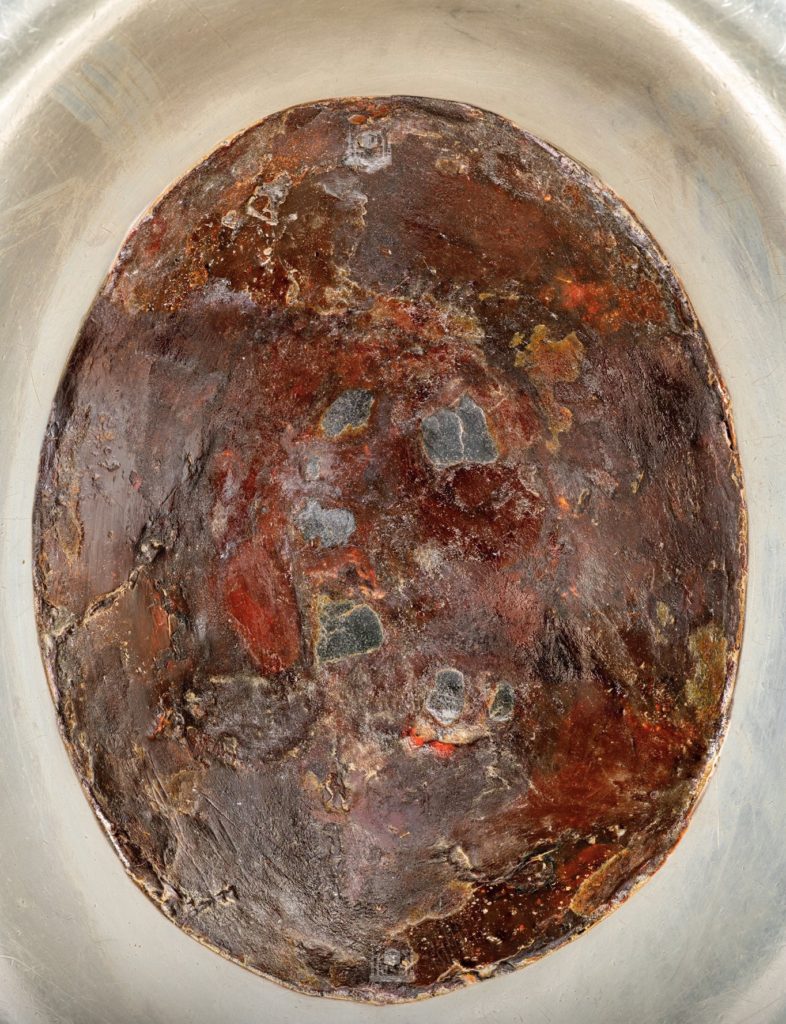
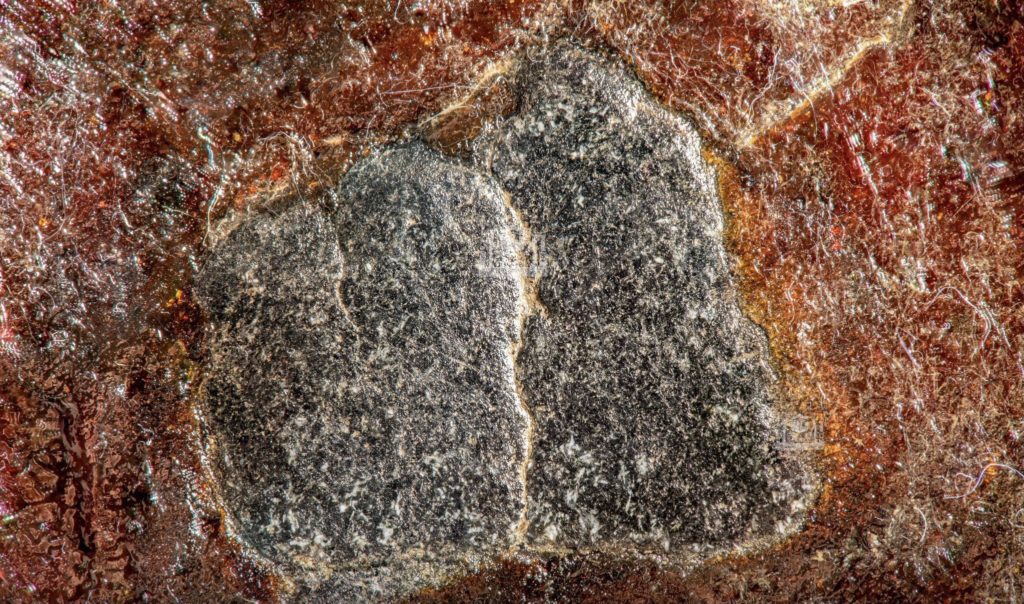
6. Walk counterclockwise around the Kabah
Men should do ramal (rapid walking) in the first three rounds of Tawaf Al-Qudoom and Tawaf of Umrah. They need to walk normally between the two corners (Yemeni Corner and Black stone) though.
عَنِ ابْنِ عَبَّاسٍ، أَنَّ رَسُولَ اللَّهِ صلى الله عليه وسلم وَأَصْحَابَهُ اعْتَمَرُوا مِنَ الْجِعْرَانَةِ فَرَمَلُوا بِالْبَيْتِ ثَلاَثًا وَمَشَوْا أَرْبَعًا
Narrated Abdullah ibn Abbas (radiallahu anhuma): The Messenger of Allah (sallallahu alaihi wasallam) and his Companions performed Umrah from al-Jiraanah and walked briskly (Ramal) three times around the House and walked normally four times. [Sunan Abee Dawood, Hadeeth No. 1890. Graded “sahih” (authentic) by Al-Albani.]
There is an interesting reason that the Ramal (walking rapidly) took place.
عَنِ ابْنِ عَبَّاسٍ، قَالَ قَدِمَ رَسُولُ اللَّهِ صلى الله عليه وسلم مَكَّةَ وَقَدْ وَهَنَتْهُمْ حُمَّى يَثْرِبَ فَقَالَ الْمُشْرِكُونَ إِنَّهُ يَقْدَمُ عَلَيْكُمْ قَوْمٌ قَدْ وَهَنَتْهُمُ الْحُمَّى وَلَقُوا مِنْهَا شَرًّا فَأَطْلَعَ اللَّهُ سُبْحَانَهُ نَبِيَّهُ صلى الله عليه وسلم عَلَى مَا قَالُوهُ فَأَمَرَهُمْ أَنْ يَرْمُلُوا الأَشْوَاطَ الثَّلاَثَةَ وَأَنْ يَمْشُوا بَيْنَ الرُّكْنَيْنِ فَلَمَّا رَأَوْهُمْ رَمَلُوا قَالُوا هَؤُلاَءِ الَّذِينَ ذَكَرْتُمْ أَنَّ الْحُمَّى قَدْ وَهَنَتْهُمْ هَؤُلاَءِ أَجْلَدُ مِنَّا . قَالَ ابْنُ عَبَّاسٍ وَلَمْ يَأْمُرْهُمْ أَنْ يَرْمُلُوا الأَشْوَاطَ إِلاَّ إِبْقَاءً عَلَيْهِمْ
Ibn Abbas (radiallahu anhuma) reported: Allah’s Messenger (sallallahu alaihi wasallam) and his Companions came to Makkah and the fever in Madinah had weakened them. Thereupon the polytheists (of Makkah) said: There would come to you a people whom the fever has made weak and they have suffered severely from it. They sat in Hateem (i.e. Al-Hijr). Thereupon Allah’s Messenger (sallallahu alaihi wasallam) commanded them to walk quickly in three circuits and walk (in four) between the two corners so that the polytheists should see their endurance. The polytheists then said (to one another) You were under the impression that fever had emaciated them whereas they are stronger than so and so. Ibn Abbas said: He (the Prophet) did not command them (the Muslims) to walk quickly in all the circuits out of kindness to them. [Sahih Muslim, Hadeeth No. 2904]
عَنِ ابْنِ عَبَّاسٍ، أَنَّ النَّبِيَّ صلى الله عليه وسلم اضْطَبَعَ فَاسْتَلَمَ وَكَبَّرَ ثُمَّ رَمَلَ ثَلاَثَةَ أَطْوَافٍ وَكَانُوا إِذَا بَلَغُوا الرُّكْنَ الْيَمَانِيَ وَتَغَيَّبُوا مِنْ قُرَيْشٍ مَشَوْا ثُمَّ يَطْلُعُونَ عَلَيْهِمْ يَرْمُلُونَ تَقُولُ قُرَيْشٌ كَأَنَّهُمُ الْغِزْلاَنُ قَالَ ابْنُ عَبَّاسٍ فَكَانَتْ سُنَّةً
Narrated Abdullah ibn Abbas (radiallahu anhuma): The Prophet (sallallahu alaihi wasallam) uncovered his right shoulder, touched the corner (Black Stone), and said Takbir (Allahu Akbar i.e. Allah is most great). He then walked briskly (Ramal) for three circuits. When they (the Companions) reached the Yemeni corner, and disappeared from the eyes of the Quraish, they walked as usual; When they appeared before them, they walked briskly. Thereupon the Quraysh said: It is as if they are gazelles. Ibn Abbas said: So it became a Sunnah. [Sunan Abee Dawood, Hadeeth No. 1889, Graded “sahih” (authentic) by Al-Albani.]
عَنِ ابْنِ عَبَّاسٍ ـ رضى الله عنهما ـ قَالَ إِنَّمَا سَعَى النَّبِيُّ صلى الله عليه وسلم بِالْبَيْتِ وَبَيْنَ الصَّفَا وَالْمَرْوَةِ لِيُرِيَ الْمُشْرِكِينَ قُوَّتَهُ
Narrated Ibn Abbas (radiallahu anhuma): The Prophet (sallallahu alaihi wasallam) hastened in going around the Kabah and between Safa and Marwah in order to show the pagans his strength. Ibn Abbas added, “When the Prophet (sallallahu alaihi wasallam) arrived (at Makkah) in the year of peace (following that of Al-Hudaibiyah treaty with the pagans of Makkah), he (ordered his companions) to do Ramal in order to show their strength to the pagans and the pagans were watching (the Muslims) from (the hill of) Quaiqan. [Sahih Al-Bukhari, Volume 5, Hadeeth No. 558]
Why continue?
عَنْ زَيْد بْن أَسْلَم، عَنْ أَبِيهِ، أَنَّ عُمَرَ بْنَ الْخَطَّابِ ـ رضى الله عنه ـ قَالَ لِلرُّكْنِ أَمَا وَاللَّهِ إِنِّي لأَعْلَمُ أَنَّكَ حَجَرٌ لاَ تَضُرُّ وَلاَ تَنْفَعُ، وَلَوْلاَ أَنِّي رَأَيْتُ النَّبِيَّ صلى الله عليه وسلم اسْتَلَمَكَ مَا اسْتَلَمْتُكَ. فَاسْتَلَمَهُ، ثُمَّ قَالَ فَمَا لَنَا وَلِلرَّمَلِ إِنَّمَا كُنَّا رَاءَيْنَا بِهِ الْمُشْرِكِينَ، وَقَدْ أَهْلَكَهُمُ اللَّهُ. ثُمَّ قَالَ شَىْءٌ صَنَعَهُ النَّبِيُّ صلى الله عليه وسلم فَلاَ نُحِبُّ أَنْ نَتْرُكَهُ
Narrated Zaid bin Aslam from his father who said: “Umar bin Al-Khattab (radiallahu anhu) addressed the Corner (Black Stone) saying, ‘By Allah! I know that you are a stone and can neither benefit nor harm. Had I not seen the Prophet (sallallahu alaihi wasallam) touching (and kissing) you, I would never have touched (and kissed) you.’ Then he kissed it and said, ‘There is no reason for us to do ramal (walking rapidly in Tawaf) except that we wanted to show off before the pagans, and now Allah has destroyed them.’ Umar added, ‘(Nevertheless), the Prophet (sallallahu alaihi wasallam) did that and we do not want to leave it (i.e. Ramal).’ [Sahih Al-Bukhari, Volume 2, Hadeeth No. 675]
عَنْ زَيْدِ بْنِ أَسْلَمَ، عَنْ أَبِيهِ، قَالَ سَمِعْتُ عُمَرَ بْنَ الْخَطَّابِ، يَقُولُ فِيمَ الرَّمَلاَنُ الْيَوْمَ وَالْكَشْفُ عَنِ الْمَنَاكِبِ، وَقَدْ أَطَّأَ اللَّهُ الإِسْلاَمَ وَنَفَى الْكُفْرَ وَأَهْلَهُ مَعَ ذَلِكَ لاَ نَدَعُ شَيْئًا كُنَّا نَفْعَلُهُ عَلَى عَهْدِ رَسُولِ اللَّهِ صلى الله عليه وسلم
It was reported from Zaid ibn Aslam, from his father, that he heard Umar bin al-Khattab (radiallahu anhu) say: “For what reason do we walk briskly (raml) and uncover our shoulders at this time, for Allah has established Islam and wiped out disbelief and its people? Despite this, however, we will never leave anything that we used to do during the life of the Messenger of Allah (sallallahu alaihi wasallam).” [Sunan Abee Dawood, Hadeeth No. 1887. Graded “hasan sahih” (authentic) by Al-Albani.]
It is also permissible to go around the Kabah whilst riding a camel or the like.
عَنِ ابْنِ عَبَّاسٍ، أَنَّ رَسُولَ اللَّهِ صلى الله عليه وسلم طَافَ فِي حَجَّةِ الْوَدَاعِ عَلَى بَعِيرٍ يَسْتَلِمُ الرُّكْنَ بِمِحْجَنٍ
Ibn Abbas (radiallahu anhuma) reported that Allah’s Messenger (sallallahu alaihi wasallam) circumambulated the House on the occasion of the Farewell Pilgrimage on the back of his camel and touched the Corner (of Black Stone) with a stick. [Sahih Muslim, Hadeeth No. 2917]
As mentioned earlier, one should walk around the Hijr (Hateem), and not cut through it, as it is considered part of the Kabah.
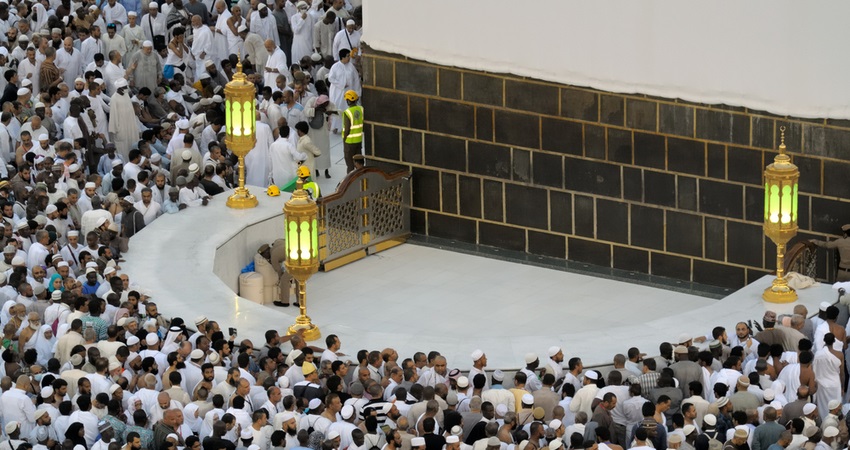
One should remember Allah frequently when doing tawaf and supplicate a lot, and should only talk as needed.
عَنِ ابْنِ عَبَّاسٍ، أَنَّ النَّبِيَّ صلى الله عليه وسلم قَالَ : الطَّوَافُ حَوْلَ الْبَيْتِ مِثْلُ الصَّلاَةِ إِلاَّ أَنَّكُمْ تَتَكَلَّمُونَ فِيهِ فَمَنْ تَكَلَّمَ فِيهِ فَلاَ يَتَكَلَّمَنَّ إِلاَّ بِخَيْرٍ
Ibn Abbas (radiallahu anhuma) narrated that the Prophet (sallallahu alaihi wasallam) said: “Tawaf around the House is similar to prayer except that you can talk during it. So whoever talks in it, then let him not say anything but good.” [Jaami At-Tirmidhi, Hadeeth No. 960. Graded “sahih (authentic) by Al-Albani.]
Imam At-Tirmidhi (rahimahullah) commented after this hadeeth:
“This is acted upon according to most of the people of knowledge. They consider it recommended that a man not speak during tawaf except when necessary, or for remembrance of Allah the Most High, or when it is regarding knowledge.”
Please note that there is no specific dua (supplication) for each of the 7 rounds as claimed by some.
7. Touch the Yemeni corner, if possible
If the Yemeni corner cannot be touched, then no waving is necessary. Please note that it is only meant to be touched and not kissed.
عَنِ ابْنِ عُمَرَ، أَنَّ النَّبِيَّ صلى الله عليه وسلم كَانَ يَسْتَلِمُ الرُّكْنَ الْيَمَانِيَ وَالْحَجَرَ فِي كُلِّ طَوَافٍ
It was narrated from Ibn Umar (radiallahu anhuma) that the Prophet (sallallahu alaihi wasallam) used to touch the Yemeni Corner and the Stone in each Tawaf. [Sunan An-Nasai, Hadeeth No. 2950. Graded “hasan sahih” (authentic) by Al-Albani.]
These were the only two corners that the Prophet (sallallahu alaihi wasallam) used to touch.
عَنِ ابْنِ عُمَرَ، أَنَّ رَسُولَ اللَّهِ صلى الله عليه وسلم كَانَ لاَ يَسْتَلِمُ إِلاَّ الْحَجَرَ وَالرُّكْنَ الْيَمَانِيَ
It was narrated from Ibn Umar that the Prophet (sallallahu alaihi wasallam) used to touch only the Stone and the Yemeni Corner. [Sunan An-Nasai, Hadeeth No. 2951. Graded “sahih” (authentic) by Al-Albani.]
Why did he touch only two of the corners? Abdullah Ibn Umar (radiallahu anhuma) mentioned a possible reason.
عَنْ سَالِمِ بْنِ عَبْدِ اللَّهِ، أَنَّ ابْنَ أَبِي بَكْرٍ، أَخْبَرَ عَبْدَ اللَّهِ بْنَ عُمَرَ، عَنْ عَائِشَةَ ـ رضى الله عنهم ـ زَوْجِ النَّبِيِّ صلى الله عليه وسلم أَنَّ رَسُولَ اللَّهِ صلى الله عليه وسلم قَالَ ” أَلَمْ تَرَىْ أَنَّ قَوْمَكِ بَنَوُا الْكَعْبَةَ اقْتَصَرُوا عَنْ قَوَاعِدِ إِبْرَاهِيمَ ”. فَقُلْتُ يَا رَسُولَ اللَّهِ، أَلاَ تَرُدُّهَا عَلَى قَوَاعِدِ إِبْرَاهِيمَ. فَقَالَ ” لَوْلاَ حِدْثَانُ قَوْمِكِ بِالْكُفْرِ ”. فَقَالَ عَبْدُ اللَّهِ بْنُ عُمَرَ لَئِنْ كَانَتْ عَائِشَةُ سَمِعَتْ هَذَا مِنْ رَسُولِ اللَّهِ صلى الله عليه وسلم مَا أُرَى أَنَّ رَسُولَ اللَّهِ صلى الله عليه وسلم تَرَكَ اسْتِلاَمَ الرُّكْنَيْنِ اللَّذَيْنِ يَلِيَانِ الْحِجْرَ إِلاَّ أَنَّ الْبَيْتَ لَمْ يُتَمَّمْ عَلَى قَوَاعِدِ إِبْرَاهِيمَ.
Salim ibn Abdullah narrated that the son of Abu Bakr informed Abdullah ibn Umar, that Aishah (radiallahu anhum), the wife of the Prophet (sallallahu alaihi wasallam) that the Messenger of Allah (sallallahu alaihi wasallam) said: Don’t you see that when your people built the Kabah, they did not build it on all the foundations built by Ibrahim?” I said, “O Allah’s Messenger! Why don’t we rebuild it on the foundations of Ibraham?” He said. “But for the fact that your people have recently given up disbelief (I would have done so). Abdullah Ibn Umar said: Aishah must have heard this from Allah’s Messenger (sallallahu alaihi wasallam) for I see that Allah’s Messenger (sallallahu alaihi wasallam) used not to touch the two corners facing Al-Hijr only because the House had not been built on the foundations of Ibrahim.” [Sahih Al-Bukhari, Volume 4, Hadeeth No. 587]
The original Kabah was a rectangular shape. Quraish shortened its foundations. So the two corners near the Hateem are not on the original foundations of Ibrahim – which is why the whole Hateem is considered to be part of the Kabah.
The following image showing all four corners might make this issue clearer.
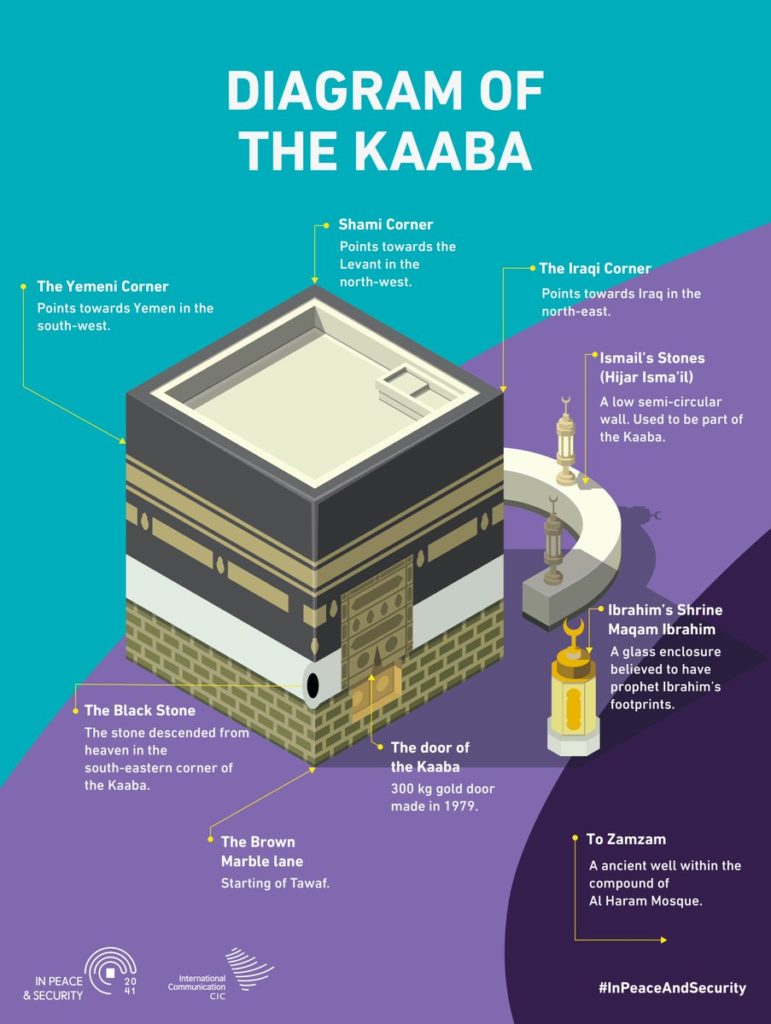
[Note: Maqam has been translated as shrine. I think a better translation could have been used.]
One should try to touch both of the corners even if it is a little difficult.
عَنْ نَافِعٍ، قَالَ قَالَ عَبْدُ اللَّهِ رَضِيَ اللَّهُ عَنْهُ مَا تَرَكْتُ اسْتِلاَمَ هَذَيْنِ الرُّكْنَيْنِ مُنْذُ رَأَيْتُ رَسُولَ اللَّهِ صلى الله عليه وسلم يَسْتَلِمُهُمَا الْيَمَانِيَ وَالْحَجَرَ فِي شِدَّةٍ وَلاَ رَخَاءٍ
It was narrated that Nafi said:”Abdullah (radiallahu anhu) said: “I have not failed to touch these two corners since I saw the Messenger of Allah (sallallahu alaihi wasallam) touching them, the Yemeni Corner and Black Stone, either when it is difficult or when it is easy.'” [Sunan An-Nasai, Hadeeth No. 2955. Graded “sahih” (authentic) by Al-Albani.]
Apart from following the Sunnah, touching the Yemeni Corner also erases sins.
:عن ابن عمر رضيَ اللَّهُ عنهُما عنِ النبي صلى الله عليه وسلّم قال
إنَّ مسحَ الحجرِ الأسودِ ، و الركنَ اليمانيَّ ، يحُطَّان الخطايا حطًّا
Ibn Umar (radiallahu anhuma) narrated that the Prophet (sallallahu alaihi wasallam) said: “Touching the Black Stone and the Yemeni Corner indeed erases sins.” [Sahih Al-Jaami, Hadeeth No. 2194]
This is what the Yemeni Corner looks like:
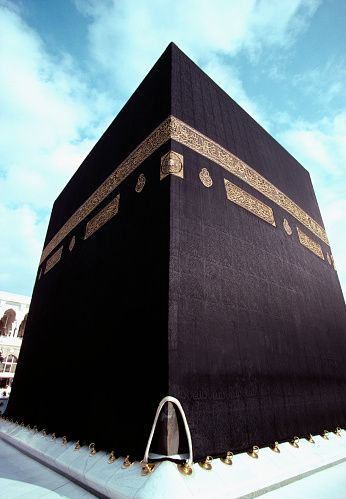
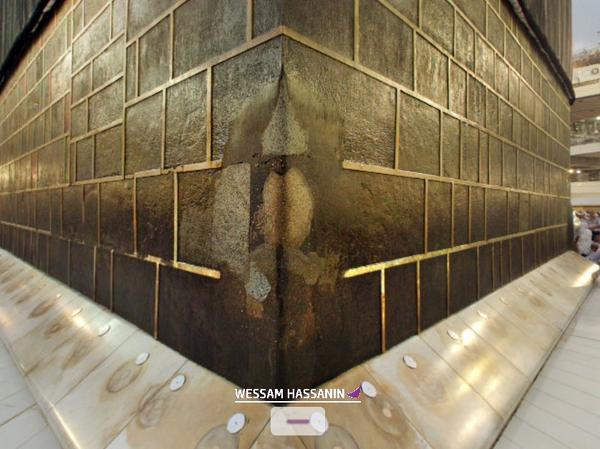
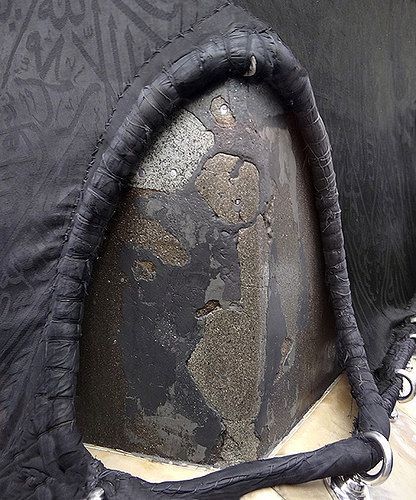
The strange coloured marks have been explained in this short article.
8. Recite the required dua (supplication) between the Yemeni corner and the Black stone
عَنْ عَبْدِ اللَّهِ بْنِ السَّائِبِ، قَالَ سَمِعْتُ رَسُولَ اللَّهِ صلى الله عليه وسلم يَقُولُ مَا بَيْنَ الرُّكْنَيْنِ { رَبَّنَا آتِنَا فِي الدُّنْيَا حَسَنَةً وَفِي الآخِرَةِ حَسَنَةً وَقِنَا عَذَابَ النَّارِ }
Narrated Abdullah ibn as-Saib (radiallahu anhu): I heard the Messenger of Allah (sallallahu alaihi wasallam) say between the two corners:
رَبَّنَا آتِنَا فِي الدُّنْيَا حَسَنَةً وَفِي الْآخِرَةِ حَسَنَةً وَقِنَا عَذَابَ النَّارِ
“Our Lord! Give us in this world that which is good and in the Hereafter that which is good, and save us from the torment of the Fire!”
[Sunan Abee Dawood, Hadeeth No. 1892. Graded “hasan” (good) by Al-Albani.]
Please note that there is no addition to this dua as claimed by some. This dua is from the Quran and it is mentioned in between the verses of Hajj:
فَإِذَا قَضَيْتُم مَّنَاسِكَكُمْ فَاذْكُرُوا اللَّـهَ كَذِكْرِكُمْ آبَاءَكُمْ أَوْ أَشَدَّ ذِكْرًا ۗ فَمِنَ النَّاسِ مَن يَقُولُ رَبَّنَا آتِنَا فِي الدُّنْيَا وَمَا لَهُ فِي الْآخِرَةِ مِنْ خَلَاقٍ
وَمِنْهُم مَّن يَقُولُ رَبَّنَا آتِنَا فِي الدُّنْيَا حَسَنَةً وَفِي الْآخِرَةِ حَسَنَةً وَقِنَا عَذَابَ النَّارِ
أُولَـٰئِكَ لَهُمْ نَصِيبٌ مِّمَّا كَسَبُوا ۚ وَاللَّـهُ سَرِيعُ الْحِسَابِ
So when you have accomplished your Manasik [(i.e. Ihram, Tawaf of the Kabah and As-Safa and Al-Marwah), stay at Arafat, Muzdalifah and Mina, Ramy of Jamarat, (stoning of the specified pillars in Mina) slaughtering of Hady (animal, etc.)]. Remember Allah as you remember your forefathers or with a far more remembrance. But of mankind there are some who say: “Our Lord! Give us (Your Bounties) in this world!” and for such there will be no portion in the Hereafter.
And of them there are some who say: “Our Lord! Give us in this world that which is good and in the Hereafter that which is good, and save us from the torment of the Fire!”
For them there will be alloted a share for what they have earned. And Allah is Swift at reckoning. [Surah Al-Baqarah (2) : 200 – 202]
It is very important to ponder over these ayaat (verses) because they point to a mistake many people make to this day: only supplicating for worldy affairs even in Hajj!
Ibn Kathir stated in his explanation of the above verses:
“Allah commands that He be remembered after the rituals are performed.
﴿ كَذِكۡرِكُمۡ ءَابَآءَڪُمۡ ﴾
(…as you remember your forefathers)
Said bin Jubayr said that Ibn Abbas said, “During the time of Jahiliyyah, people used to stand during the (Hajj) season, and one of them would say, `My father used to feed (the poor), help others (end their disputes, with his money), pay the Diyah (i.e., blood money),’ and so forth. The only Dhikr that they had was that they would remember the deeds of their fathers. Allah then revealed to Muhammad:
﴿ فَٱذۡڪُرُواْ ٱللَّهَ كَذِكۡرِكُمۡ ءَابَآءَڪُمۡ أَوۡ أَشَدَّ ذِڪۡرً۬اۗ ﴾
(Remember Allah as you remember your forefathers or with far more remembrance.)
Therefore, remembering Allah the Exalted and Ever High is always encouraged. We should mention that when Allah used “or” in the Ayah, He meant to encourage the people to remember Him more than they remember their forefathers, not that the word entails a doubt (as to which is larger or bigger). This statement is similar to the Ayat:
﴿ فَهِىَ كَٱلۡحِجَارَةِ أَوۡ أَشَدُّ قَسۡوَةً۬ۚ ﴾
(…as stones or even worse in hardness) (2:74) and,
﴿ يَخۡشَوۡنَ ٱلنَّاسَ كَخَشۡيَةِ ٱللَّهِ أَوۡ أَشَدَّ خَشۡيَةً۬ۚ ﴾
(. ..fear men as they fear Allah or even more) (4:77) and,
﴿ وَأَرۡسَلۡنَـٰهُ إِلَىٰ مِاْئَةِ أَلۡفٍ أَوۡ يَزِيدُونَ ﴾
(And We sent him to a hundred thousand (people) or even more) (37:147) and,
﴿ فَكَانَ قَابَ قَوۡسَيۡنِ أَوۡ أَدۡنَىٰ ﴾
(And was at a distance of two bows’ length or (even) nearer.) (53:9)
Allah encourages calling Him in supplication after remembering Him, because this will make it more likely that the supplication will be accepted. Allah also criticizes those who only supplicate to Him about the affairs of this life, while ignoring the affairs of the Hereafter. Allah said:
﴿ فَمِنَ ٱلنَّاسِ مَن يَقُولُ رَبَّنَآ ءَاتِنَا فِى ٱلدُّنۡيَا وَمَا لَهُ ۥ فِى ٱلۡأَخِرَةِ مِنۡ خَلَـٰقٍ۬ ﴾
(But of mankind there are some who say: “Our Lord! Give us (Your bounties) in this world!” and for such there will be no portion in the Hereafter.) meaning, they have no share in the Hereafter. This criticism serves to discourage other people from imitating those mentioned.
Said bin Jubayr said that Ibn Abbas said, “Some Bedouins used to come to the standing area (Arafat) and supplicate saying, `O Allah! Make it a rainy year, a fertile year and a year of good child bearing.’ They would not mention any of the affairs of the Hereafter. Thus, Allah revealed about them:
﴿ فَمِنَ ٱلنَّاسِ مَن يَقُولُ رَبَّنَآ ءَاتِنَا فِى ٱلدُّنۡيَا وَمَا لَهُ ۥ فِى ٱلۡأَخِرَةِ مِنۡ خَلَـٰقٍ۬ ﴾
(But of mankind there are some who say: “Our Lord! Give us (Your bounties) in this world!” and for such there will be no portion in the Hereafter.)
The believers who came after them used to say:
﴿ رَبَّنَآ ءَاتِنَا فِى ٱلدُّنۡيَا حَسَنَةً۬ وَفِى ٱلۡأَخِرَةِ حَسَنَةً۬ وَقِنَا عَذَابَ ٱلنَّارِ ﴾
(Our Lord! Give us in this world that which is good and in the Hereafter that which is good, and save us from the torment of the Fire!”)
Next, Allah revealed:
﴿ أُوْلَـٰٓٮِٕكَ لَهُمۡ نَصِيبٌ۬ مِّمَّا كَسَبُواْۚ وَٱللَّهُ سَرِيعُ ٱلۡحِسَابِ ﴾
(For them there will be allotted a share for what they have earned. And Allah is swift at reckoning.)
Hence, Allah praised those who ask for the affairs of both this life and the Hereafter. He said:
﴿ وَمِنۡهُم مَّن يَقُولُ رَبَّنَآ ءَاتِنَا فِى ٱلدُّنۡيَا حَسَنَةً۬ وَفِى ٱلۡأَخِرَةِ حَسَنَةً۬ وَقِنَا عَذَابَ ٱلنَّارِ ﴾
(And of them there are some who say: “Our Lord! Give us in this world that which is good and in the Hereafter that which is good, and save us from the torment of the Fire!”)
The supplication mentioned and praised in the Ayah includes all good aspects of this life and seeks refuge from all types of evil. The good of this life concerns every material request of well-being, spacious dwelling, pleasing mates, sufficient provision, beneficial knowledge, good profession or deeds, comfortable means of transportation and good praise, all of which the scholars of Tafsir have mentioned regarding this subject. All of these are but a part of the good that is sought in this life. As for the good of the Hereafter, the best of this includes acquiring Paradise, which also means acquiring safety from the greatest horror at the gathering place. It also refers to being questioned lightly and the other favors in the Hereafter.
As for acquiring safety from the Fire, it includes being directed to what leads to this good end in this world, such as avoiding the prohibitions, sins of all kinds and doubtful matters.
Al-Qasim bin Abdur-Rahman said, “Whoever is gifted with a grateful heart, a remembering tongue and a patient body, will have been endowed with a good deed in this life, a good deed in the Hereafter and saved from the torment of the Fire.”
This is why the Sunnah encourages reciting this Dua (i.e. in the Ayah about gaining a good deed in this life and the Hereafter). Al-Bukhari reported that Anas bin Malik narrated that the Prophet used to say:
« اللَّهُمَّ رَبَّنَا آتِنَا فِي الدُّنْيَا حَسَنَةً، وَفِي الآخِرَةِ حَسَنَةً وَقِنَا عَذَابَ النَّار »
(O Allah, our Lord! Give us that which is good in this life, that which is good in the Hereafter and save us from the torment of the Fire.)
Imam Ahmad reported that Anas said, “Allah’s Messenger visited a Muslim man who had become as weak as a sick small bird. Allah’s Messenger said to him, `Were you asking or supplicating to Allah about something’ He said, `Yes. I used to say: O Allah! Whatever punishment you saved for me in the Hereafter, give it to me in this life.’ Allah’s Messenger said:
« سُبْحَانَ اللهِ لَا تُطِيقُهُ أَوْ لَا تَسْتَطِيعُهُ، فَهَلَّا قُلْتَ:
﴿ رَبَّنَآ ءَاتِنَا فِى ٱلدُّنۡيَا حَسَنَةً۬ وَفِى ٱلۡأَخِرَةِ حَسَنَةً۬ وَقِنَا عَذَابَ ٱلنَّارِ ﴾
(All praise is due to Allah! You cannot bear it -or stand it. You should have said: (Our Lord! Give us in this world that which is good and in the Hereafter that which is good, and save us from the torment of the Fire!))
The man began reciting this Dua and he was cured.” Muslim also recorded it.
Al-Hakim reported that Said bin Jubayr said, “A man came to Ibn Abbas and said, `I worked for some people and settled for a part of my compensation in return for their taking me to perform Hajj with them. Is this acceptable? Ibn Abbas said, `You are among those whom Allah described:
﴿ أُوْلَـٰٓٮِٕكَ لَهُمۡ نَصِيبٌ۬ مِّمَّا كَسَبُواْۚ وَٱللَّهُ سَرِيعُ ٱلۡحِسَابِ ﴾
(For them there will be allotted a share for what they have earned. And Allah is swift at reckoning.)
Al-Hakim then commented; “This Hadith is authentic according to the criteria of the Two Shaykhs (Al-Bukhari and Muslim) although they did not record it.””
Please note that the men are required to walk in between the two corners and not do raml (rapid walking), even if it is the first three rounds.
عَنِ ابْنِ عَبَّاسٍ ـ رضى الله عنهما ـ قَالَ قَدِمَ رَسُولُ اللَّهِ صلى الله عليه وسلم وَأَصْحَابُهُ فَقَالَ الْمُشْرِكُونَ إِنَّهُ يَقْدَمُ عَلَيْكُمْ، وَقَدْ وَهَنَهُمْ حُمَّى يَثْرِبَ. فَأَمَرَهُمُ النَّبِيُّ صلى الله عليه وسلم أَنْ يَرْمُلُوا الأَشْوَاطَ الثَّلاَثَةَ، وَأَنْ يَمْشُوا مَا بَيْنَ الرُّكْنَيْنِ، وَلَمْ يَمْنَعْهُ أَنْ يَأْمُرَهُمْ أَنْ يَرْمُلُوا الأَشْوَاطَ كُلَّهَا إِلاَّ الإِبْقَاءُ عَلَيْهِمْ
Narrated Ibn Abbas (radiallahu anhuma): When Allah’s Messenger (sallallahu alaihi wasallam) and his companions came to Makkah, the pagans circulated the news that a group of people were coming to them and they had been weakened by the fever of Yathrib (Madinah). So the Prophet (sallallahu alaihi wasallam) ordered his companions to do ramal (walking rapidly) in the first three rounds of Tawaf of the Kabah and to walk between the two corners (The Black Stone and Yemenite corner). The Prophet (sallallahu alaihi wasallam) did not order them to do ramal in all the rounds of Tawaf out of pity for them. [Sahih Al-Bukhari, Volume 2, Hadeeth No. 672]
عَنِ ابْنِ عَبَّاسٍ، أَنَّ النَّبِيَّ صلى الله عليه وسلم اضْطَبَعَ فَاسْتَلَمَ وَكَبَّرَ ثُمَّ رَمَلَ ثَلاَثَةَ أَطْوَافٍ وَكَانُوا إِذَا بَلَغُوا الرُّكْنَ الْيَمَانِيَ وَتَغَيَّبُوا مِنْ قُرَيْشٍ مَشَوْا ثُمَّ يَطْلُعُونَ عَلَيْهِمْ يَرْمُلُونَ تَقُولُ قُرَيْشٌ كَأَنَّهُمُ الْغِزْلاَنُ قَالَ ابْنُ عَبَّاسٍ فَكَانَتْ سُنَّةً
Narrated Abdullah ibn Abbas (radiallahu anhuma): The Prophet (sallallahu alaihi wasallam) wore the mantle under his right armpit with the end over his left shoulder, and touched the corner (Black Stone), then uttered “Allah is most great” and walked proudly in three circuits of circumambulation. When they (the Companions) reached the Yemeni corner, and disappeared from the eyes of the Quraish, they walked as usual; When they appeared before them, they walked proudly with rapid strides. Thereupon the Quraysh said: They look to be the deer (that are jumping). Ibn Abbas said: Hence this became the sunnah (model behaviour of the Prophet). [Sunan Abee Dawood, Hadeeth No. 1889. Graded “sahih” (authentic) by Al-Albani.]
9. End a round at the Black stone and start a new round
When one reaches the Black stone, one should try to kiss it. As mentioned in Point 5 above, if he cannot kiss it, he should touch it with his hand and then kiss his hand. If he cannot touch it, then he should point at it.
He needs to say “Allahu Akbar” (Allah is Most Great) whilst kissing/touching/pointing.
عَنِ ابْنِ عَبَّاسٍ ـ رضى الله عنهما ـ أَنَّ رَسُولَ اللَّهِ صلى الله عليه وسلم طَافَ بِالْبَيْتِ، وَهْوَ عَلَى بَعِيرٍ، كُلَّمَا أَتَى عَلَى الرُّكْنِ أَشَارَ إِلَيْهِ بِشَىْءٍ فِي يَدِهِ وَكَبَّرَ
Narrated Ibn Abbas (radiallahu anhuma): Allah’s Messenger (sallallahu alaihi wasallam) performed Tawaf (of the Kabah) riding a camel (at that time the Prophet (sallallahu alaihi wasallam) had a foot injury). Whenever he came to the Corner (having the Black Stone) he would point out towards it with a thing in his hand and say takbeer (i.e. Allahu Akbar). [Sahih Al-Bukhari, Volume 2, Hadeeth No. 697]
10. Repeat the above steps to complete a total of 7 rounds but with one difference
The men are meant to walk normally in the last four rounds.
عَنِ ابْنِ عُمَرَ ـ رضى الله عنهما ـ قَالَ سَعَى النَّبِيُّ صلى الله عليه وسلم ثَلاَثَةَ أَشْوَاطٍ وَمَشَى أَرْبَعَةً فِي الْحَجِّ وَالْعُمْرَةِ
Narrated Abdullah ibn Umar (radiallahu anhuma): The Prophet (sallallahu alaihi wasallam) did Ramal in (first) three rounds (of Tawaf), and walked in the remaining four, in Hajj and Umrah. [Sahih Al-Bukhari, Volume 2, Hadeeth No. 674]
Many times, people get confused as to how many rounds they have completed. This fatwa should clear their doubts.
11. Do dua at the Multazam if possible
The Multazam is an area between the Black stone corner and the door of the Kabah.
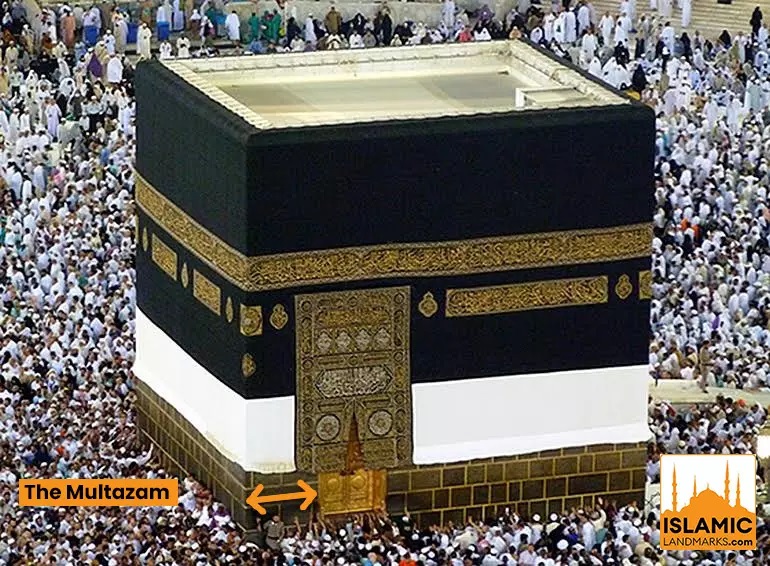
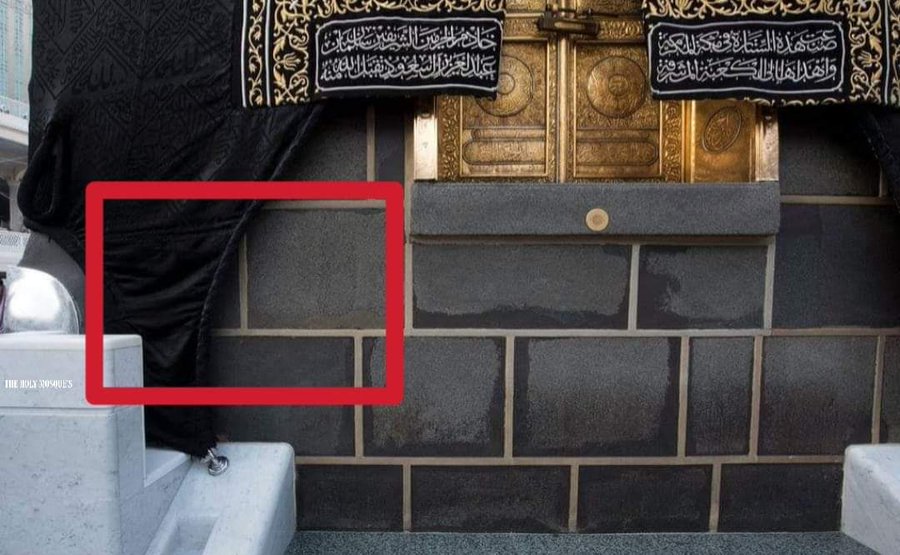
Is doing dua at the Multazam and clinging it a Sunnah? Well, this article explains this issue.
12. After tawaf, one should pray 2 rakahs behind Maqam Ibrahim
The Maqam Ibrahim is the stone on which Ibrahim (alaihissalam) stood upon when building the Kabah as mentioned in the long hadeeth in Part 3 the end of which states:
ثم لَبِثَ عنهم ما شاءَ الله، ثم جاء بعدَ ذلك وإسماعيلُ يَبري نَبْلاً له تحتَ دَوحةٍ قريباً منَ زَمزَمَ، فلمّا رآهُ قام إليه، فصَنَعا كما يَصنَعُ الوالدُ بالوَلَد والوَلَدُ بالوالد. ثم قال: يا إسماعيلُ، إن الله أمَرَني بأمر. قال: فاصْنَعْ ما أمَرَكَ ربُّك. قال: وتُعِينُني ؟ قال: وأعِينكُ. قال: فإن الله أمَرَني أن أبِنيَ ها هنا بيتاً ـ وأشارَ إلى أكمة مُرتفعةٍ عَلَى ما حَوْلَها ـ قال: فعندَ ذلكَ رَفَعا القواعدَ منَ البَيت، فجعلَ إِسماعيلُ يأتي بالحجارةِ وإِبراهيم يبني. حتى إذا ارتَفَعَ البناءُ جاءَ بهذا الحجَرِ فوضَعَهُ لهُ، فقامَ عليهِ وهو يَبني وإِسماعيلُ يُناوِلهُ الحِجارةَ، وهُما يَقولانِ: {رَبَّنا تقبَّلْ منّا، إِنكَ أنتَ السميعُ العَليم} قال: فجَعَلا يبنيانِ حتى يَدُورا حَولَ البيتِ وهُما يَقولان: {رَبَّنا تقبَّلْ منّا، إِنكَ أنتَ السميعُ العَليم} (البقرة: 127)
Then Ibrahim stayed away from them for a period as long as Allah wished, and called on them afterwards. He saw Ismail under a tree near Zam-Zam, sharpening his arrows. When he saw Ibrahim, he rose up to welcome him (and they greeted each other as a father does with his son or a son does with his father). Ibrahim said, ‘O Ismail! Allah has given me an order.’ Ismail said, ‘Do what your Lord has ordered you to do.’ Ibrahim asked, ‘Will you help me?’ Ismail said, ‘I will help you.’ Ibrahim said, Allah has ordered me to build a house here,’ pointing to a hillock higher than the land surrounding it.” The Prophet added, “Then they raised the foundations of the House (i.e. the Kabah). Ismail brought the stones and Ibrahim was building, and when the walls became high, Ismail brought this stone and put it for Ibrahim who stood over it and carried on building, while Ismail was handing him the stones, and both of them were saying,
رَبَّنَا تَقَبَّلْ مِنَّا ۖ إِنَّكَ أَنتَ السَّمِيعُ الْعَلِيمُ
“Our Lord! Accept (this service) from us. Verily! You are the All-Hearer, the All-Knower.” [Surah Al-Baqarah (2) : 127]
The Prophet added, “Then both of them went on building and going round the Kabah saying:
رَبَّنَا تَقَبَّلْ مِنَّا ۖ إِنَّكَ أَنتَ السَّمِيعُ الْعَلِيمُ
“Our Lord! Accept (this service) from us. Verily! You are the All-Hearer, the All-Knower.” [Surah Al-Baqarah (2) : 127]
[Sahih Al-Bukhari, Volume 4, Hadeeth No. 583]
The Prophet (sallallahu alaihi wasallam) prayed two rakahs behind Maqam Ibrahim after he finished his tawaf.
عَنْ عَبْدِ اللَّهِ بْنِ أَبِي أَوْفَى، قَالَ اعْتَمَرَ رَسُولُ اللَّهِ صلى الله عليه وسلم فَطَافَ بِالْبَيْتِ وَصَلَّى خَلْفَ الْمَقَامِ رَكْعَتَيْنِ، وَمَعَهُ مَنْ يَسْتُرُهُ مِنَ النَّاسِ فَقَالَ لَهُ رَجُلٌ أَدَخَلَ رَسُولُ اللَّهِ صلى الله عليه وسلم الْكَعْبَةَ قَالَ لاَ
Narrated Abdullah bin Abu Aufa (radiallahu anhu): “Allah’s Messenger (sallallahu alaihi wasallam) performed the Umrah. He performed Tawaf of the Kabah and offered two rakahs behind the Maqam and was accompanied by those who were screening him from the people.” Somebody asked Abdullah, “Did Allah’s Messenger (sallallahu alaihi wasallam) enter the Kabah?” Abdullah replied in the negative. [Sahih Al-Bukhari, Volume 2, Hadeeth No. 670]
The Prophet (sallallahu alaihi wasallam) recited Surah Al-Kaafiroon and Surah Al-Ikhlaas in these two rakahs, so we should strive to do the same.
عَنْ جَابِرِ بْنِ عَبْدِ اللَّهِ، أَنَّ رَسُولَ اللَّهِ صلى الله عليه وسلم قَرَأَ فِي رَكْعَتَىِ الطَّوَافِ بِسُورَتَىِ الإِخْلاَصِْ : ( قُلْ يَا أَيُّهَا الْكَافِرُونَ ) وَ ( قُلْ هُوَ اللَّهُ أَحَدٌ ).
Jabir bin Abdullah (radiallahu anhuma) narrated: During the two Rakahs of Tawaf, the Messenger of Allah recited the two Surahs of Ikhlas,
قُلْ يَا أَيُّهَا الْكَافِرُونَ
“Say: O you disbelievers!” and:
قُلْ هُوَ اللَّهُ أَحَدٌ
عَنْ أُمِّ سَلَمَةَ ـ رضى الله عنها ـ شَكَوْتُ إِلَى رَسُولِ اللَّهِ صلى الله عليه وسلم. وَحَدَّثَنِي مُحَمَّدُ بْنُ حَرْبٍ حَدَّثَنَا أَبُو مَرْوَانَ يَحْيَى بْنُ أَبِي زَكَرِيَّاءَ الْغَسَّانِيُّ عَنْ هِشَامٍ عَنْ عُرْوَةَ عَنْ أُمِّ سَلَمَةَ ـ رضى الله عنها ـ زَوْجِ النَّبِيِّ صلى الله عليه وسلم أَنَّ رَسُولَ اللَّهِ صلى الله عليه وسلم قَالَ وَهْوَ بِمَكَّةَ، وَأَرَادَ الْخُرُوجَ، وَلَمْ تَكُنْ أُمُّ سَلَمَةَ طَافَتْ بِالْبَيْتِ وَأَرَادَتِ الْخُرُوجَ، فَقَالَ لَهَا رَسُولُ اللَّهِ صلى الله عليه وسلم : إِذَا أُقِيمَتْ صَلاَةُ الصُّبْحِ فَطُوفِي عَلَى بَعِيرِكِ، وَالنَّاسُ يُصَلُّونَ . فَفَعَلَتْ ذَلِكَ، فَلَمْ تُصَلِّ حَتَّى خَرَجَتْ
Narrated Umm Salamah (radiallahu anha) (the wife of the Prophet) I informed Allah’s Messenger (sallallahu alaihi wasallam) (about my illness).
(Through other sub-narrators, Umm Salamah narrated that when Allah’s Messenger (sallallahu alaihi wasallam) was at Makkah and had just decided to leave (Makkah) while she had not yet done Tawaf of the Kabah (and after listening to her).
The Prophet (sallallahu alaihi wasallam) said, “When the morning prayer is established, perform the Tawaf on your camel while the people are in prayer.” So she did the same and did not offer the two rakah of Tawaf until she came out (of the Masjid). [Sahih Al-Bukhari, Volume 2, Hadeeth No. 692]
The original idea for praying behind the Maqam came from Umar ibn Al-Khattab (radiallahu anhu) then Allah sent down revelation ordering the people to do so.
عَنْ أَنَسٍ، أَنَّ عُمَرَ، قَالَ يَا رَسُولَ اللَّهِ لَوْ صَلَّيْنَا خَلْفَ الْمَقَامِ فَنَزَلَتْ : وَاتَّخِذُوا مِنْ مَقَامِ إِبْرَاهِيمَ مُصَلًّى
وَاتَّخِذُوا مِن مَّقَامِ إِبْرَاهِيمَ مُصَلًّى
وَإِذْ جَعَلْنَا الْبَيْتَ مَثَابَةً لِّلنَّاسِ وَأَمْنًا وَاتَّخِذُوا مِن مَّقَامِ إِبْرَاهِيمَ مُصَلًّى ۖ وَعَهِدْنَا إِلَىٰ إِبْرَاهِيمَ وَإِسْمَاعِيلَ أَن طَهِّرَا بَيْتِيَ لِلطَّائِفِينَ وَالْعَاكِفِينَ وَالرُّكَّعِ السُّجُودِ
“And (remember) when We made the House (the Kabah at Makkah) a place of resort for mankind and a place of safety. And take you (people) the Maqam (place) of Ibrahim [or the stone on which Ibrahim stood while he was building the Kabah] as a place of prayer (for some of your prayers, e.g. two Rakat after the Tawaf of the Kabah at Makkah), and We commanded Ibrahim and Ismail that they should purify My House (the Kaabah at Makkah) for those who are circumambulating it, or staying (Itikaf), or bowing or prostrating themselves (there, in prayer). [Surah Al-Baqarah (2) : 125]
Ibn Kathir stated in his explanation of the above verse:
“Allah described the House as a safe resort and refuge, for those who visit it are safe, even if they had committed acts of evil. This honor comes from the honor of the person who built it first, Khalil Ar-Rahman, just as Allah said,
﴿وَإِذْ بَوَّأْنَا لإِبْرَهِيمَ مَكَانَ الْبَيْتِ أَن لاَّ تُشْرِكْ بِى شَيْئاً﴾
(And (remember) when We showed Ibrahim the site of the (Sacred) House (the Kabah at Makkah) (saying): “Associate not anything (in worship) with Me…”) (22:26) and,
﴿إِنَّ أَوَّلَ بَيْتٍ وُضِعَ لِلنَّاسِ لَلَّذِى بِبَكَّةَ مُبَارَكاً وَهُدًى لِّلْعَـلَمِينَ فِيهِ ءَايَـتٌ بَيِّـنَـتٌ مَّقَامُ إِبْرَهِيمَ وَمَن دَخَلَهُ كَانَ ءَامِناً﴾
(Verily, the first House (of worship) appointed for mankind was that at Bakkah (Makkah), full of blessing, and a guidance for Al-Alamin (mankind and Jinn). In it are manifest signs (for example), the Maqam (place) of Ibrahim; whosoever enters it, he attains security) (3:96-97).
The last honorable Ayah emphasized the honor of Ibrahim’s Maqam, and the instruction to pray next to it,
﴿وَاتَّخِذُواْ مِن مَّقَامِ إِبْرَهِيمَ مُصَلًّى﴾
(And take you (people) the Maqam (place) of Ibrahim as a place of prayer).
Sufyan Ath-Thawri reported that Said bin Jubayr commented on the Ayah,
﴿وَاتَّخِذُواْ مِن مَّقَامِ إِبْرَهِيمَ مُصَلًّى﴾
(And take you (people) the Maqam (place) of Ibrahim as a place of prayer) “The stone (Maqam) is the standing place of Ibrahim, Allah’s Prophet, and a mercy from Allah. Ibrahim stood on the stone, while Ismail was handing him the stones (constructing the Kabah).” As-Suddi said, “The Maqam of Ibrahim is a stone which Ismail’s wife put under Ibrahim’s feet when washing his head.” Al-Qurtubi mentioned this, but he considered it unauthentic, although others gave it preference, Ar-Razi reported it in his Tafsir from Al-Hasan Al-Basri, Qatadah, and Ar-Rabi bin Anas.
Ibn Abi Hatim reported that Jabir, describing the Hajj (pilgrimage) of the Prophet said, “When the Prophet performed Tawaf, Umar asked him, `Is this the Maqam of our father’ He said, `Yes.’ Umar said, `Should we take it a place of prayer’ So Allah revealed,
﴿وَاتَّخِذُواْ مِن مَّقَامِ إِبْرَهِيمَ مُصَلًّى﴾
(And take you (people) the Maqam (place) of Ibrahim (Abraham) as a place of prayer.”)
Al-Bukhari said, “Chapter: Allah’s statement,
﴿وَاتَّخِذُواْ مِن مَّقَامِ إِبْرَهِيمَ مُصَلًّى﴾
(And take you (people) the Maqam (place) of Ibrahim (Abraham) as a place of prayer) meaning, they return to it repeatedly.” He then narrated that Anas bin Malik said that Umar bin Al-Khattab said, “I agreed with my Lord, or my Lord agreed with me, regarding three matters. I said, `O Messenger of Allah! I wish you take the Maqam of Ibrahim a place for prayer.’ The Ayah,
﴿وَاتَّخِذُواْ مِن مَّقَامِ إِبْرَهِيمَ مُصَلًّى﴾
(And take you (people) the Maqam (place) of Ibrahim (Abraham)) was revealed. I also said, `O Messenger of Allah! The righteous and the wicked enter your house. I wish you would command the Mothers of the believers (the Prophet’s wives) to wear Hijab. Allah sent down the Ayah that required the Hijab. And when I knew that the Prophet was angry with some of his wives, I came to them and said, `Either you stop what you are doing, or Allah will endow His Messenger with better women than you are.’ I advised one of his wives and she said to me, `O `Umar! Does the Messenger of Allah not know how to advise his wives, so that you have to do the job instead of him’ Allah then revealed,
﴿عَسَى رَبُّهُ إِن طَلَّقَكُنَّ أَن يُبْدِلَهُ أَزْوَجاً خَيْراً مِّنكُنَّ مُسْلِمَـتٍ﴾
(It may be if he divorced you (all) that his Lord will give him instead of you, wives better than you, ـ Muslims (who submit to Allah)).” (66:5)
Also, Ibn Jarir narrated that Jabir said, “After the Messenger of Allah kissed the Black Stone, he went around the house three times in a fast pace and four times in a slow pace. He then went to Maqam of Ibrahim, with it between him and the House, and prayed two Rakahs.” This is part of the long Hadith that Muslim recorded in Sahih. Al-Bukhari recorded that Amr bin Dinar said that he heard Ibn Umar say, “The Messenger of Allah performed Tawaf around the House seven times and then prayed two Rakahs behind the Maqam.”
All these texts indicate that the Maqam is the stone that Ibrahim was standing on while building the House. As the House’s walls became higher, Ismail brought his father a stone, so that he could stand on it, while Ismail handed him the stones. Ibrahim would place the stones on the wall, and whenever he finished one side, he would move to the next side, to complete the building all around. Ibrahim kept repeating this until he finished building the House, as we will describe when we explain the story of Ibrahim and Ismail and how they built the House, as narrated from Ibn Abbas and collected by Al-Bukhari. Ibrahim’s footprints were still visible in the stone, and the Arabs knew this fact during the time of Jahiliyyah. This is why Abu Talib said in his poem known as `Al-Lamiyyah’, “And Ibrahim’s footprint with his bare feet on the stone is still visible.”
The Muslims also saw Ibrahim’s footprints on the stone, as Anas bin Malik said, “I saw the Maqam with the print of Ibrahim’s toes and feet still visible in it, but the footprints dissipated because of the people rubbing the stone with their hands.”
Earlier, the Maqam was placed close to the Kabah’s wall. In the present time, the Maqam is placed next to Al-Hijr on the right side of those entering through the door.
When Ibrahim finished building the House, he placed the stone next to the wall of Al-Kabah. Or, when the House was finished being built, Ibrahim just left the stone where it was last standing, and he was commanded to pray next to the stone when he finished the Tawaf (circumambulating). It is understandable that the Maqam of Ibrahim would stand where the building of the House ended. The Leader of the faithful Umar bin Al-Khattab, one of the Four Rightly Guided Caliphs whom we were commanded to emulate, moved the stone away from the Kabah’s wall during his reign. Umar is one of the two men, whom the Messenger of Allah described when he said,
«اقْتَدُوا بِاللَّذَيْنِ مِنْ بَعْدِي أَبِي بَكْرٍ وَعُمَر»
(Imitate the two men who will come after me: Abu Bakr and Umar.)
Umar was also the person whom the Quran agreed with regarding praying next to Maqam of Ibrahim. This is why none among the Companions rejected it when he moved it.
Abdur-Razzaq reported from Ibn Jurayj from Ata, “Umar bin Al-Khattab moved the Maqam back.” Also, Abdur-Razzaq narrated that Mujahid said that Umar was the first person who moved the Maqam back to where it is now standing.” Al-Hafiz Abu Bakr, Ahmad bin Ali bin Al-Husayn Al-Bayhaqi recorded Aishah saying, “During the time of the Messenger of Allah and Abu Bakr, the Maqam was right next to the House. Umar moved the Maqam during his reign.” This Hadith has an authentic chain of narration.”
And Allah says:
إِنَّ أَوَّلَ بَيْتٍ وُضِعَ لِلنَّاسِ لَلَّذِي بِبَكَّةَ مُبَارَكًا وَهُدًى لِّلْعَالَمِينَ
فِيهِ آيَاتٌ بَيِّنَاتٌ مَّقَامُ إِبْرَاهِيمَ ۖ وَمَن دَخَلَهُ كَانَ آمِنًا ۗ وَلِلَّـهِ عَلَى النَّاسِ حِجُّ الْبَيْتِ مَنِ اسْتَطَاعَ إِلَيْهِ سَبِيلًا ۚ وَمَن كَفَرَ فَإِنَّ اللَّـهَ غَنِيٌّ عَنِ الْعَالَمِينَ
“Verily, the first House (of worship) appointed for mankind was that at Bakkah (Makkah), full of blessing, and a guidance for Al-Alameen (the mankind and jinns). In it are manifest signs (for example), the Maqam (place) of Ibrahim; whosoever enters it, he attains security. And Hajj (pilgrimage to Makkah) to the House (Kabah) is a duty that mankind owes to Allah, those who can afford the expenses (for one’s conveyance, provision and residence); and whoever disbelieves [i.e. denies Hajj (pilgrimage to Makkah), then he is a disbeliever of Allah], then Allah stands not in need of any of the Alameen (mankind and jinns).” [Surah Aal-Imran (3) : 96-97]
Ibn Kathir stated in his explanation of Verse 97 of Surah Aal-Imran:
“Allah’s statement,
﴿فِيهِ ءَايَـتٌ بَيِّـنَـتٌ﴾
(In it are manifest signs) (3:97), means, clear signs that Ibrahim built the Kabah and that Allah has honored and blessed it. Allah then said,
﴿مَّقَامِ إِبْرَهِيمَ﴾
(the Maqam (station) of Ibrahim) When the building (the Kabah) was raised, Ibrahim stood on; the Maqam so that he could raise the walls higher, while his son Ismail was handing the stones to him. We should mention that the Maqam used to be situated right next to the House. Later, and during his reign, Umar bin Al-Khattab moved the Maqam farther to the east, so that those who go around the House in Tawaf are able to perform it easily, without disturbing those who pray next to the Maqam after finishing their Tawaf. Allah commanded us to pray next to the Maqam;
﴿وَاتَّخِذُواْ مِن مَّقَامِ إِبْرَهِيمَ مُصَلًّى﴾
(And take you (people) the Maqam (station) of Ibrahim as a place of prayer) (2:125).
We mentioned the Hadiths about this subject before, and all the thanks are due to Allah. Al-Awfi said that, Ibn Abbas commented on Allah’s statement,
﴿فِيهِ ءَايَـتٌ بَيِّـنَـتٌ مَّقَامُ إِبْرَهِيمَ﴾
(In it are manifest signs, the Maqam of Ibrahim;)
“Such as the Maqam and Al-Mashar Al-Haram.” Mujahid said, “The impression of Ibrahim’s feet remains on the Maqam as a clear sign.” It was reported that Umar bin Abdul-Aziz, Al-Hasan, Qatadah, As-Suddi, Muqatil bin Hayyan and others said similarly.”
The Maqam is also a special stone.
عَنْ رَجَاءٍ أَبِي يَحْيَى، قَالَ سَمِعْتُ مُسَافِعًا الْحَاجِبَ، قَالَ سَمِعْتُ عَبْدَ اللَّهِ بْنَ عَمْرٍو، يَقُولُ سَمِعْتُ رَسُولَ اللَّهِ صلى الله عليه وسلم يَقُولُ : إِنَّ الرُّكْنَ وَالْمَقَامَ يَاقُوتَتَانِ مِنْ يَاقُوتِ الْجَنَّةِ طَمَسَ اللَّهُ نُورَهُمَا وَلَوْ لَمْ يَطْمِسْ نُورَهُمَا لأَضَاءَتَا مَا بَيْنَ الْمَشْرِقِ وَالْمَغْرِبِ
Abdullah bin Amr (radiallahu anhuma) narrated that: He heard the Messenger of Allah (sallallahu alaihi wasallam) saying: “Indeed the Corner and the Maqam are two corundums from the corundums of Paradise. Allah removed their lights, and if their lights had not been removed then they would illuminate what is between east and the west.” [Jaami At-Tirmidhi, Hadeeth No. 878. Graded “sahih” (authentic) by Al-Albani]
The Maqam is now housed inside a case. As mentioned above (in the tafsir), Umar (radiallahu anhu) moved the stone away from the house. So obviously the case containing the stone is also away from the house.
This is what the case looks like in today’s era.
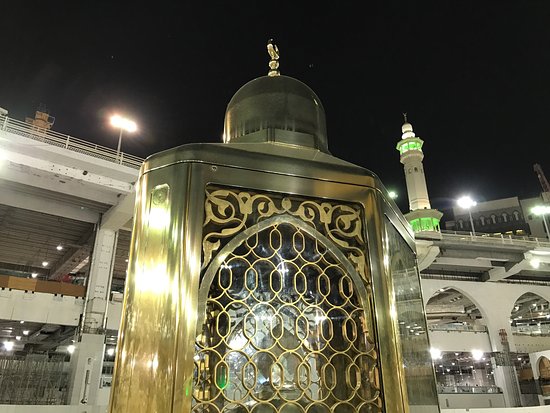
This is what some of the past cases looked like:
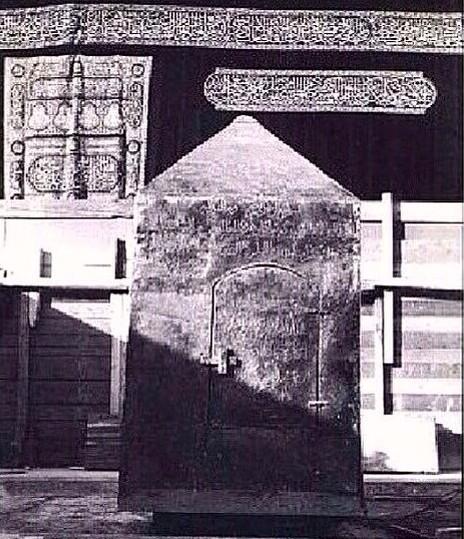
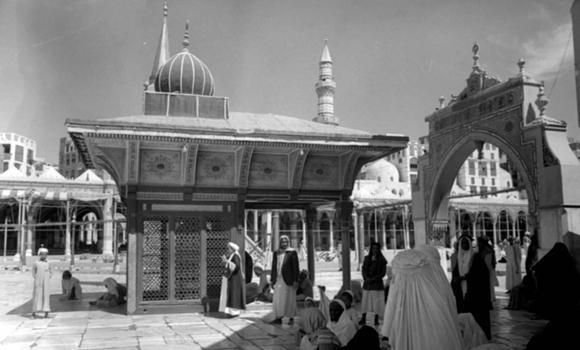
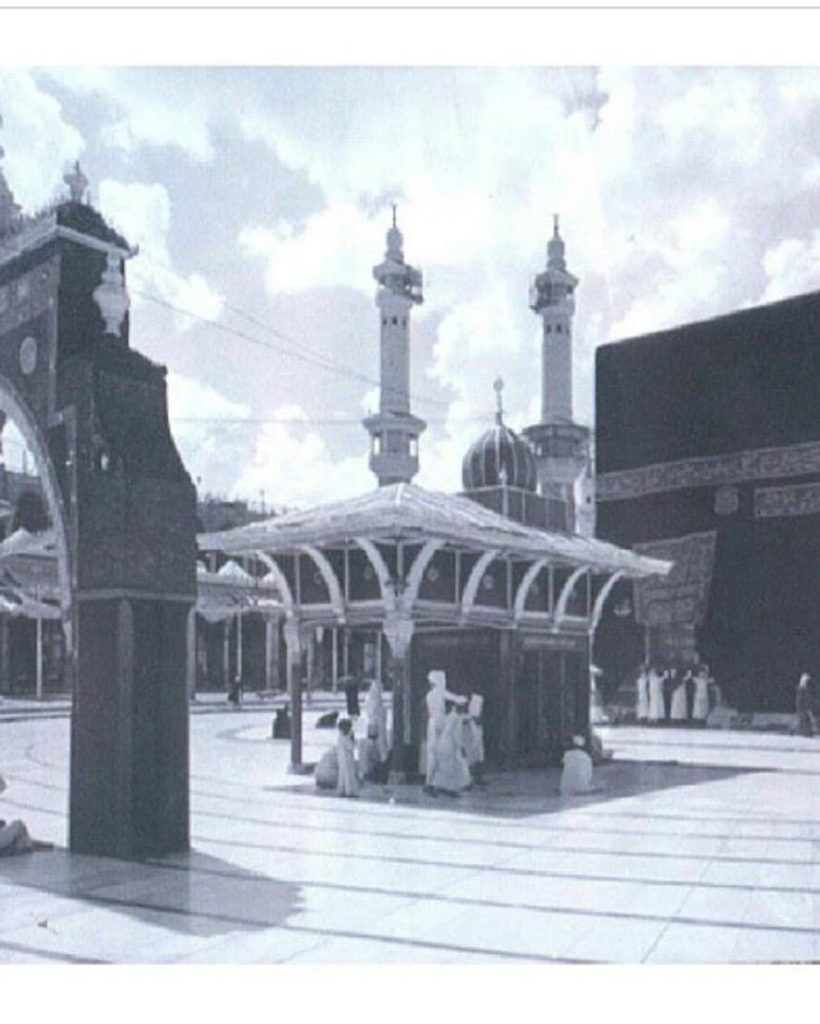
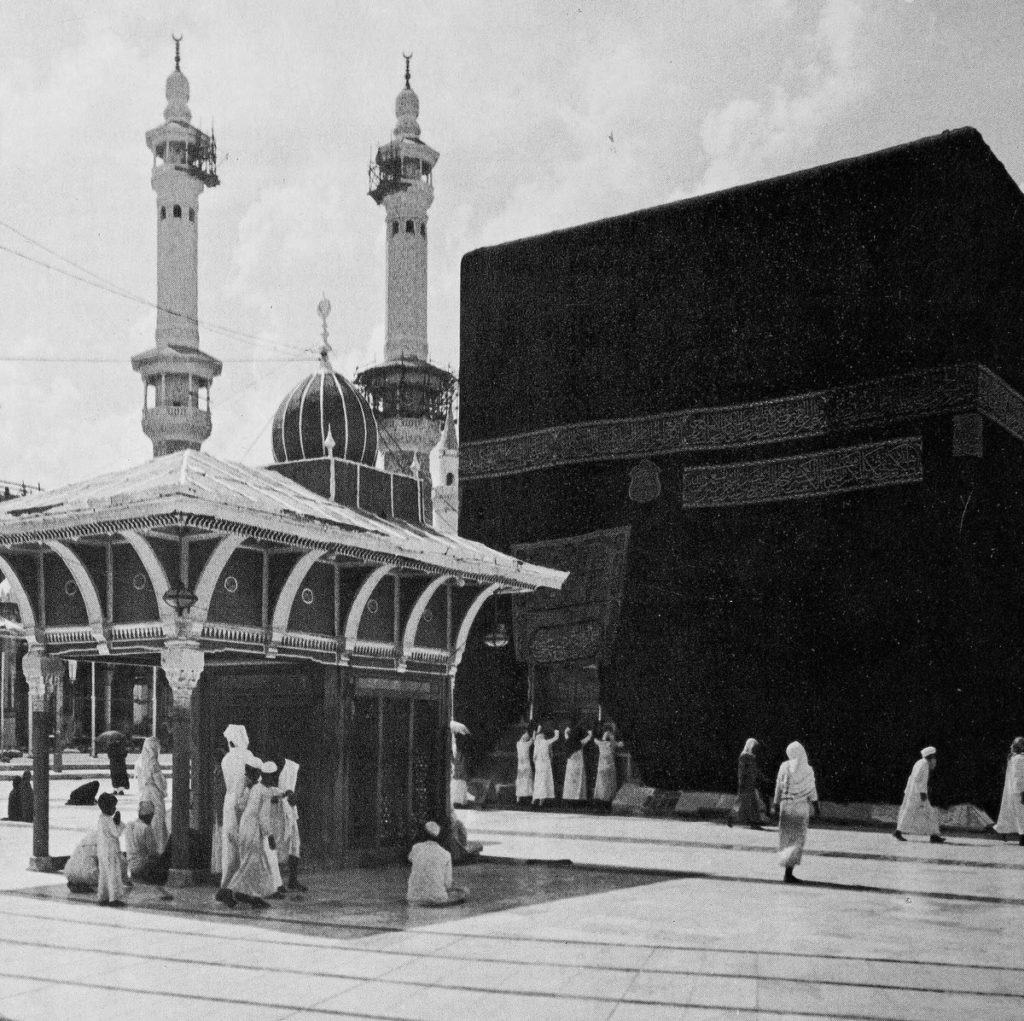
This is what the stone inside (i.e. the maqam itself) looks like when viewed from outside:
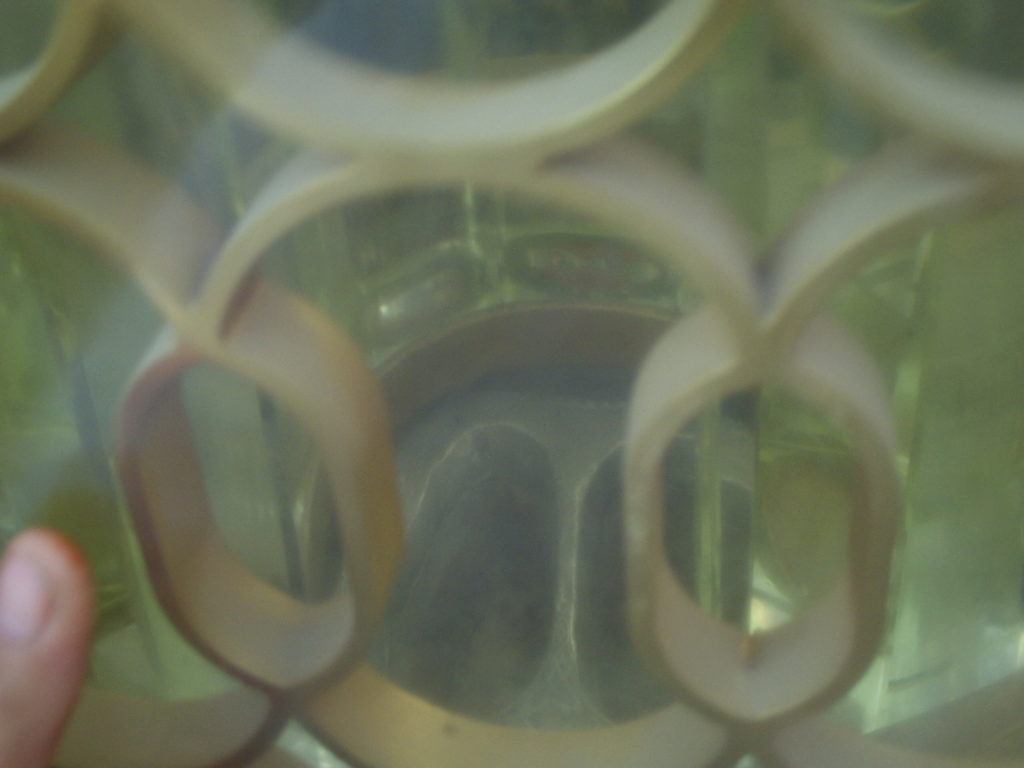
Here’s a closeup view of the stone and the cabinet:
Here’s a look inside the cabinet. The maqam can be seen (under the metal) as well as the roof of the cabinet.
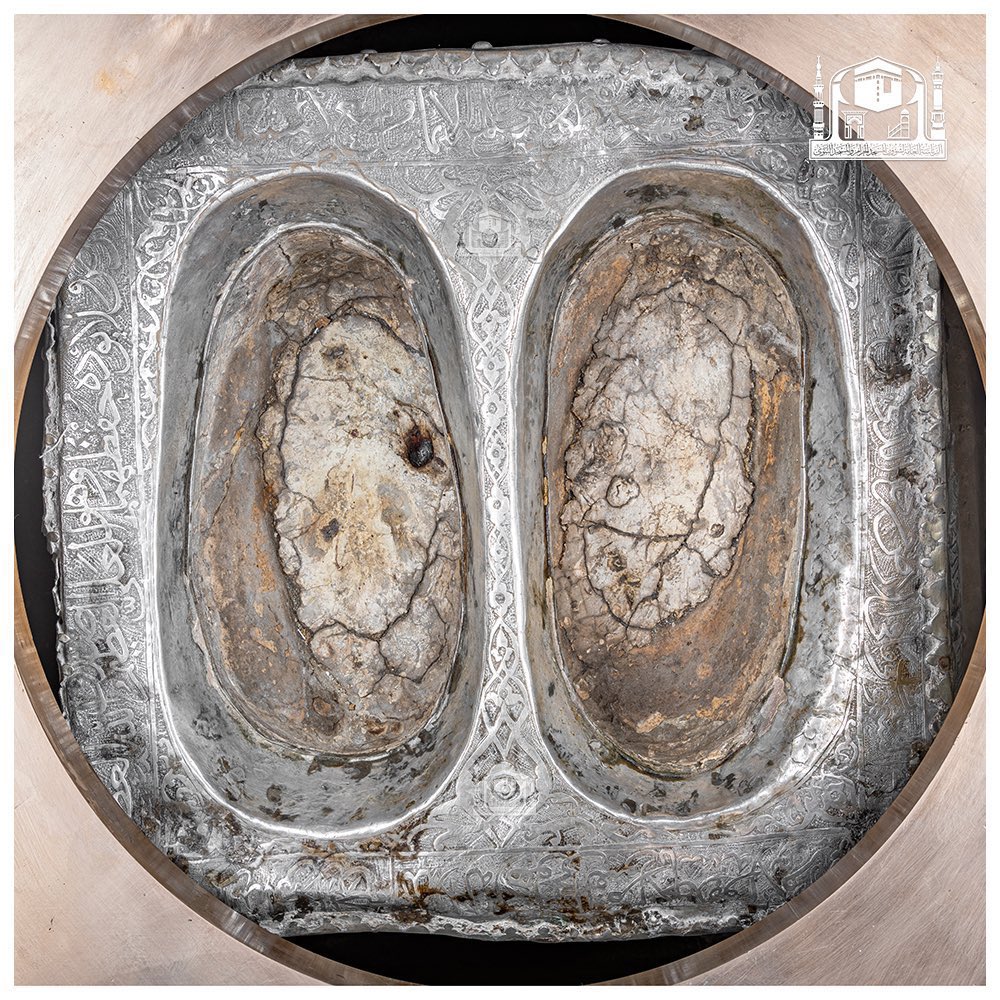
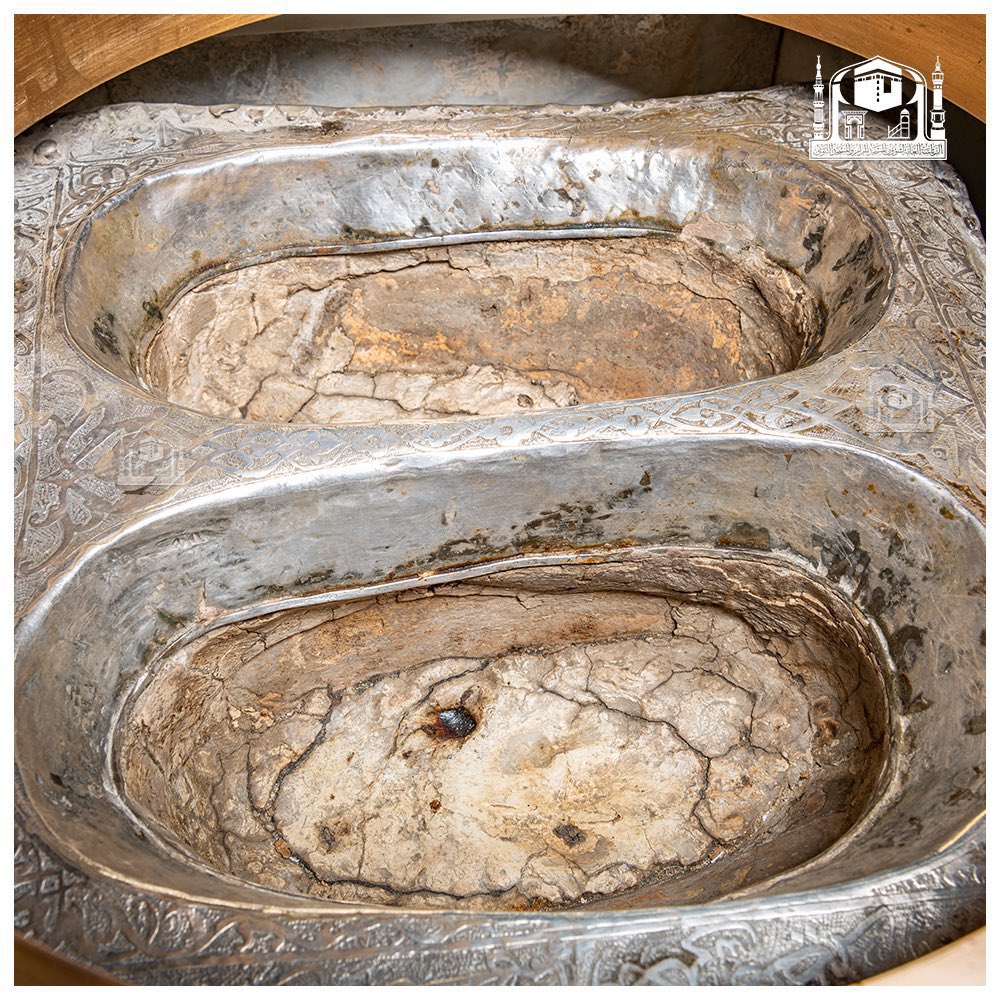
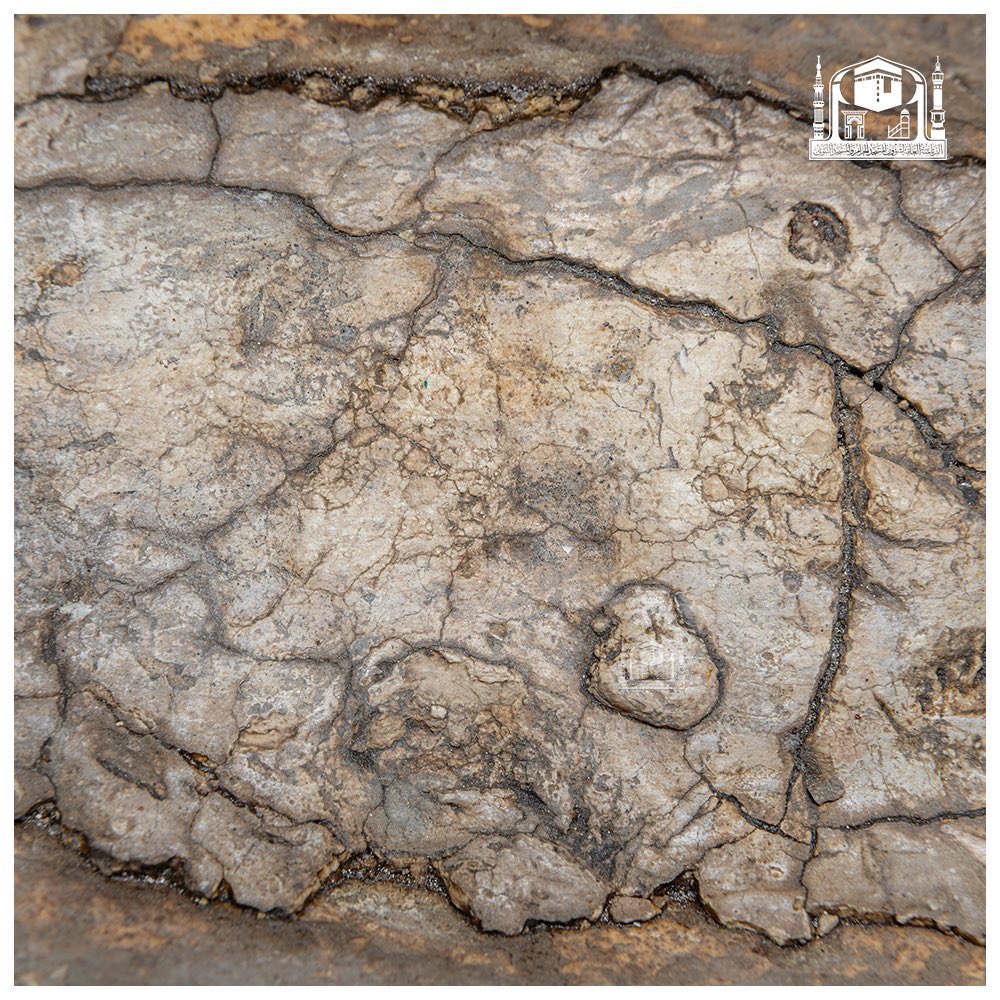
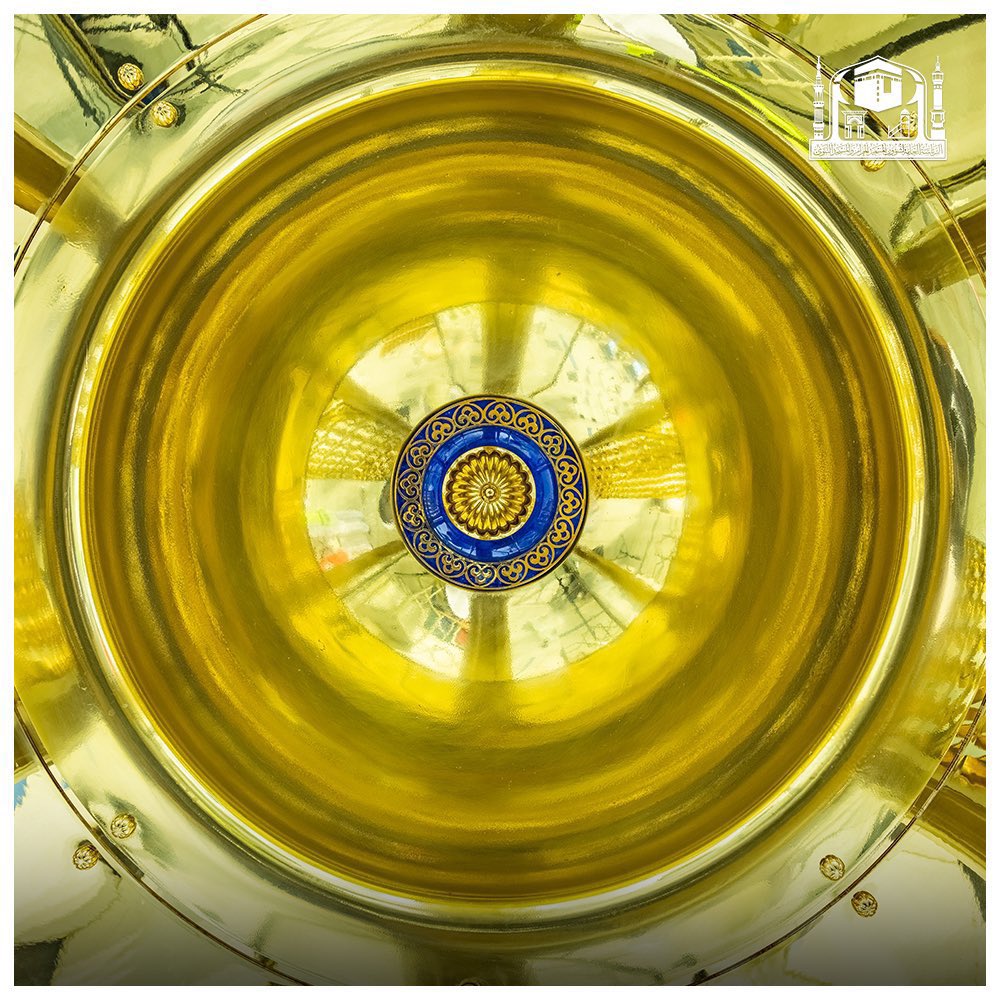
What are the engraved marks inside it? Well, not the footprints of Ibrahim (alaihissalaam) according to this article.
With regards to the maqam, please note that one should not try to touch it to seek blessings from it. This is an innovation and an act of minor shirk. So beware of seeking blessings from the maqam and also from the Kabah itself as many people do.
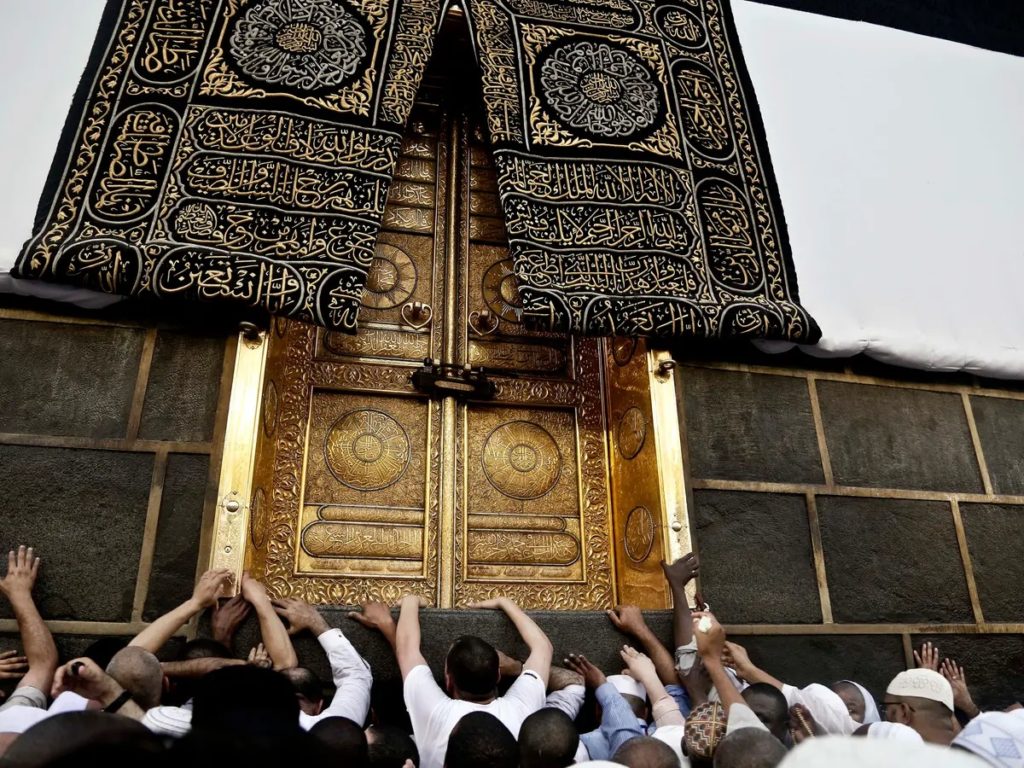
13. One should then drink some Zam-Zam water and pour it over their head
عن جابر بن عبد الله أنَّ النَّبيَّ صلَّى اللهُ عليه وسَلَّم رَمَلَ ثَلاثةَ أطْوافٍ مِن الحَجَرِ إلى الحَجَرِ، وصلَّى رَكعَتَينِ، ثُمَّ عادَ إلى الحَجَرِ، ثُمَّ ذَهَبَ إلى زَمزَمَ فشَرِبَ منها، وصَبَّ على رَأْسِه، ثُمَّ رَجَعَ فاستَلَمَ الرُّكنَ، ثُمَّ رَجَعَ إلى الصَّفا، فقال: أبْدأُ بما بَدَأَ اللهُ عزَّ وجلَّ به
Jaabir ibn Abdullah (radiallanhu anhuma): The Prophet (sallallahu alaihi wasallam) performed three rounds of Tawaf walking briskly (starting) from the Stone to the Stone (i.e. ending with it). He performed two units of prayer, returned to the Stone, then went to Zam Zam and drank from it and poured some over his head. Next, he returned and touched the corner, and then went to As-Safaa and said, “Begin with what Allah began with.” [Musnad Ahmad, Hadeeth No. 15243. Shuaib Al-Arnaut stated that its isnad (chain of narrators) was authentic upon the conditions of Muslim.]
The story of Zam Zam goes back to the time of Haajar (radiallahu anhu).
عن سعيدِ بن جُبَيرٍ قال ابن عبّاسٍ : أول ما اتخذَ النساءُ المِنطَقَ من قِبَلِ أمِّ إِسماعيلَ اتَّخذتْ مِنْطقاً لتُعفِّيَ أثرَها على سارة، ثم جاء بها إبراهيمُ وبابِنها إسماعيلَ وهيَ تُرضِعُهُ، حتى وَضعَها عندَ البيتِ عند دَوحةٍ فوقَ زَمزَم في أعلى المسجدِ، وليسَ بمكةَ يَومَئذٍ أحد، وليس بها ماءٌ فوَضعَهما هنالك، ووضعَ عندَهما جِراباً فيهِ تمرٌ وسِقاءً فيهِ ماءٌ، ثم قَفَّى إِبراهيمُ مُنَطلِقاً، فتَبِعَتْهُ أمُّ إِسماعيلَ فقالت: يا إِبراهيمُ أينَ تَذهَبُ وتترُكنا بهذا الوادي الذي ليس فيه إِنسٌ ولا شيء، فقالت له ذلكَ مِراراً، وجعلَ لا يَلتفِتُ إِليها. فقالت له: آلله أمرَكَ بهذا ؟ قال: نعم. قالت: إذَن لا يُضيِّعُنا. ثمَّ رَجعتْ. فانطَلَقَ إِبراهيمُ حتى إذا كان عندَ الثَّنيَّةِ حيثُ لا يَرونَهُ استقبَلَ بوَجههِ البيتَ ثمَّ دَعا بهؤلاءِ الكلماتِ ورَفعَ يَدَيهِ فقال: {ربَّنا إِني أسكَنتُ من ذُرِّيَّتي بوادٍ غير ذي زرع ـ حتى بلغ ـ يَشكُرون} (إبراهيم: 37). وجَعَلت أمُّ إِسماعيلَ تُرضِعُ إِسماعيلَ وتَشربُ من ذلك الماء، حتى إِذا نَفِذَ ما في السِّقاءِ عَطِشَت وعطِش ابنُها، وجعَلَت تَنظُرُ إِليه يَتلوَّى ـ أو قال: يَتلبَّط ـ فانطَلَقَتْ كراهيةَ أن تَنظُرَ إِليه، فوَجدَتِ الصَّفا أقرَبَ جَبلٍ في الأرضِ يَليها، فقامَت عليهِ، ثمَّ استقبَلَتِ الوادِيَ تَنظُرُ هل تَرَى أحداً، فلم تَرَ أحداً، فهبَطَت مِنَ الصَّفا، حتى إِذا بلَغَتِ الواديَ رَفعَت طرَفَ دِرعِها، ثمَّ سَعَت سَعيَ الإنسانِ المجهودِ حتى جاوَزَتِ الواديَ، ثمَّ أتَتِ المرْوَةَ فقامت عليها فنظَرَت هل تَرَى أحداً، فلم تَرَ أحداً، ففعلت ذلك سبعَ مراتٍ. قال ابنُ عباسٍ قال النبيُّ: فذلك سعيُ الناسِ بينهما. فلماأشرَفَت على المروةِ سمعَت صوتاً فقالت: صَهٍ ـ تريدُ نفسَها ـ ثمَّ تسمَّعَتْ أيضاً فقالت: قد أسمعتَ إن كان عندَكَ غِواث، فإِذا هيَ بالملَكِ عند مَوضعِ زَمزم، فبَحَثَ بعَقِبهِ ـ أو قال بجَناحهِ ـ حتى ظهرَ الماءُ، فجعَلَت تَحُوضهُ وتقول بيدِها هكذا، وجَعلت تَغرِفُ منَ الماءِ في سِقائها وهوَ يَفورُ بعدما تَغرِفُ. قال ابنُ عباسٍ قال النبيُّ صلى الله عليه وسلّم: يَرحَمُ الله أمَّ إسماعيلَ لو تَرَكَت زمزَم ـ أو قال: لو لم تَغرِف منَ الماء ـ لكانت زمزمُ عَيناً مَعيناً. قال: فشَرِبتَ وأرضَعتْ ولَدَها، فقال لها الملَكُ: لا تخافوا الضَّيعة، فإِنَّ ها هنا بيتَ الله يَبني هذا الغلامُ وأبوه، وإنَّ الله لا يُضيعُ أهلَه. وكان البيتُ مرتفعاً منَ الأرضِ كالرابية، تأتيهِ السيولُ فتأخُذ عن يمينهِ وشمالهِ، فكانت كذلكَ حتى مرَّت بهم رُفقة من جُرْهُم ـ أو أهلُ بيتٍ من جُرْهُم ـ مُقبِلينَ من طريقِ كَداء، فنزَلوا في أسفَلِ مكةَ، فَرأوا طائراً عائفاً، فقالوا: إِنَّ هذا الطائر لَيَدورُ على ماء، لَعهدُنا بهذا الوادي وما فيه ماء، فأرسَلوا جَريّاً أو جَرِيَّينِ فإِذا هم بالماء، فرَجَعوا فأخبروهم بالماءِ، فأقبلوا ـ قال وأمُّ إسماعيلَ عند الماء ـ فقالوا: أتأذَنينَ لنا أن نَنزِلَ عندَكِ ؟ فقالت: نعم، ولكنْ لا حقَّ لكم في الماء. قالوا: نعم. قال ابنُ عباسٍ قال النبيُّ صلى الله عليه وسلّم. فألفى ذلكَ أمَّ إِسماعيلَ وهيَ تحبُّ الإِنسَ، فنزَلوا، وأرسلوا إلى أهلِيهم فنزلوا معهم، حتى إِذا كان بها أهلُ أبياتٍ منهم، وشبَّ الغلامُ وتعلَّمَ العربيةَ منهم، وأنفَسَهُم وأعجبَهم حينَ شَبَّ، فلما أدركَ زوَّجوهُ امرأة منهم
Said ibn Jubair narrated: Ibn Abbas (radiallahu anhuma) said: The first lady to use a girdle was the mother of Ismail (i.e. Haajar). She used a girdle so that she might hide her tracks from Sarah. Ibrahim brought her and her son Ismail while she was suckling him, to a place near the Kabah under a tree on the spot of Zam-Zam, at the highest place in the mosque. During those days there was nobody in Makkah, nor was there any water. So he made them sit over there and placed near them a leather bag containing some dates, and a small water-skin containing some water, and set out homeward. Ismail’s mother followed him saying, “O Ibrahim! Where are you going, leaving us in this valley where there is no person whose company we may enjoy, nor is there anything (to enjoy)?” She repeated that to him many times, but he did not look back at her. Then she asked him, “Has Allah ordered you to do so?” He said, “Yes.” She said, “Then He will not neglect us,” and returned while Ibrahim proceeded onwards, and on reaching the Thaniya where they could not see him, he faced the Kabah, and raising both hands, invoked Allah saying the following prayers:
رَّبَّنَا إِنِّي أَسْكَنتُ مِن ذُرِّيَّتِي بِوَادٍ غَيْرِ ذِي زَرْعٍ عِندَ بَيْتِكَ الْمُحَرَّمِ رَبَّنَا لِيُقِيمُوا الصَّلَاةَ فَاجْعَلْ أَفْئِدَةً مِّنَ النَّاسِ تَهْوِي إِلَيْهِمْ وَارْزُقْهُم مِّنَ الثَّمَرَاتِ لَعَلَّهُمْ يَشْكُرُونَ
“O our Lord! I have made some of my offspring to dwell in an uncultivable valley by Your Sacred House (the Kabah at Makkah); in order, O our Lord, that they may perform salah (prayer), so fill some hearts among men with love towards them, and (O Allah) provide them with fruits so that they may give thanks.” [Surah Ibrahim (14) : 37]
Ismail’s mother went on suckling Ismail and drinking from the water (she had). When the water in the water-skin had all been used up, she became thirsty and her child also became thirsty. She started looking at him (i.e. Ismail) tossing in agony; She left him, for she could not endure looking at him, and found that the mountain of Safa was the nearest mountain to her on that land. She stood on it and started looking at the valley keenly so that she might see somebody, but she could not see anybody. Then she descended from Safa and when she reached the valley, she tucked up her robe and ran in the valley like a person in distress and trouble, till she crossed the valley and reached the Marwah mountain where she stood and started looking, expecting to see somebody, but she could not see anybody. She repeated that (running between Safa and Marwah) seven times.” The Prophet (sallallahu alaihi wassalam) said, “This is the source of the tradition of the walking of people between them (i.e. Safa and Marwah).
When she reached the Marwah (for the last time) she heard a voice and she asked herself to be quiet and listened attentively. She heard the voice again and said, ‘O, (whoever you may be)! You have made me hear your voice; have you got something to help me?” And behold! She saw an angel at the place of Zam-Zam, digging the earth with his heel (or his wing), till water flowed from that place. She started to make something like a basin around it, using her hand in this way, and started filling her water-skin with water with her hands, and the water was flowing out after she had scooped some of it.”
The Prophet (sallallahu alaihi wasallam) added, “May Allah bestow Mercy on Ismail’s mother! Had she let the Zam-Zam (flow without trying to control it) (or had she not scooped from that water) (to fill her water-skin), Zam-Zam would have been a stream flowing on the surface of the earth.” The Prophet (sallallahu alaihi wasallam) further added, “Then she drank (water) and suckled her child. The angel said to her, ‘Don’t be afraid of being neglected, for this is the House of Allah which will be built by this boy and his father, and Allah never neglects His people.’ The House (i.e. Kabah) at that time was on a high place resembling a hillock, and when torrents came, they flowed to its right and left. She lived in that way till some people from the tribe of Jurhum or a family from Jurhum passed by her and her child, as they (i.e. the Jurhum people) were coming through the way of Kada. They landed in the lower part of Makkah where they saw a bird that had the habit of flying around water and not leaving it. They said, ‘This bird must be flying around water, though we know that there is no water in this valley.’ They sent one or two messengers who discovered the source of water, and returned to inform them of the water. So, they all came (towards the water).” The Prophet (sallallahu alaihi wasallam) added, “Ismail’s mother was sitting near the water. They asked her, ‘Do you allow us to stay with you?” She replied, ‘Yes, but you will have no right to possess the water.’ They agreed to that.” The Prophet (sallallahu alaihi wasallam) further said, “Ismail’s mother was pleased with the whole situation as she used to love to enjoy the company of the people. So, they settled there, and later on they sent for their families who came and settled with them so that some families became permanent residents there. The child (i.e. Ismail) grew up and learnt Arabic from them and (his virtues) caused them to love and admire him as he grew up, and when he reached the age of puberty they made him marry a woman from amongst them.
After Ismail’s mother had died, Ibrahim came after Ismail’s marriage in order to see his family that he had left before, but he did not find Ismail there. When he asked Ismail’s wife about him, she replied, ‘He has gone in search of our livelihood.’ Then he asked her about their way of living and their condition, and she replied, ‘We are living in misery; we are living in hardship and destitution,’ complaining to him. He said, ‘When your husband returns, convey my salutation to him and tell him to change the threshold of the gate (of his house).’ When Ismail came, he seemed to have felt something unusual, so he asked his wife, ‘Has anyone visited you?’ She replied, ‘Yes, an old man of so-and-so description came and asked me about you and I informed him, and he asked about our state of living, and I told him that we were living in a hardship and poverty.’ On that Ishmael said, ‘Did he advise you anything?’ She replied, ‘Yes, he told me to convey his salutation to you and to tell you to change the threshold of your gate.’ Ismail said, ‘It was my father, and he has ordered me to divorce you. Go back to your family.’ So, Ismail divorced her and married another woman from amongst them (i.e. Jurhum).
[Sahih Al-Bukhari, Volume 4, Hadeeth No. 583. This is only part of the hadeeth. The full story was mentioned in Part 3.]
Zam Zam disappeared at some point in time due to having been filled in by Jurhum as was mentioned by Imam Ibn Kathir in his Seerah.
The grandfather of the Prophet (sallallahu alaihi wasallam) and the chieftain of Quraish, Abdul Mutallib, rediscovered it following a dream. The entire story is also mentioned in detail by Imam Ibn Kathir in his Seerah.
Zam Zam has many virtues as it is the best water on the face of the earth and serves as food and a cure as well.
عن ابن عباس رضي الله عنهما قال: قال رسول الله صلى الله عليه وسلم: خيرُ ماءٍ على وجهِ الأرضِ ماءُ زَمزمَ ، فيهِ طعامُ الطُّعمِ ، وشِفاءُ السُّقم ، وشرُّ ماءٍ على وجهِ الأرضِ ماءٌ بوادي ( بَرْهوتَ ) ، بِقُبَّةٍ بِ ( حَضْرَموتَ ) ، كرِجْلِ الجرادِ ، تُصبِحُ تَتدَفَّقُ ، وتُمسي لا بَلالَ فيها
Ibn Abbas (radiallahu anhuma) narrated: The Messenger of Allah (sallallahu alaihi wasallam) said: The best water on the face of the Earth is Zamzam water. It serves as food and nourishment, as well as cure from illness. It serves as food to satisfy hunger and a cure for illnesses. The worst water on the face of the earth is the water at Wadi Barhut in Hadramawt, which is like locusts in comparison with other pests. It gushes in the morning and is dry by the evening. [Sahih At-Targheeb Wat Tarheeb, Hadeeth No. 1161]
It is also a blessed water. A person can live on just Zam Zam for days.
عَنْ عَبْدِ اللَّهِ بْنِ الصَّامِتِ، قَالَ قَالَ أَبُو ذَرٍّ خَرَجْنَا مِنْ قَوْمِنَا غِفَارٍ وَكَانُوا يُحِلُّونَ الشَّهْرَ الْحَرَامَ فَخَرَجْتُ أَنَا وَأَخِي أُنَيْسٌ وَأُمُّنَا فَنَزَلْنَا عَلَى خَالٍ لَنَا فَأَكْرَمَنَا خَالُنَا وَأَحْسَنَ إِلَيْنَا فَحَسَدَنَا قَوْمُهُ فَقَالُوا إِنَّكَ إِذَا خَرَجْتَ عَنْ أَهْلِكَ خَالَفَ إِلَيْهِمْ أُنَيْسٌ فَجَاءَ خَالُنَا فَنَثَا عَلَيْنَا الَّذِي قِيلَ لَهُ فَقُلْتُ لَهُ أَمَّا مَا مَضَى مِنْ مَعْرُوفِكَ فَقَدْ كَدَّرْتَهُ وَلاَ جِمَاعَ لَكَ فِيمَا بَعْدُ . فَقَرَّبْنَا صِرْمَتَنَا فَاحْتَمَلْنَا عَلَيْهَا وَتَغَطَّى خَالُنَا ثَوْبَهُ فَجَعَلَ يَبْكِي فَانْطَلَقْنَا حَتَّى نَزَلْنَا بِحَضْرَةِ مَكَّةَ فَنَافَرَ أُنَيْسٌ عَنْ صِرْمَتِنَا وَعَنْ مِثْلِهَا فَأَتَيَا الْكَاهِنَ فَخَيَّرَ أُنَيْسًا فَأَتَانَا أُنَيْسٌ بِصِرْمَتِنَا وَمِثْلِهَا مَعَهَا – قَالَ – وَقَدْ صَلَّيْتُ يَا ابْنَ أَخِي قَبْلَ أَنْ أَلْقَى رَسُولَ اللَّهِ صلى الله عليه وسلم بِثَلاَثِ سِنِينَ . قُلْتُ لِمَنْ قَالَ لِلَّهِ . قُلْتُ فَأَيْنَ تَوَجَّهُ قَالَ أَتَوَجَّهُ حَيْثُ يُوَجِّهُنِي رَبِّي أُصَلِّي عِشَاءً حَتَّى إِذَا كَانَ مِنْ آخِرِ اللَّيْلِ أُلْقِيتُ كَأَنِّي خِفَاءٌ حَتَّى تَعْلُوَنِي الشَّمْسُ . فَقَالَ أُنَيْسٌ إِنَّ لِي حَاجَةً بِمَكَّةَ فَاكْفِنِي . فَانْطَلَقَ أُنَيْسٌ حَتَّى أَتَى مَكَّةَ فَرَاثَ عَلَىَّ ثُمَّ جَاءَ فَقُلْتُ مَا صَنَعْتَ قَالَ لَقِيتُ رَجُلاً بِمَكَّةَ عَلَى دِينِكَ يَزْعُمُ أَنَّ اللَّهَ أَرْسَلَهُ . قُلْتُ فَمَا يَقُولُ النَّاسُ قَالَ يَقُولُونَ شَاعِرٌ كَاهِنٌ سَاحِرٌ . وَكَانَ أُنَيْسٌ أَحَدَ الشُّعَرَاءِ . قَالَ أُنَيْسٌ لَقَدْ سَمِعْتُ قَوْلَ الْكَهَنَةِ فَمَا هُوَ بِقَوْلِهِمْ وَلَقَدْ وَضَعْتُ قَوْلَهُ عَلَى أَقْرَاءِ الشِّعْرِ فَمَا يَلْتَئِمُ عَلَى لِسَانِ أَحَدٍ بَعْدِي أَنَّهُ شِعْرٌ وَاللَّهِ إِنَّهُ لَصَادِقٌ وَإِنَّهُمْ لَكَاذِبُونَ . قَالَ قُلْتُ فَاكْفِنِي حَتَّى أَذْهَبَ فَأَنْظُرَ . قَالَ فَأَتَيْتُ مَكَّةَ فَتَضَعَّفْتُ رَجُلاً مِنْهُمْ فَقُلْتُ أَيْنَ هَذَا الَّذِي تَدْعُونَهُ الصَّابِئَ فَأَشَارَ إِلَىَّ فَقَالَ الصَّابِئَ . فَمَالَ عَلَىَّ أَهْلُ الْوَادِي بِكُلِّ مَدَرَةٍ وَعَظْمٍ حَتَّى خَرَرْتُ مَغْشِيًّا عَلَىَّ – قَالَ – فَارْتَفَعْتُ حِينَ ارْتَفَعْتُ كَأَنِّي نُصُبٌ أَحْمَرُ – قَالَ – فَأَتَيْتُ زَمْزَمَ فَغَسَلْتُ عَنِّي الدِّمَاءَ وَشَرِبْتُ مِنْ مَائِهَا وَلَقَدْ لَبِثْتُ يَا ابْنَ أَخِي ثَلاَثِينَ بَيْنَ لَيْلَةٍ وَيَوْمٍ مَا كَانَ لِي طَعَامٌ إِلاَّ مَاءُ زَمْزَمَ فَسَمِنْتُ حَتَّى تَكَسَّرَتْ عُكَنُ بَطْنِي وَمَا وَجَدْتُ عَلَى كَبِدِي سُخْفَةَ جُوعٍ – قَالَ – فَبَيْنَا أَهْلُ مَكَّةَ فِي لَيْلَةٍ قَمْرَاءَ إِضْحِيَانَ إِذْ ضُرِبَ عَلَى أَسْمِخَتِهِمْ فَمَا يَطُوفُ بِالْبَيْتِ أَحَدٌ وَامْرَأَتَيْنِ مِنْهُمْ تَدْعُوَانِ إِسَافًا وَنَائِلَةَ – قَالَ – فَأَتَتَا عَلَىَّ فِي طَوَافِهِمَا فَقُلْتُ أَنْكِحَا أَحَدَهُمَا الأُخْرَى – قَالَ – فَمَا تَنَاهَتَا عَنْ قَوْلِهِمَا – قَالَ – فَأَتَتَا عَلَىَّ فَقُلْتُ هَنٌ مِثْلُ الْخَشَبَةِ غَيْرَ أَنِّي لاَ أَكْنِي . فَانْطَلَقَتَا تُوَلْوِلاَنِ وَتَقُولاَنِ لَوْ كَانَ هَا هُنَا أَحَدٌ مِنْ أَنْفَارِنَا . قَالَ فَاسْتَقْبَلَهُمَا رَسُولُ اللَّهِ صلى الله عليه وسلم وَأَبُو بَكْرٍ وَهُمَا هَابِطَانِ قَالَ : مَا لَكُمَا . قَالَتَا الصَّابِئُ بَيْنَ الْكَعْبَةِ وَأَسْتَارِهَا قَالَ ” مَا قَالَ لَكُمَا ” . قَالَتَا إِنَّهُ قَالَ لَنَا كَلِمَةً تَمْلأُ الْفَمَ . وَجَاءَ رَسُولُ اللَّهِ صلى الله عليه وسلم حَتَّى اسْتَلَمَ الْحَجَرَ وَطَافَ بِالْبَيْتِ هُوَ وَصَاحِبُهُ ثُمَّ صَلَّى فَلَمَّا قَضَى صَلاَتَهُ قَالَ أَبُو ذَرٍّ . فَكُنْتُ أَنَا أَوَّلُ مَنْ حَيَّاهُ بِتَحِيَّةِ الإِسْلاَمِ – قَالَ – فَقُلْتُ السَّلاَمُ عَلَيْكَ يَا رَسُولَ اللَّهِ . فَقَالَ : وَعَلَيْكَ وَرَحْمَةُ اللَّهِ . ثُمَّ قَالَ : مَنْ أَنْتَ . قَالَ قُلْتُ مِنْ غِفَارٍ – قَالَ – فَأَهْوَى بِيَدِهِ فَوَضَعَ أَصَابِعَهُ عَلَى جَبْهَتِهِ فَقُلْتُ فِي نَفْسِي كَرِهَ أَنِ انْتَمَيْتُ إِلَى غِفَارٍ . فَذَهَبْتُ آخُذُ بِيَدِهِ فَقَدَعَنِي صَاحِبُهُ وَكَانَ أَعْلَمَ بِهِ مِنِّي ثُمَّ رَفَعَ رَأْسَهُ ثُمَّ قَالَ : مَتَى كُنْتَ هَا هُنَا . قَالَ قُلْتُ قَدْ كُنْتُ هَا هُنَا مُنْذُ ثَلاَثِينَ بَيْنَ لَيْلَةٍ وَيَوْمٍ قَالَ : فَمَنْ كَانَ يُطْعِمُكَ . قَالَ قُلْتُ مَا كَانَ لِي طَعَامٌ إِلاَّ مَاءُ زَمْزَمَ . فَسَمِنْتُ حَتَّى تَكَسَّرَتْ عُكَنُ بَطْنِي وَمَا أَجِدُ عَلَى كَبِدِي سُخْفَةَ جُوعٍ قَالَ : إِنَّهَا مُبَارَكَةٌ إِنَّهَا طَعَامُ طُعْمٍ . فَقَالَ أَبُو بَكْرٍ يَا رَسُولَ اللَّهِ ائْذَنْ لِي فِي طَعَامِهِ اللَّيْلَةَ . فَانْطَلَقَ رَسُولُ اللَّهِ صلى الله عليه وسلم وَأَبُو بَكْرٍ وَانْطَلَقْتُ مَعَهُمَا فَفَتَحَ أَبُو بَكْرٍ بَابًا فَجَعَلَ يَقْبِضُ لَنَا مِنْ زَبِيبِ الطَّائِفِ وَكَانَ ذَلِكَ أَوَّلَ طَعَامٍ أَكَلْتُهُ بِهَا ثُمَّ غَبَرْتُ مَا غَبَرْتُ ثُمَّ أَتَيْتُ رَسُولَ اللَّهِ صلى الله عليه وسلم فَقَالَ : إِنَّهُ قَدْ وُجِّهَتْ لِي أَرْضٌ ذَاتُ نَخْلٍ لاَ أُرَاهَا إِلاَّ يَثْرِبَ فَهَلْ أَنْتَ مُبَلِّغٌ عَنِّي قَوْمَكَ عَسَى اللَّهُ أَنْ يَنْفَعَهُمْ بِكَ وَيَأْجُرَكَ فِيهِمْ . فَأَتَيْتُ أُنَيْسًا فَقَالَ مَا صَنَعْتَ قُلْتُ صَنَعْتُ أَنِّي قَدْ أَسْلَمْتُ وَصَدَّقْتُ . قَالَ مَا بِي رَغْبَةٌ عَنْ دِينِكَ فَإِنِّي قَدْ أَسْلَمْتُ وَصَدَّقْتُ . فَأَتَيْنَا أُمَّنَا فَقَالَتْ مَا بِي رَغْبَةٌ عَنْ دِينِكُمَا فَإِنِّي قَدْ أَسْلَمْتُ وَصَدَّقْتُ . فَاحْتَمَلْنَا حَتَّى أَتَيْنَا قَوْمَنَا غِفَارًا فَأَسْلَمَ نِصْفُهُمْ وَكَانَ يَؤُمُّهُمْ إِيمَاءُ بْنُ رَحَضَةَ الْغِفَارِيُّ وَكَانَ سَيِّدَهُمْ . وَقَالَ نِصْفُهُمْ إِذَا قَدِمَ رَسُولُ اللَّهِ صلى الله عليه وسلم الْمَدِينَةَ أَسْلَمْنَا . فَقَدِمَ رَسُولُ اللَّهِ صلى الله عليه وسلم الْمَدِينَةَ فَأَسْلَمَ نِصْفُهُمُ الْبَاقِي وَجَاءَتْ أَسْلَمُ فَقَالُوا يَا رَسُولَ اللَّهِ إِخْوَتُنَا نُسْلِمُ عَلَى الَّذِي أَسْلَمُوا عَلَيْهِ . فَأَسْلَمُوا فَقَالَ رَسُولُ اللَّهِ صلى الله عليه وسلم : غِفَارُ غَفَرَ اللَّهُ لَهَا وَأَسْلَمُ سَالَمَهَا اللَّهُ
Abdullah bin Samit reported that Abu Dharr (radiallahu anhu) said: We set out from our tribe Ghafir who look upon the prohibited months as permissible months. I and my brother Unais and our mother stayed with our maternal uncle who treated us well. The men of his tribe fell jealous and they said: When you are away from your house, Unais commits adultery with your wife. Our maternal uncle came and he accused us of the sin which was conveyed to him. I said: You have undone the good you did to us. We cannot stay with you after this. We came to our camels and loaded (our) luggage. Our maternal uncle began to weep covering himself with (a piece of) cloth. We proceeded on until we encamped by the side of Makkah. Unais cast lot on the camels (we had) and an equal number (above that). They both went to a soothsayer and he made Unais win and Unais came with our camels and an equal number along with them.
He (Abu Dharr) said: My nephew, I used to observe prayer three years before my meeting with Allah’s Messenger (sallallahu alaihi wasallam). I said: For whom did you say prayer? He said: For Allah. I said: To which direction did you turn your face (for observing prayer)? He said: I used to turn my face as Allah has directed me to turn my face. I used to observe the night prayer at the time of the end of night and I fell down in prostration like the mantle until the sun rose over me. Unais said: I have a work in Makkah, so you better stay here. Unais went until he came to Makkah and he came to me late. I said: What did you do? He said: I met a person in Makkah who is on your religion and he claims that verily it is Allah Who has sent him. I said: What do the people say about him? He said: They say that he is a poet or a soothsayer or a magician. Unais who was himself one of the poets said. I have heard the words of a soothsayer but his words in no way resemble his (words). And I also compared his words to the verses of poets but such words cannot be uttered by any poet. By Allah, he is truthful and they are liars. Then I said: you stay here, until I go, so that I should see him.
He said: I came to Makkah and I selected an insignificant person from amongst them and said to him: Where is he whom you call as-Sabi? He pointed out towards me saying: He is Sabi. Thereupon the people of the valley attacked me with sods and bows until I fell down unconscious. I stood up after having regained my consciousness and I found as if I was a red idol. I came to Zam zam and washed blood from me and drank water from it and listen, O son of my brother, I stayed there for thirty nights or days and there was no food for me but the water of Zamzam. And I became so bulky that there appeared wrinkles upon my stomach, and I did not feel any hunger in my stomach.
It was during this time that the people of Makkah slept in the moonlit night and none was there to circumambulate the House but only two women who had been invoking the name of Isafa, and Naila (the two idols). They came to me while in their circuit and I said: Marry one with the other, but they did not dissuade from their invoking. They came to me and I said to them: Insert wood (in the idols’ private parts). (I said this to them in such plain words) as I could not express in metaphorical terms. These women went away crying and saying: Had there been one amongst our people (he would have taught a lesson to you for the obscene words used for our idols before us).
These women met Allah’s Messenger (sallallahu alaihi wasallam) and Abu Bakr who had also been coming down the hill. He asked them: What has happened to you? They said: There is a Sabi, who has hidden himself between the Kabah and its curtain. He said: What did he say to you? They said: He uttered such words before us as we cannot express. Allah’s Messenger (sallallahu alaihi wasallam) came and he kissed the Black Stone and circumambulated the House along with his Companion and then observed prayer, and when he had finished his prayer, Abu Dharr said: I was the first to greet him with the salutation of peace and uttered (these words) in this way; Allah’s Messenger, may there be peace upon you, whereupon he said: It may be upon you too and the mercy of Allah.
He then said: Who are you? I said: From the tribe of Ghifar. He leaned his hand and placed his finger on his forehead and I said to myself: Perhaps he has not liked it that I belong to the tribe of Ghifar. I attempted to catch hold of his hand but his friend who knew about him more than I dissuaded me from doing so. He then lifted his head and said: Since how long have you been here? I said: I have been here for the last thirty nights or days. He said: Who has been feeding you? I said: There has been no food for me but the water of Zamzam. I have grown so bulky that there appear wrinkles upon my stomach and I do not feel any hunger. He said: It is blessed (water) and it also serves as food.
Thereupon Abu Bakr said: Allah’s Messenger, let me serve as a host to him for tonight, and then Allah’s Messenger (sallallahu alaihi wasallam) proceeded forth and so did Abu Bakr and I went along with them. Abu Bakr opened the door and then he brought for us the raisins of Taif and that was the first food which I ate there. Then I stayed as long as I had to stay. I then came to Allah’s Messenaer (sallallahu alaihi wasallam) and he said: I have been shown the land abounding in trees and I think it cannot be but that of Yathrib (that is the old name of Madinah). You are a preacher to your people on my behalf. I hope Allah would benefit them through you and He would reward you.
I came to Unais and he said: What have you done? I said: I have done that I have embraced Islam and I have testified (to the prophethood of Allah’s Messenger). He said: I have no aversion for your religion and I also embrace Islam and testify (to the prophethood of Muhammad). Then both of us came to our mother and she said: I have no aversion for your religion and I also embrace Islam and testify to the prophethood of Muhammad. We then loaded our camels and came to our tribe Ghifar and half of the tribe embraced Islam and their chief was Aimi bin Rahada Ghifari and he was their leader and half of the tribe said: We will embrace Islam when Allah’s Messenger (radiallahu anhu) would come to Madinah, and when Allah’s Messenger (sallallahu alaihi wasallam) came to Madinah the remaining half also embraced Islam. Then a tribe Aslam came to the Prophet (sallallahu alaihi wasallam) and said: Allah’s Messenger, we also embrace Islam like our brothers who have embraced Islam. And they also embraced Islam. Thereupon Allah’s Messenger (sallallahu alaihi wasallam) said: Allah granted pardon to the tribe of Ghifar and Allah saved (from destruction) the tribe of Aslam. [Sahih Muslim, Hadeeth No. 6046]
Zam Zam is for whatever it is drunk for i.e. the dua (supplication) made before drinking it is accepted.
عن جَابِر بْنَ عَبْدِ اللَّهِ، يَقُولُ سَمِعْتُ رَسُولَ اللَّهِ ـ صلى الله عليه وسلم ـ يَقُولُ : مَاءُ زَمْزَمَ لِمَا شُرِبَ لَهُ
It was narrated that Jabir bin Abdullah (radiallahu anhu) said:“I heard the Messenger of Allah (sallallahu alaihi wasallam) say: ‘The water of Zamzam is for whatever it is drunk for.’” [Sunan Ibn Majah, Hadeeth No. 3062. Graded “sahih”(authentic) by Al-Albani.]
Fever is cooled with water. Any water will do but Zam Zam is obviously the best choice.
عَنْ أَبِي جَمْرَةَ الضُّبَعِيِّ، قَالَ كُنْتُ أُجَالِسُ ابْنَ عَبَّاسٍ بِمَكَّةَ، فَأَخَذَتْنِي الْحُمَّى، فَقَالَ أَبْرِدْهَا عَنْكَ بِمَاءِ زَمْزَمَ، فَإِنَّ رَسُولَ اللَّهِ صلى الله عليه وسلم قَالَ : الْحُمَّى مِنْ فَيْحِ جَهَنَّمَ فَأَبْرِدُوهَا بِالْمَاءِ . أَوْ قَالَ: بِمَاءِ زَمْزَمَ
Narrated Abu Jamra Ad-Dabi: I used to sit with Ibn Abbas in Makkah. Once I had a fever and he said (to me), “Cool your fever with Zamzam water, for Allah’s Messenger (sallallahu alaihi wasallam) said: ‘It, (the Fever) is from the heat of the (Hell) Fire; so, cool it with water – or Zamzam water. [Sahih Al-Bukhari, Volume 4, Hadeeth No. 483]
The Prophet’s (sallallahu alaihi wasallam) heart was cleaned with Zam Zam twice. The first time was when he was very young (possibly around 2 years old) and living with his foster mother.
عَنْ أَنَسِ بْنِ مَالِكٍ، أَنَّ رَسُولَ اللَّهِ صلى الله عليه وسلم أَتَاهُ جِبْرِيلُ صلى الله عليه وسلم وَهُوَ يَلْعَبُ مَعَ الْغِلْمَانِ فَأَخَذَهُ فَصَرَعَهُ فَشَقَّ عَنْ قَلْبِهِ فَاسْتَخْرَجَ الْقَلْبَ فَاسْتَخْرَجَ مِنْهُ عَلَقَةً فَقَالَ هَذَا حَظُّ الشَّيْطَانِ مِنْكَ . ثُمَّ غَسَلَهُ فِي طَسْتٍ مِنْ ذَهَبٍ بِمَاءِ زَمْزَمَ ثُمَّ لأَمَهُ ثُمَّ أَعَادَهُ فِي مَكَانِهِ وَجَاءَ الْغِلْمَانُ يَسْعَوْنَ إِلَى أُمِّهِ – يَعْنِي ظِئْرَهُ – فَقَالُوا إِنَّ مُحَمَّدًا قَدْ قُتِلَ . فَاسْتَقْبَلُوهُ وَهُوَ مُنْتَقَعُ اللَّوْنِ . قَالَ أَنَسٌ وَقَدْ كُنْتُ أَرَى أَثَرَ ذَلِكَ الْمِخْيَطِ فِي صَدْرِهِ
Anas bin Malik reported that Jibreel came to the Messenger of Allah (sallallahu alaihi wasallam) while he was playing with his playmates. He took hold of him and lay him prostrate on the ground and tore open his chest and took out the heart from it and then extracted a blood-clot out of it and said: “That was the part of Shaytaan (the devil) in you.” And then he washed it with the water of Zamzam in a golden basin and then it was joined together and restored to it place. The boys came running to his mother, i. e. his nurse*, and said: “Verily Muhammad has been murdered.” They all rushed toward him (and found him all right) His color was changed.
Anas said. I myself saw the marks of needle on his chest. [Sahih Muslim, Hadeeth No. 311]
عَنْ أَنَسِ بْنِ مَالِكٍ، قَالَ كَانَ أَبُو ذَرٍّ يُحَدِّثُ أَنَّ رَسُولَ اللَّهِ صلى الله عليه وسلم قَالَ : فُرِجَ سَقْفُ بَيْتِي وَأَنَا بِمَكَّةَ فَنَزَلَ جِبْرِيلُ صلى الله عليه وسلم فَفَرَجَ صَدْرِي ثُمَّ غَسَلَهُ مِنْ مَاءِ زَمْزَمَ ثُمَّ جَاءَ بِطَسْتٍ مِنْ ذَهَبٍ مُمْتَلِئٍ حِكْمَةً وَإِيمَانًا فَأَفْرَغَهَا فِي صَدْرِي ثُمَّ أَطْبَقَهُ ثُمَّ أَخَذَ بِيَدِي فَعَرَجَ بِي إِلَى السَّمَاءِ فَلَمَّا جِئْنَا السَّمَاءَ الدُّنْيَا قَالَ جِبْرِيلُ – عَلَيْهِ السَّلاَمُ – لِخَازِنِ السَّمَاءِ الدُّنْيَا افْتَحْ
Anas bin Malik reported: Abu Dharr used to relate that the Messenger of Allah (sallallahu alaihi wasallam) said: The roof of my house was cleft when I was in Makkah and Jibreel descended and opened my heart and then washed it with the water of Zamzam. He then brought a gold basin full of wisdom and faith and after emptying it into my chest, he closed it up. Then taking me by he hand, he ascended with me to the heaven, and when we came to the lowest heaven, Jibreel said to the guardian of the lowest heaven: Open. [Sahih Muslim, Hadeeth No. 313. This is the beginning of a long hadeeth. The whole narration can be found here.]
All of the above virtues show us the importance of Zam Zam so one should try hard to drink this blessed water. As it is available in abundance in Masjid Al-Haram, one should try to drink as much as possible.
If one has no place to sit, one is allowed to drink Zam Zam whilst standing.
عَنْ ابْن عَبَّاسٍ، قَالَ سَقَيْتُ رَسُولَ اللَّهِ صلى الله عليه وسلم مِنْ زَمْزَمَ فَشَرِبَ قَائِمًا وَاسْتَسْقَى وَهُوَ عِنْدَ الْبَيْتِ .
Ibn Abbas (radiallahu anhuma) reported: I served (water from) Zamzam to Allah’s Messenger (sallallahu alaihi wasallam), and he drank while standing, and he asked for it while he was near the House (i. e. House of Allah, the Kabah). [Sahih Muslim, Hadeeth No. 5026]
One can carry Zam Zam water with them as this is what the Prophet (sallallahu alaihi wasallam) did.
عَنْ هِشَامِ بْنِ عُرْوَةَ، عَنْ أَبِيهِ، عَنْ عَائِشَةَ، رضى الله عنها أَنَّهَا كَانَتْ تَحْمِلُ مِنْ مَاءِ زَمْزَمَ وَتُخْبِرُ أَنَّ رَسُولَ اللَّهِ صلى الله عليه وسلم كَانَ يَحْمِلُهُ
Hisham bin Urwah narrated from his father about Aishah (radiallahu anha), that she would carry some Zamzam water, and she would say: “Indeed the Messenger of Allah (salallahu alaihi wasallam) would carry it.” [Jaami At-Tirmidhi, Hadeeth No. 963. Graded “sahih” (authentic) by Al-Albani.]
Here’s an article that has some more insights into Zam Zam.
This is how far Zam Zam is from the Kabah.
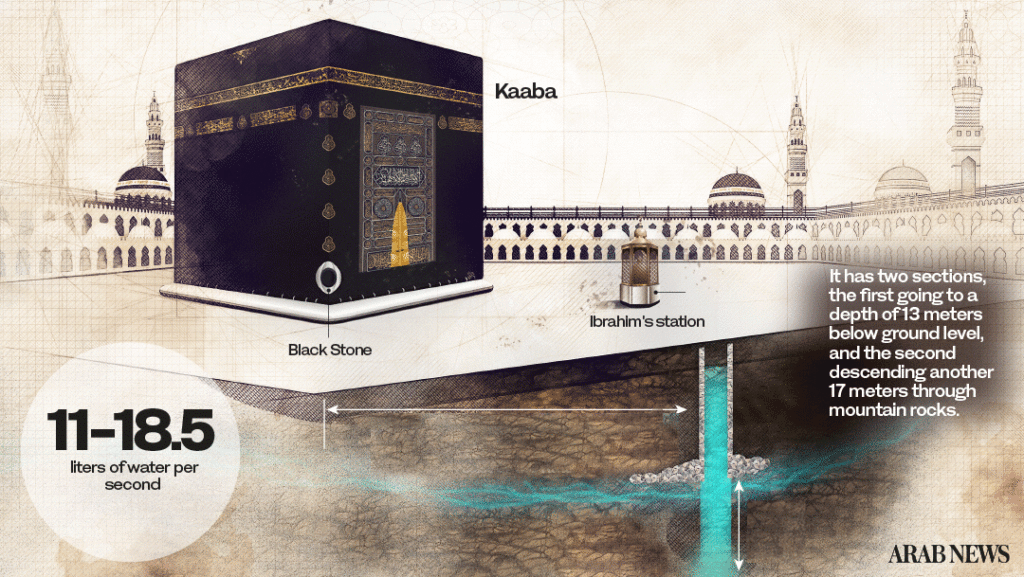
In the past, the well of Zam Zam was accessible to pilgrims. This is what the entrance looks like.
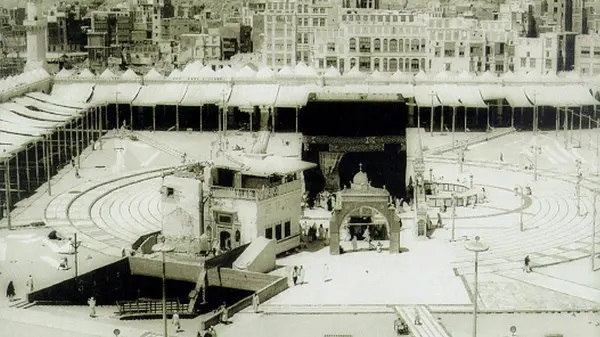
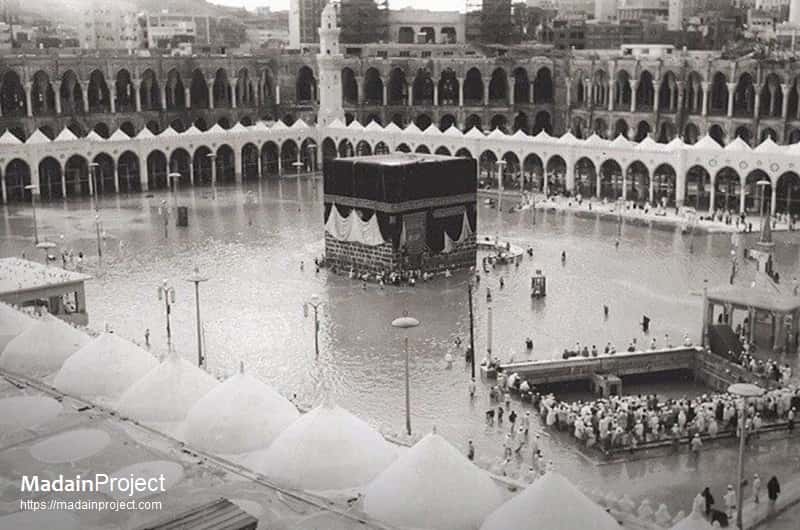
Here’s a summary of it over the years.
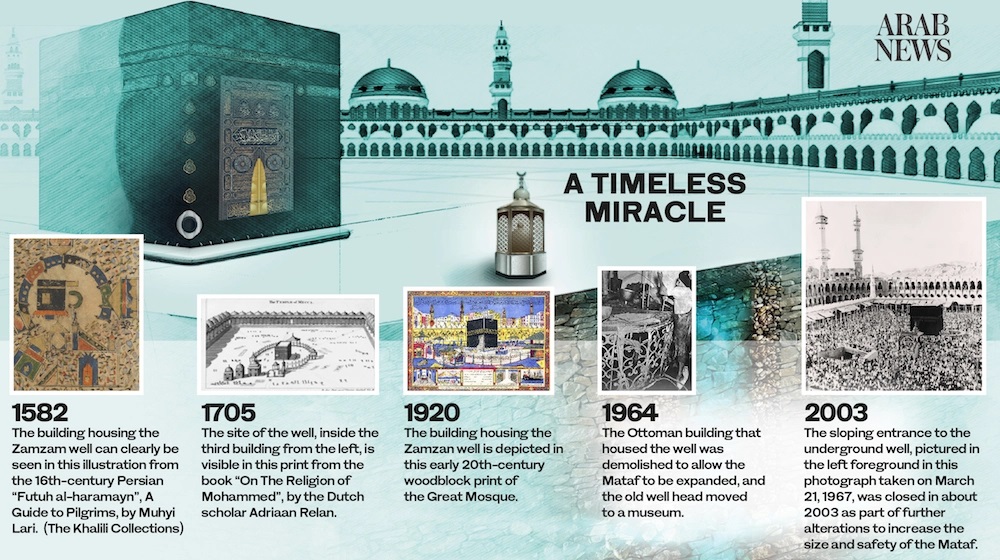
Masjid Al Haram also has containers of Zam Zam all over the place.
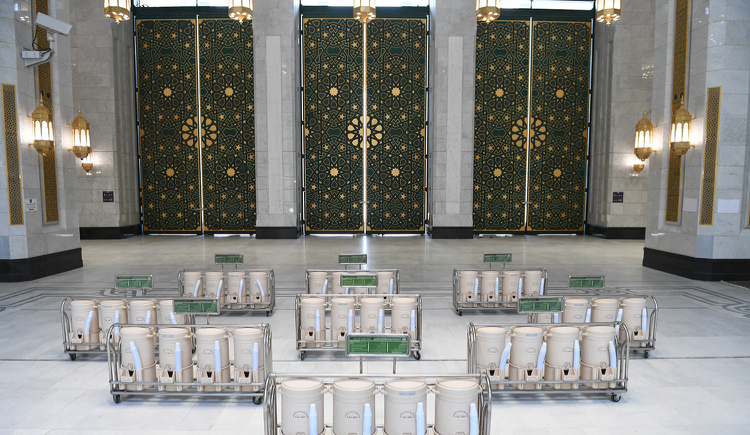
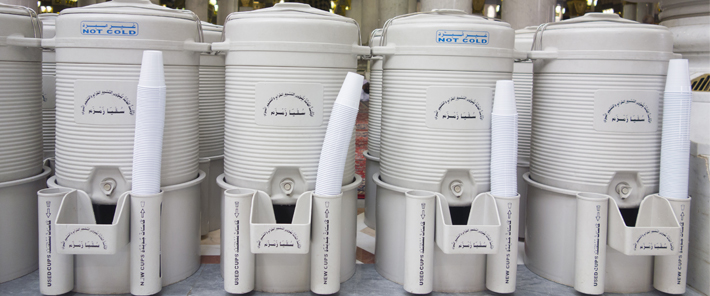
There are taps which dispense Zam Zam as well.

Nowadays, there are robots dispensing bottles of Zam Zam.
There are also containers of Zam Zam in Masjid An-Nabawi in Madinah.
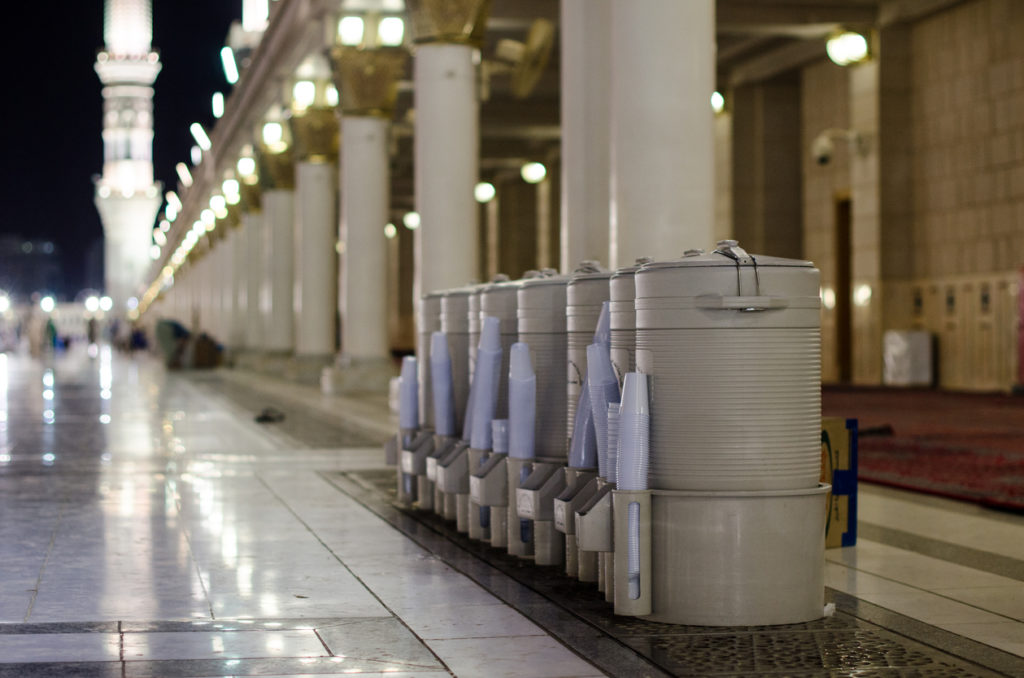
Here are some fascinating facts about Zam Zam.
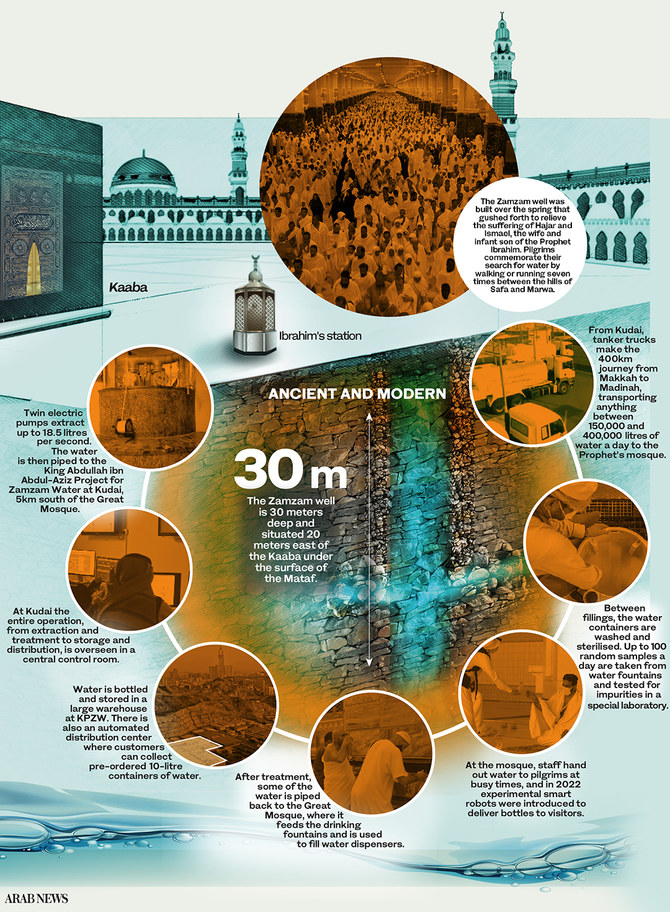

Here’s a short documentary on Zam Zam.
14.Touch stone
One then returns to the stone and touches it.
عن جابر بن عبد الله أنَّ النَّبيَّ صلَّى اللهُ عليه وسَلَّم رَمَلَ ثَلاثةَ أطْوافٍ مِن الحَجَرِ إلى الحَجَرِ، وصلَّى رَكعَتَينِ، ثُمَّ عادَ إلى الحَجَرِ، ثُمَّ ذَهَبَ إلى زَمزَمَ فشَرِبَ منها، وصَبَّ على رَأْسِه، ثُمَّ رَجَعَ فاستَلَمَ الرُّكنَ، ثُمَّ رَجَعَ إلى الصَّفا، فقال: أبْدأُ بما بَدَأَ اللهُ عزَّ وجلَّ به
Jaabir ibn Abdullah (radiallanhu anhuma): The Prophet (sallallahu alaihi wasallam) performed three rounds of Tawaf walking briskly (starting) from the Stone to the Stone (i.e. ending with it). He performed two units of prayer, returned to the Stone, then went to Zam zam and drank from it and poured some over his head. Next, he returned and touched the corner, and then went to As-Safaa and said, “Begin with what Allah began with.” [Musnad Ahmad, Hadeeth No. 15243. Shuaib Al-Arnaut stated that its isnad (chain of narrators) was authentic upon the conditions of Muslim.]
Tawaf is not a difficult act but people do make many errors in them. This short article points out some of them. Here’s another article that talks about this as well.
Now, one proceeds to Safa to do saee.
